Volume Two WINTER, 1960 Number Two
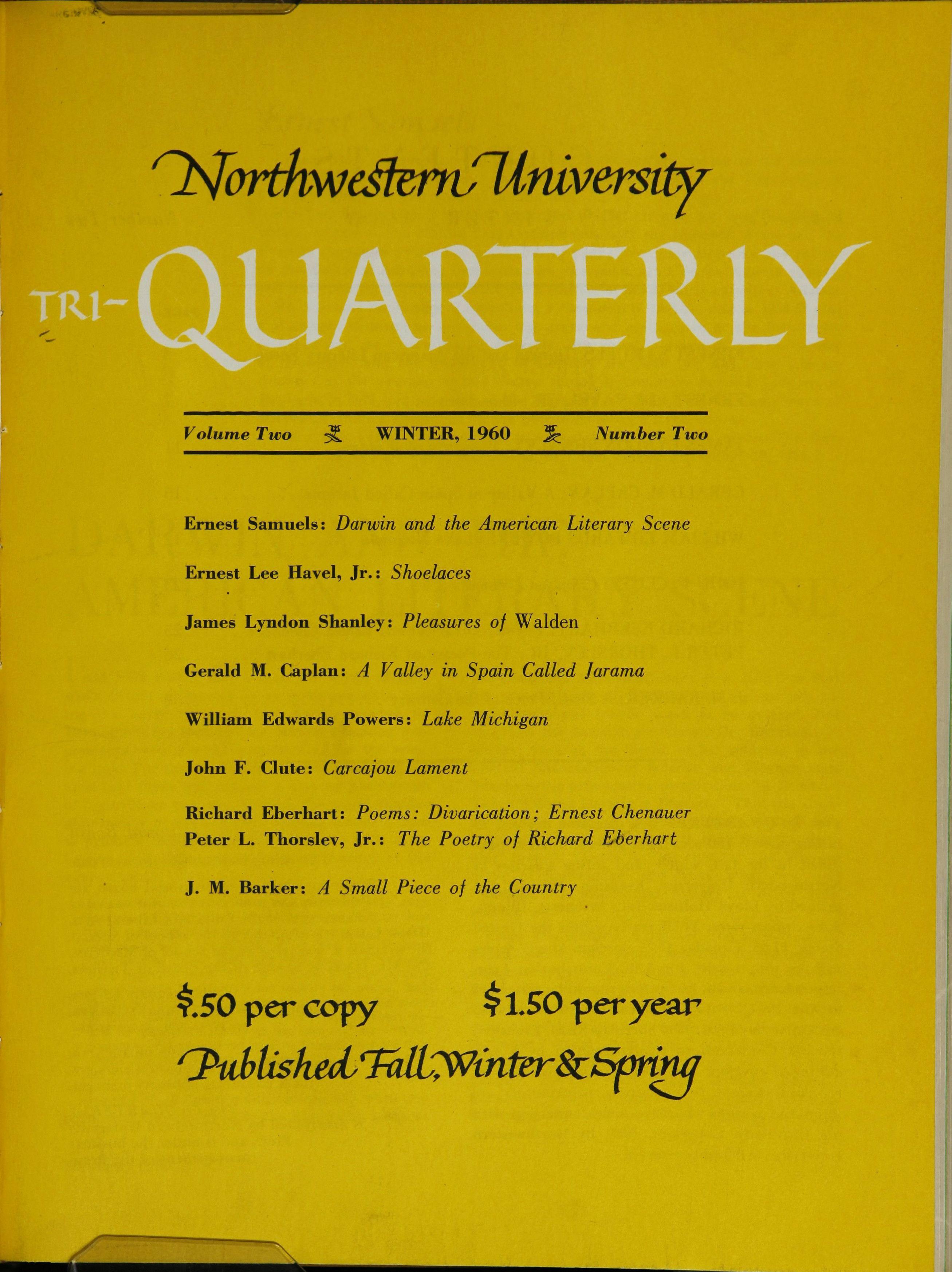
Ernest Samuels: Darwin and the American Literary Scene
Ernest Lee Havel, Jr.: Shoelaces
James Lyndon Shanley: Pleasures 0/ Walden
Gerald M. Caplan: A Valley in Spain Called [arama
William Edwards Powers: Lake Michigan
John F. Clute: Carcajou Lament
Richard Eberhart: Poems: Divarication; Ernest Chenauer
Peter L. Thorslev, Jr.: The Poetry 0/ Richard Eberhart
J. M. Barker: A Small Piece 0/ the Country
$.50 per copy $1.50l'eryear /Published.7iJL:Wint"er&Spril!!!
The Tri-QUARTERLY is a magazine devoted to fiction, poetry, and articles of general interest, published in the fall, winter, and spring quarters at Northwestern University, Evanston, Illinois, and printed by Lloyd Hollister Inc., Wilmette, Illinois.
Subscription rates: $1.50 yearly within the United States; $1.65, Canada; $1.75, foreign. Single copies will be sold locally for $.50. Contributions, correspondence, and subscriptions should be addressed to The Tri-QUARTERLY} care of the Northwestern University Press, 1840 Sheridan Road, Evanston, Illinois. Contributions unaccompanied by a selfaddressed envelope and return postage will not be returned. Except by invitation, contributors are limited to persons who have some connection with the University. Copyright, 1959, by Northwestern University. All rights reserved.
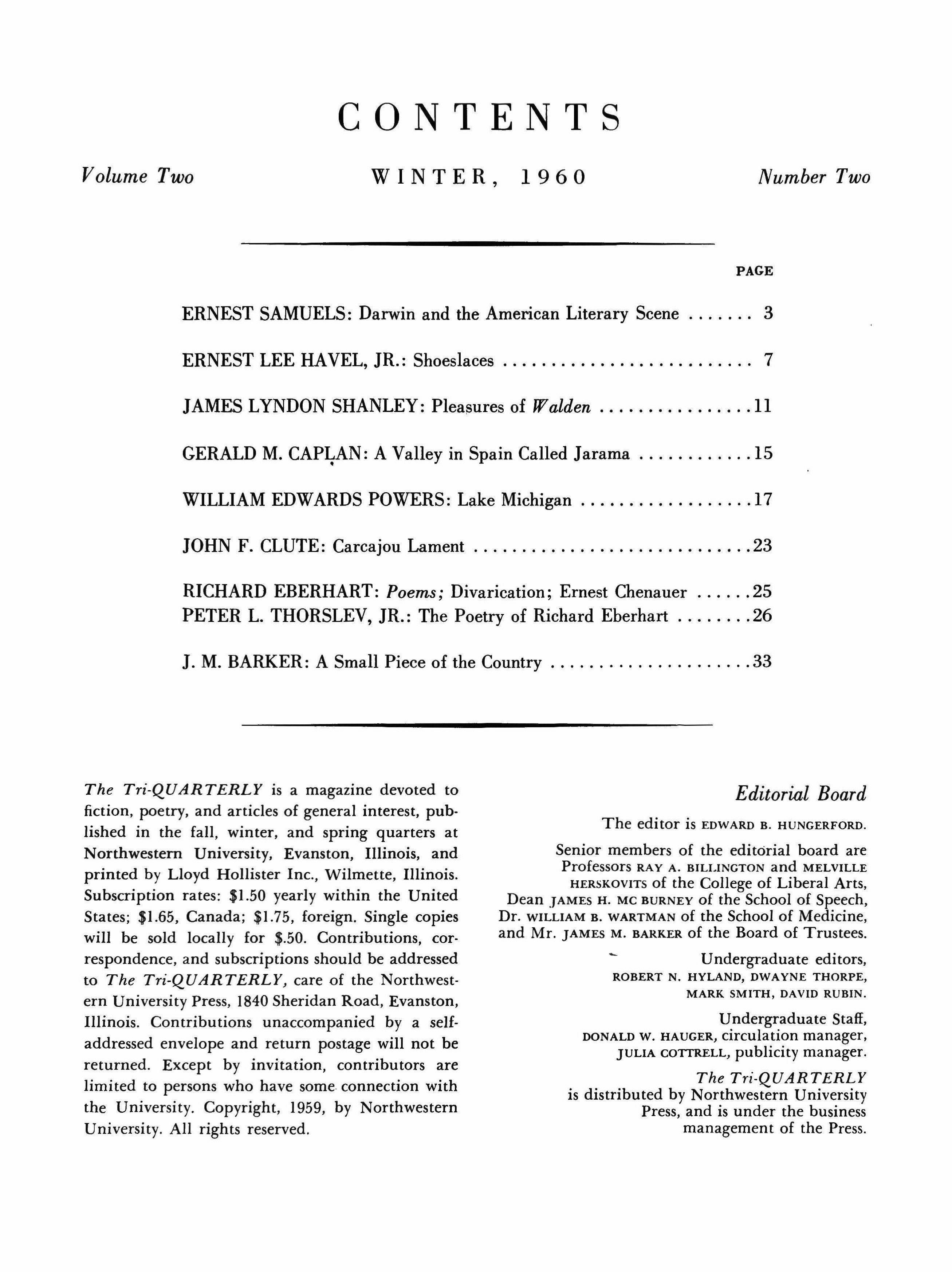
Editorial Board
The editor is EDWARD B. HUNGERFORD. Senior members of the editorial board are Professors RAY A. BILLINGTON and MELVILLE HERSKOVITS of the College of Liberal Arts, Dean JAMES H. Me BURNEY of the School of Speech, Dr. WILLIAM B_ WARTMAN of the School of Medicine, and Mr. JAMES M. BARKER of the Board of Trustees.
Undergraduate editors, ROBERT N. HYLAND, DWAYNE THORPE, MARK SMITH, DAVID RUBIN.
Undergraduate Staff, DONALD W. HAUGER, circulation manager, JULIA COTTRELL, publicity manager.
The Tri-QUARTERLY is distributed by Northwestern University Press, and is under the business management of the Press.
CONTENTS Volume Two WINTER, 1960 Number Two PAGE ERNEST SAMUELS: Darwin and the American Literary Scene 3 ERNEST LEE HAVEL, JR.: Shoeslaces 7 JAMES LYNDON SHANLEY: Pleasures of Walden 11
A Valley in Spain Called Jarama 15 WILLIAM EDWARDS POWERS: Lake Michigan 17
F. CLUTE: Carcajou Lament 23
EBERHART: Poems; Divarication; Ernest Chenauer 25 PETER L. THORSLEV, JR.: The Poetry of Richard Eberhart 26 J. M. BARKER: A Small Piece of the Country 33
GERALD M. CAPJ.,AN:
JOHN
RICHARD
Ernest Samuels
Ernest Samuels, professor of English at Northwestern, ca,me to the University in 1942. Born in Chicago, he received four degrees at fllie University of Chicago, where he first studied for the law.
His The Young Henry Adams appeared in 1947. It was followed in 1958 by Henry Adams - The Middle Years, which won both the Bancroft Prize and the Francis Parkman Prize. For a number of years Professor Samuels has served on the Editorial Advisory Committee for the pubtication of the Adams papers, and he is presently at work on the third voZume of his definitive study of Adams.
Mr. Samuels received a Guggenheim Fellowship in 1955-56, and in 1958-59 was a Fulbright lecturer on American literature and civilization at the University of Liege and the University of Brussels, and guest lecturer at the University of Groningen and the University of Leyden. He gave the Abraham Lincoln Address at the opening of the United States Information Service Library in Brussels in 1959 and was one of the lecturers at Oxford at the Conference of American Studies sponsored by the British-American Association.
The article below was presented in a slightly different form before The Darwin Centennial Festival at the College of Puget Sound, November 18, 1959.
DARWIN AND THE AMERICAN LITERARY SCENE
I AM NOT SURE that I read the whole of Darwin's Origin of Species as an undergraduate during the early twenties. One hardly needed to. Throughout my boyhood Mr. Hearst's Sunday supplements were always busy hunting for the missing link. For those who had trouble following the lurid text there was always a stirring photograph of a gorilla or two. Mr. Dooley, the world famous philosopher of St. Bridget's Parish, where I used to practice the struggle for existence with a defensive shillelagh, summed up the history of the subj ect thus:
I can well remimber how hot ivrybody was agan Darwin on account of what he wrote. Nobody had been very proud of Adam as an ancestor, but still you could put up with 'Im, if ye took into account that he was dalin' with new problems and was the first married man. But it hurted a good manny proud people that but f'r the luck iv the game, they might be [in the zoo] makin' faces through the glass at little boys an' girls. But after a while people begun to take more kindly to the idee an' say: "Well, annyhow, it's more comfortable to feel that we're a slight improvement on a monkey thin such a fallin' off fr'm th' angels."
In spite of all later modifications the vital impulse that Darwin gave to the biological sciences
Winter, 1960
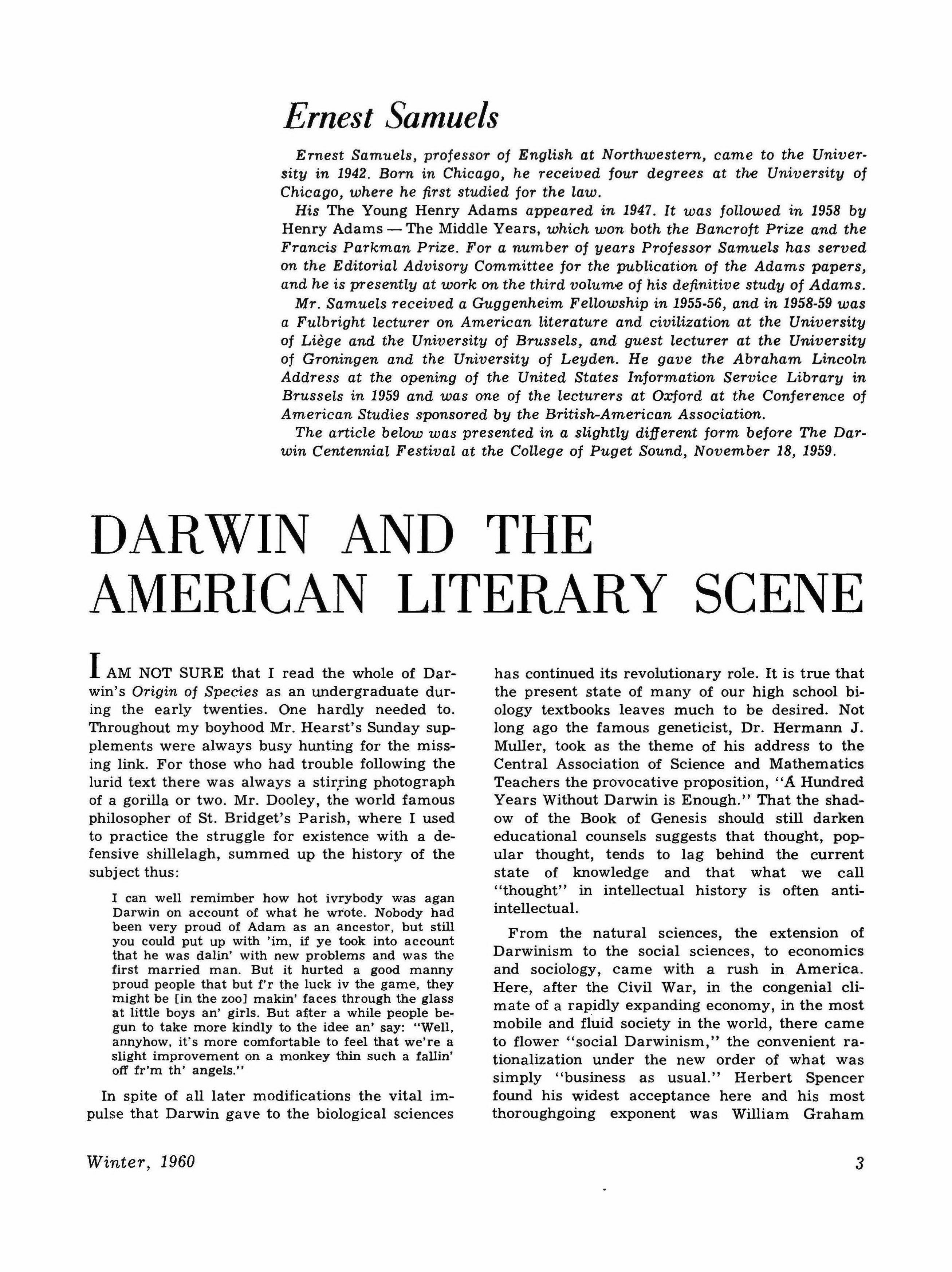
has continued its revolutionary role. It is true that the present state of many of our high school biology textbooks leaves much to be desired. Not long ago the famous geneticist, Dr. Hermann J. Muller, took as the theme of his address to the Central Association of Science and Mathematics Teachers the provocative proposition, "A Hundred Years Without Darwin is Enough." That the shadow of the Book of Genesis should still darken educational counsels suggests that thought, popular thought, tends to lag behind the current state of knowledge and that what we call "thought" in intellectual history is often antiintellectual.
From the natural sciences, the extension of Darwinism to the social sciences, to economics and sociology, came with a rush in America. Here, after the Civil War, in the congenial climate of a rapidly expanding economy, in the most mobile and fluid society in the world, there came to flower "social Darwinism," the convenient rationalization under the new order of what was simply "business as usual." Herbert Spencer found his widest acceptance here and his most thoroughgoing exponent was William Graham
3
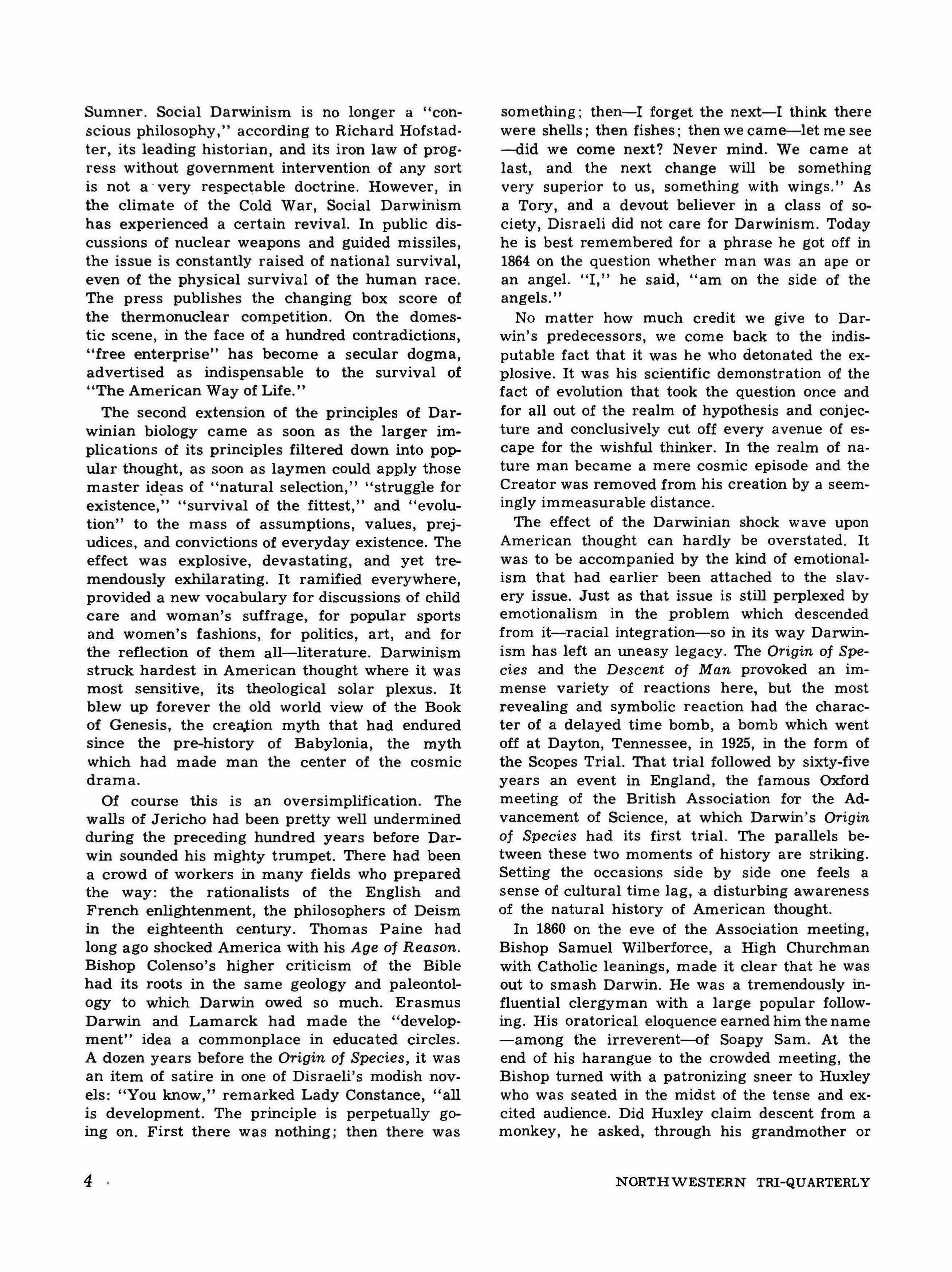
Sumner. Social Darwinism is no longer a "conscious philosophy," according to Richard Hofstadter, its leading historian, and its iron law of progress without government intervention of any sort is not a -very respectable doctrine. However, in the climate of the Cold War, Social Darwinism has experienced a certain revival. In public discussions of nuclear weapons and guided missiles, the issue is constantly raised of national survival, even of the physical survival of the human race. The press publishes the changing box score of the thermonuclear competition. On the domestic scene, in the face of a hundred contradictions, "free enterprise" has become a secular dogma, advertised as indispensable to the survival of "The American Way of Life."
The second extension of the principles of Darwinian biology came as soon as the larger implications of its principles filtered down into popular thought, as soon as laymen could apply those master ideas of "natural selection," "struggle for existence," "survival of the fittest," and "evolution" to the mass of assumptions, values, prejudices, and convictions of everyday existence. The effect was explosive, devastating, and yet tremendously exhilarating. It ramified everywhere, provided a new vocabulary for discussions of child care and woman's suffrage, for popular sports and women's fashions, for politics, art, and for the reflection of them all-literature. Darwinism struck hardest in American thought where it was most sensitive, its theological solar plexus. It blew up forever the old world view of the Book of Genesis, the creation myth that had endured since the pre-history of Babylonia, the myth which had made man the center of the cosmic drama.
Of course this is an oversimplification. The walls of Jericho had been pretty well undermined during the preceding hundred years before Darwin sounded his mighty trumpet. There had been a crowd of workers in many fields who prepared the way: the rationalists of the English and French enlightenment, the philosophers of Deism in the eighteenth century. Thomas Paine had long ago shocked America with his Age of Reason. Bishop Colenso's higher criticism of the Bible had its roots in the same geology and paleontology to which Darwin owed so much. Erasmus Darwin and Lamarck had made the "development" idea a commonplace in educated circles. A dozen years before the Origin of Species, it was an item of satire in one of Disraeli's modish novels: "You know," remarked Lady Constance, "all is development. The principle is perpetually going on. First there was nothing; then there was
something; then-I forget the next-I think there were shells; then fishes; then we came-let me see -did we come next? Never mind. We came at last, and the next change will be something very superior to us, something with wings." As a Tory, and a devout believer in a class of society, Disraeli did not care for Darwinism. Today he is best remembered for a phrase he got off in 1864 on the question whether man was an ape or an angel. "I," he said, "am on the side of the angels.
No matter how much credit we give to Darwin's predecessors, we come back to the indisputable fact that it was he who detonated the explosive. It was his scientific demonstration of the fact of evolution that took the question once and for all out of the realm of hypothesis and conjecture and conclusively cut off every avenue of escape for the wishful thinker. In the realm of nature man became a mere cosmic episode and the Creator was removed from his creation by a seemingly immeasurable distance.
The effect of the Darwinian shock wave upon American thought can hardly be overstated. It was to be accompanied by the kind of emotionalism that had earlier been attached to the slavery issue. Just as that issue is still perplexed by emotionalism in the problem which descended from it-racial integration-so in its way Darwinism has left an uneasy legacy. The Origin of Species and the Descent of Man provoked an immense variety of reactions here, but the most revealing and symbolic reaction had the character of a delayed time bomb, a bomb which went off at Dayton, Tennessee, in 1925, in the form of the Scopes Trial. That trial followed by sixty-five years an event in England, the famous Oxford meeting of the British Association for the Advancement of Science, at which Darwin's Origin of Species had its first trial. The parallels between these two moments of history are striking. Setting the occasions side by side one feels a sense of cultural time lag, a disturbing awareness of the natural history of American thought.
In 1860 on the eve of the Association meeting, Bishop Samuel Wilberforce, a High Churchman with Catholic leanings, made it clear that he was out to smash Darwin. He was a tremendously influential clergyman with a large popular following. His oratorical eloquence earned him the name -among the irreverent-of Soapy Sam. At the end of his harangue to the crowded meeting, the Bishop turned with a patronizing sneer to Huxley who was seated in the midst of the tense and excited audience. Did Huxley claim descent from a monkey, he asked, through his grandmother or
4
NORTHWESTERN TRI-QUARTERLY
his grandfather? We are told that Huxley exclaimed to his neighbor, "The Lord hath delivered him into my hands!" He got to his feet and retorted that if there were an ancestor of whom he might be ashamed it would be a man of great influence and capacity who should descend to such intellectual dishonesty in public discussion. The effect was overwhelming then-and thereafter. Bitter as the controversy was to be in England, Wilberforce's utter rout made a lasting impression. The subsequent history of English thought was to be a reasonable effort to come to terms with Darwinism and to absorb his ideas into the British intellectual tradition without witch hunts or legislative resistance.
Sixty-five belated years after this historic David and Goliath meeting, the Origin of Species stood trial in an American court of law. There was something of a ritual significance in the assembling of the champions in the little Tennessee town. To the simple-minded folk of the Bible Belt and the discontented hinterlands of the South, William Jennings Bryan came to Dayton as the dedicated knight who would save the Bible from the evolutionary heathen, in accordance with the statute law .of the sovereign state of Tennessee. This one-time boy orator of the Platte, the silvertongued leader of the crusade against the Cross of Gold, having lost that crusade had become, after much wandering in the political wilderness, the apostle of anti-evolutionism and a prophet of the Fundamentalist movement. When the state's attorney invited Bryan to join the prosecution, the great Commoner gladly assented: "This is a matter for the nation." The defense summoned the famous Chicago lawyer, Clarence Darrow, who was widely known as an agnostic. Dayton was not the genteel forum of the long-forgotten Oxford meeting. There was a strange circus atmosphere about the proceedings. The crowd of Bryan's admirers was so great the trial was moved to an outdoor lot. Newspaper correspondents, photographers and radio technicians swarmed about the gladiators. A fringe of refreshment stands sprang up under the blazing July sun; evangelists carried on prayer meetings. In accord with southern custom the principals were soon gravely addressing each other as "Colonel." In this incongruous atmosphere, at the center of the world's attention, the issue of the truth of Darwinism was fought out. By a masterful stroke, Darrow decided to call Bryan himself as an expert witness on the Book of Genesis since the judge had ruled out the testimony of scientists. In the broad light of day the duel began. What evidence was there for October 23, 4004 B.C. 9 a.m. as the
date of creation so confidently fixed by' Bishop Ussher? Someone shouted from the audience: "Eastern standard time." Darrow might well have echoed Huxley, the Lord had delivered Bryan into his hands. On and on went the relentless questions of brute fact and Bryan went down in horrid ruin and combustion. However, the jury had no choice but to find Scopes guilty of a technical violation: he had taught evolution contrary to law. The ruling came as an empty anti-climax. Within a few days Bryan died of exhaustion and overeating, intellectually discredited the world over. Nonetheless, he was hailed as a martyr by the Bible Crusaders. Organized on the model of the Ku Klux Klan they swept into sixteen states to press for anti-evolution laws. The movement was stemmed by aroused liberals only with the utmost difficulty. The defeat of the Fundamentalists in North Carolina turned the tide, and the rash of anti-evolution laws were repealed. However the one of Tennessee is still on the books, a magnificent fossil record of the neolithic stratum of American thought. Down in Arkansas occurred the strangest episode of all. The legislature refused several times to adopt an anti-evolution law. The Fundamentalists turned to the initiative and referendum in 1928 and the people of the state of Arkansas voted that Darwin was wrong.
The anti-Darwinism that came to a head in the Scopes trial seemed to coalesce all the little nameless fears of the economically poorer states of the Union, anxiety over the- decline of the old time religion and the fading of white supremacy, the fear of European immigration and of the social dislocation of World War I, the feeling of insecurity of marginal farmers and small storekeepers and a gnawing sense of isolation in an incomprehensible modern world. What a Gallup poll would. reveal today about popular attitudes toward Darwin's theory of evolution would be hard to forecast. In the realm of popular thought there are often strange schizophrenias, double personalities. The success of TV evangelists of the Fundamentalist persuasion suggests perhaps that no intellectual battle is ever wholly won.
As one looks back upon the history of American thought through the perspective of the Scopes trial, one realizes that Darwin had a far more profound and disturbing effect here than anywhere else. Not that one dare minimize the revolution of thought that took place in England and Europe, but the Old World seems to have stood the shock with more fortitude, perhaps with a greater resignation. Darwin's impact upon the United States between 1860 and 1925, what was
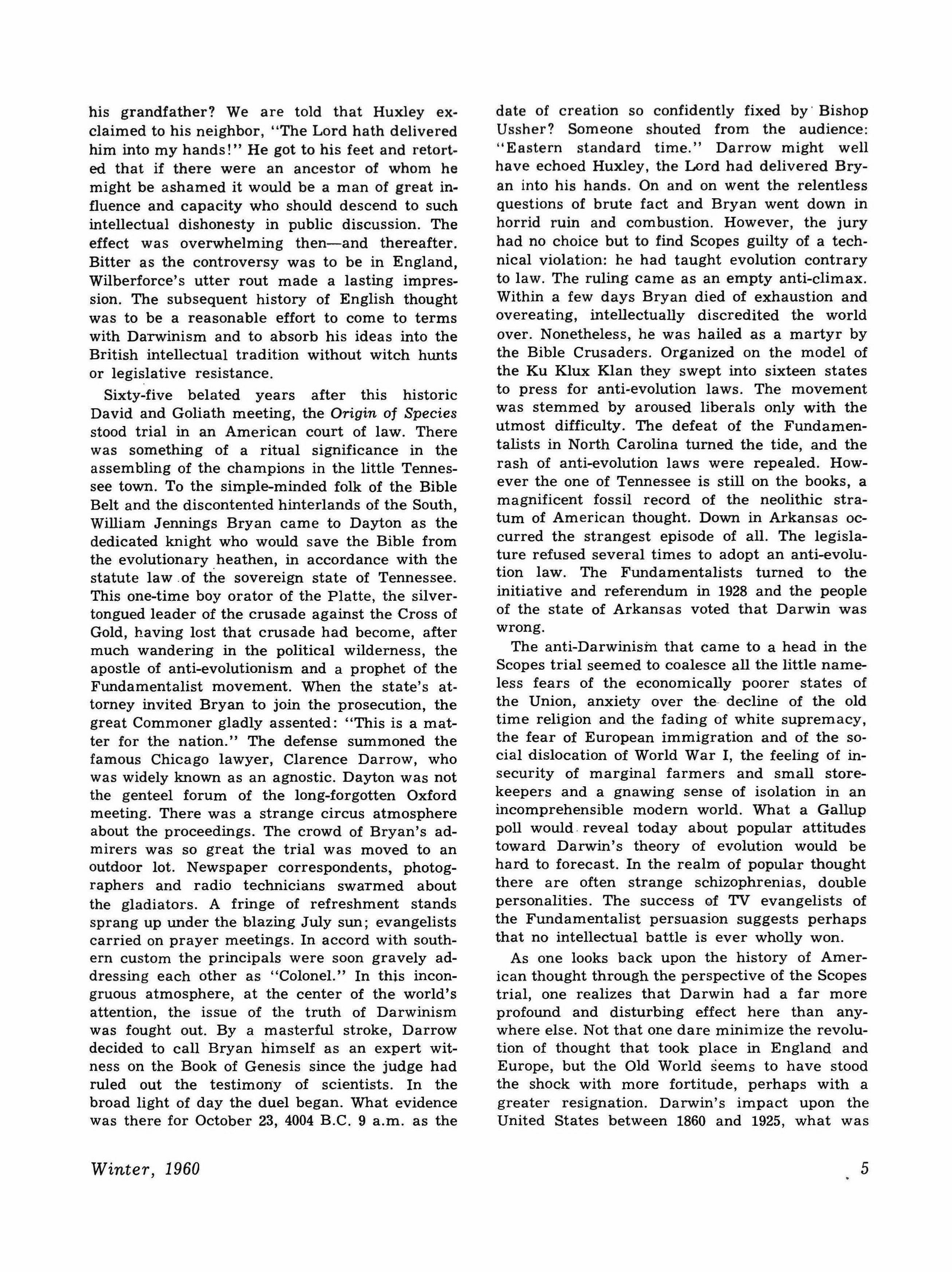
Winter, 1960
5
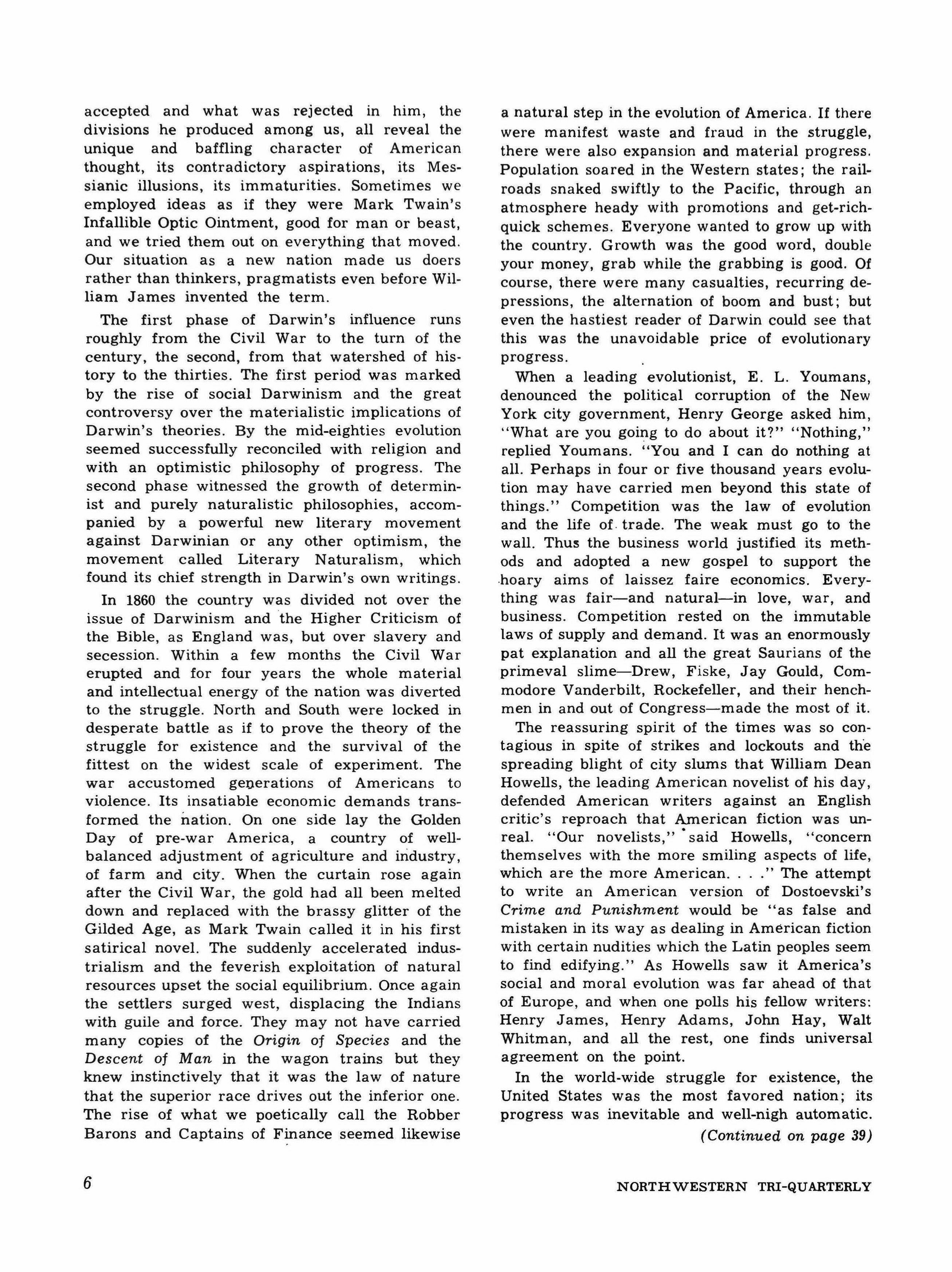
accepted and what was rejected in him, the divisions he produced among us, all reveal the unique and baffling character of American thought, its contradictory aspirations, its Messianic illusions, its immaturities. Sometimes we employed ideas as if they were Mark Twain's Infallible Optic Ointment, good for man or beast, and we tried them out on everything that moved. Our situation as a new nation made us doers rather than thinkers, pragmatists even before William James invented the term.
The first phase of Darwin's influence runs roughly from the Civil War to the turn of the century, the second, from that watershed of history to the thirties. The first period was marked by the rise of social Darwinism and the great controversy over the materialistic implications of Darwin's theories. By the mid-eighties evolution seemed successfully reconciled with religion and with an optimistic philosophy of progress. The second phase witnessed the growth of determinist and purely naturalistic philosophies, accompanied by a powerful new literary movement against Darwinian or any other optimism, the movement called Literary Naturalism, which found its chief strength in Darwin's own writings.
In 1860 the country was divided not over the issue of Darwinism and the Higher Criticism of the Bible, as England was, but over slavery and secession. Within a few months the Civil War erupted and for four years the whole material and intellectual energy of the nation was diverted to the struggle. North and South were locked in desperate battle as if to prove the theory of the struggle for existence and the survival of the fittest on the widest scale of experiment. The war accustomed generations of Americans to violence. Its insatiable economic demands transformed the nation. On one side lay the Golden Day of pre-war America, a country of wellbalanced adjustment of agriculture and industry, of farm and city. When the curtain rose again after the Civil War, the gold had all been melted down and replaced with the brassy glitter of the Gilded Age, as Mark Twain called it in his first satirical novel. The suddenly accelerated industrialism and the feverish exploitation of natural resources upset the social equilibrium. Once again the settlers surged west, displacing the Indians with guile and force. They may not have carried many copies of the Origin Of Species and the Descent of Man in the wagon trains but they knew instinctively that it was the law of nature that the superior race drives out the inferior one. The rise of what we poetically call the Robber Barons and Captains of Finance seemed likewise
a natural step in the evolution of America. If there were manifest waste and fraud in the struggle, there were also expansion and material progress. Population soared in the Western states; the railroads snaked swiftly to the Pacific, through an atmosphere heady with promotions and get-richquick schemes. Everyone wanted to grow up with the country. Growth was the good word, double your money, grab while the grabbing is good. Of course, there were many casualties, recurring depressions, the alternation of boom and bust; but even the hastiest reader of Darwin could see that this was the unavoidable price of evolutionary progress.
When a leading evolutionist, E. L. Youmans, denounced the political corruption of the New York city government, Henry George asked him, "What are you going to do about it?" "Nothing," replied Youmans. "You and I can do nothing at all. Perhaps in four or five thousand years evolution may have carried men beyond this state of things." Competition was the law of evolution and the life of. trade. The weak must go to the wall. Thus the business world justified its methods and adopted a new gospel to support the hoary aims of laissez faire economics. Everything was fair-and natural-in love, war, and business. Competition rested on the immutable laws of supply and demand. It was an enormously pat explanation and all the great Saurians of the primeval slime-Drew, Fiske, Jay Gould, Commodore Vanderbilt, Rockefeller, and their henchmen in and out of Congress-made the most of it.
The reassuring spirit of the times was so contagious in spite of strikes and lockouts and the spreading blight of city slums that William Dean Howells, the leading American novelist of his day, defended American writers against an English critic's reproach that �erican fiction was unreal. "Our novelists," said Howells, "concern themselves with the more smiling aspects of life, which are the more American. ." The attempt to write an American version of Dostoevski's Crime and Punishment would be "as false and mistaken in its way as dealing in American fiction with certain nudities which the Latin peoples seem to find edifying." As Howells saw it America's social and moral evolution was far ahead of that of Europe, and when one polls his fellow writers: Henry James, Henry Adams, John Hay, Walt Whitman, and all the rest, one finds universal agreement on the point.
In the world-wide struggle for existence, the United States was the most favored nation; its progress was inevitable and well-nigh automatic.
(Continued on page 39)
6
NORTHWESTERN TRI-QUARTERLY
Ernest Lee Havel, Ir.
Ernest Lee Havel, Jr. was born in Agenda, Kansas, where he attended school. Before coming to Northwestern he served for two years in the U.S. Navy as seaman and later as midshipman. Having transferred from the School of Journalism, he is now a senior in the College of Liberal Arts, majoring in English Composition.
SHOELACES
DENNIS
LYNCH arose from his writing table, walked out into the small, dirty kitchen, and began to look for something to eat. First, he tried the ancient refrigerator, pulling open the loose-fitting door and bending over so he could see inside. The rusted metal shelves were bare, except for an empty milk bottle and half a cube of butter. He slammed the door hard so it would stay shut and walked over to the rickety cupboard. Flinging open the bottom doors, he looked down at the two shelves covered with yellow newspaper: empty? He bent down and peered into the darkness. Reaching back into one of the dark corners, he brought out a can of stewed eggplant and a large, brown, Irish potato. He looked at the eggplant thoughtfully for a moment, then picked up the potato and carried it over to the sink where he began to rinse it under the water faucet. Turning it over in his hand, he discovered a small, sickly green sprout growing from one of the eyes. With a frown, he snapped it off. Then he shut off the water faucet and walked back to the cupboard. Holding up the potato, its dull brown skin still wet, he began to sprinkle it vigorously with salt. He looked at it apprehensively for a moment, then bit into it. Taking another, bigger bite, he began to crunch it noisily and walked back into the other room.
The other room to Dennis's apartment was about fourteen feet square, with grimy walls; beat-up, brown old furniture; in one corner, an unmade bed; and in another, a writing table flanked by two. overflowing wastebaskets. The one small window looked out into a brick wall. Taking another bite out of his potato, Dennis bent down to the new model portable typewriter on the writing table and clicked up the roller so he could read the last line he had written:
"No," Howerton said with determination, "I don't
Winter, 1960
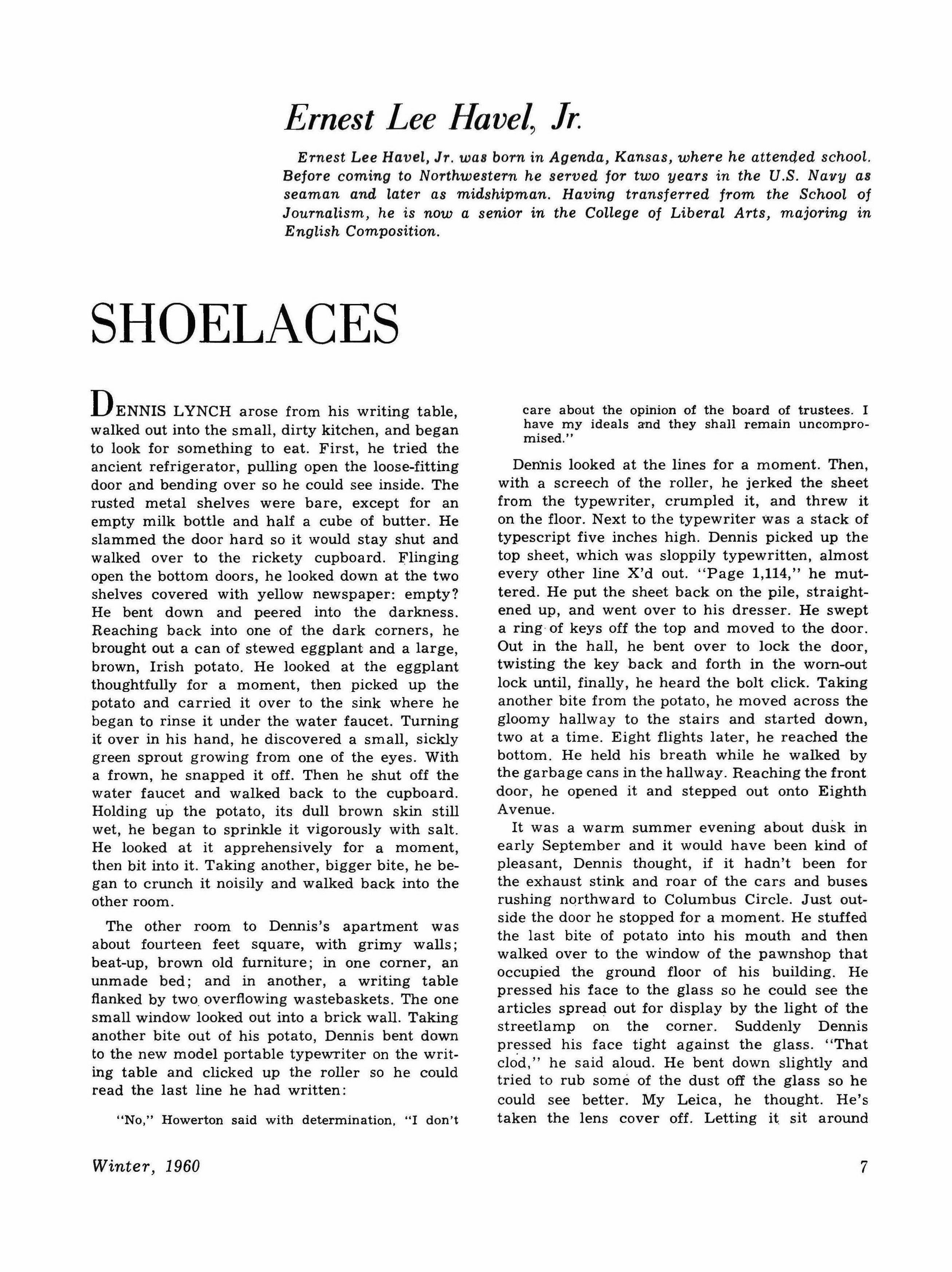
care about the opinion of the board of trustees. I have my ideals and they shall remain uncompromised."
Dennis looked at the lines for a moment. Then, with a screech of the roller, he jerked the sheet from the typewriter, crumpled it, and threw it on the floor. Next to the typewriter was a stack of typescript five inches high. Dennis picked up the top sheet, which was sloppily typewritten, almost every other line X'd out. "Page 1,114," he muttered. He put the sheet back on the pile, straightened up, and went over to his dresser. He swept a ring of keys off the top and moved to the door. Out in the hall, he bent over to lock the door, twisting the key back and forth in the worn-out lock until, finally, he heard the bolt click. Taking another bite from the potato, he moved across the gloomy hallway to the stairs and started down, two at a time. Eight flights later, he reached the bottom. He held his breath while he walked by the garbage cans in the hallway. Reaching the front door, he opened it and stepped out onto Eighth Avenue.
It was a warm summer evening about dusk in early September and it would have been kind of pleasant, Dennis thought, if it hadn't been for the exhaust stink and roar of the cars and buses rushing northward to Columbus Circle. Just outside the door he stopped for a moment. He stuffed the last bite of potato into his mouth and then walked over to the window of the pawnshop that occupied the ground floor of his building. He pressed his face to the glass so he could see the articles spread out for display by the light of the streetlamp on the corner. Suddenly Dennis pressed his face tight against the glass. "That clod," he said aloud. He bent down slightly and tried to rub some of the dust off the glass so he could see better. My Leica, he thought. He's taken the lens cover off. Letting it sit around
7
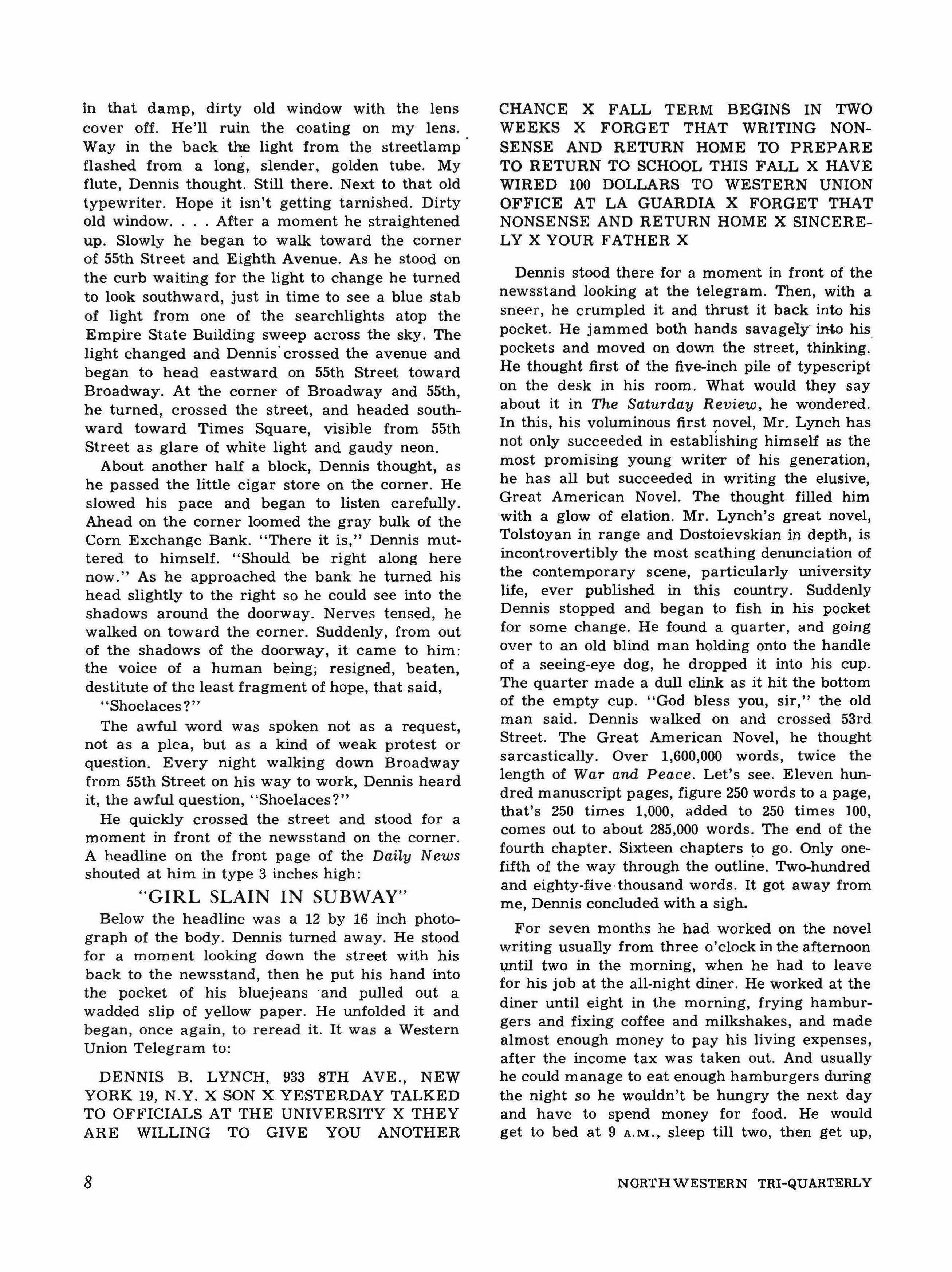
in that damp, dirty old window with the lens cover off. He'll ruin the coating on my lens. Way in the back the light from the streetlamp' flashed from a long, slender, golden tube. My flute, Dennis thought. Still there. Next to that old typewriter. Hope it isn't getting tarnished. Dirty old window After a moment he straightened up. Slowly he began to walk toward the corner of 55th Street and Eighth Avenue. As he stood on the curb waiting for the light to change he turned to look southward, just in time to see a blue stab of light from one of the searchlights atop the Empire State Building sweep across the sky. The light changed and Dennis' crossed the avenue and began to head eastward on 55th Street toward Broadway. At the corner of Broadway and 55th, he turned, crossed the street, and headed southward toward Times Square, visible from 55th Street as glare of white light and gaudy neon.
About another half a block, Dennis thought, as he passed the little cigar store on the corner. He slowed his pace and began to listen carefully. Ahead on the corner loomed the gray bulk of the Corn Exchange Bank. "There it is," Dennis muttered to himself. "Should be right along here now." As he approached the bank he turned his head slightly to the right so he could see into the shadows around the doorway. Nerves tensed, he walked on toward the corner. Suddenly, from out of the shadows of the doorway, it came to him: the voice of a human being; resigned, beaten, destitute of the least fragment of hope, that said, "Shoelaces ?"
The awful word was spoken not as a request, not as a plea, but as a kind of weak protest or question. Every night walking down Broadway from 55th Street on his way to work, Dennis heard it, the awful question, "Shoelaces?"
He quickly crossed the street and stood for a moment in front of the newsstand on the corner. A headline on the front page of the Daily News shouted at him in type 3 inches high: "GIRL SLAIN IN SUBWAY"
Below the headline was a 12 by 16 inch photograph of the body. Dennis turned away. He stood for a moment looking down the street with his back to the newsstand, then he put his hand into the pocket of his bluejeans 'and pulled out a wadded slip of yellow paper. He unfolded it and began, once again, to reread it. It was a Western Union Telegram to:
DENNIS B. LYNCH, 933 8TH AVE., NEW YORK 19, N.Y. X SON X YESTERDAY TALKED TO OFFICIALS AT THE UNIVERSITY X THEY ARE WILLING TO GIVE YOU ANOTHER
CHANCE X FALL TERM BEGINS IN TWO WEEKS X FORGET THAT WRITING NONSENSE AND RETURN HOME TO PREPARE TO RETURN TO SCHOOL THIS FALL X HAVE WIRED 100 DOLLARS TO WESTERN UNION OFFICE AT LA GUARDIA X FORGET THAT NONSENSE AND RETURN HOME X SINCERELY X YOUR FATHER X
Dennis stood there for a moment in front of the newsstand looking at the telegram. Then, with a sneer, he crumpled it and thrust it back into his pocket. He jammed both hands savagely- into his pockets and moved on down the street, thinking. He thought first of the five-inch pile of typescript on the desk in his room. What would they say about it in The Saturday Review, he wondered. In this, his voluminous first novel, Mr. Lynch has not only succeeded in establishing himself as the most promising young writer of his generation, he has all but succeeded in writing the elusive, Great American Novel. The thought filled him with a glow of elation. Mr. Lynch's great novel, Tolstoyan in range and Dostoievskian in depth, is incontrovertibly the most scathing denunciation of the contemporary scene, particularly university hfe, ever published in this country. Suddenly Dennis stopped and began to fish in his pocket for some change. He found a quarter, and going over to an old blind man holding onto the handle of a seeing-eye dog, he dropped it into his cup. The quarter made a dull clink as it hit the bottom of the empty cup. "God bless you, sir," the old man said. Dennis walked on and crossed 53rd Street. The Great American Novel, he thought sarcastically. Over 1,600,000 words, twice the length of War and Peace. Let's see. Eleven hundred manuscript pages, figure 250 words to a page, that's 250 times 1,000, added to 250 times 100, comes out to about 285,000 words. The end of the fourth chapter. Sixteen chapters to go. Only onefifth of the way through the outli�e. Two-hundred and eighty-five thousand words. It got away from me, Dennis concluded with a sigh.
For seven months he had worked on the novel writing usually from three o'clock in the afternoon until two in the morning, when he had to leave for his job at the all-night diner. He worked at the diner until eight in the morning, frying hamburgers and fixing coffee and milkshakes, and made almost enough money to pay his living expenses, after the income tax was taken out. And usually he could manage to eat enough hamburgers during the night so he wouldn't be hungry the next day and have to spend money for food. He would get to bed at 9 A.M., sleep till two, then get up,
8
NORTHWESTERN TRI-QUARTERLY
drink a cup of instant coffee and sit down to his typewriter. Once a week, usually on a Saturday night, he would go downtown to a movie, always one of the cheaper ones on 42nd Street.
Dennis couldn't exactly say how it had happened. He'd had the whole thing planned very carefully before he started, an outline that covered ten pages. The novel would have an involved plot, lots of characters and plenty of description and dialogue, especially dialogue. Still, it shouldn't have run over 250,000 words. It should have been finished a month ago. It must have been the dialogue, he thought. Dennis liked dialogue because it gave him a chance to throw in all his observations and theories on literature, philosophy, life, and human destiny. That's the really meaty part of the book, he thought. But once Dennis got started writing dialogue, it inevitably ran away with him. He remembered, specifically, the conversation between Howerton, the hero of his novel, and Dr. Henley, Chairman of the English Department. That one had taken up most of the third chapter, around three-hundred typewritten pages.
Dennis crossed 52nd Street, waiting a moment on the corner for the light. It was beginning to get a little crowded on the 52nd Street block so he moved to the outside of the sidewalk where he'd have more room. The electric sign around the Times building was flashing out a news flash, and though ten blocks away, he could almost read it. "Dulles Warns Dulles warns No, he. couldn't read it. Dennis was beginning to get discouraged again. It was a familiar feeling, in fact, during the last two months he had fought a never ending battle against discouragement. He had started the novel with great enthusiasm, but as' the pages began to pile up and the months to go by and he began to realize how little he was accomplishing of what he planned to do, he began to wonder if he had the ability to be a writer.
The novel, Dennis wondered, what to do with it? Go ahead and finish it? In another three years he should have it almost No. It would be too long. Never find a publisher for it. Make it shorter? Cut it down? He had gone over the four chapters carefully, trying to see if there were some parts that could be cut out. No, he had decided. As soon cut off an arm or a leg. Essential, every word of it. He could just end the thing, he thought, at the end of the fifth chapter where Howerton gets fired by the board of trustees for once having been a communist. A Hemingway ending. Have him walking away into the rain or something. But what about the other characters? Couldn't just leave them all hanging in mid-air. It would be chaos. No, Dennis concluded, it's a
Winter, 196Q
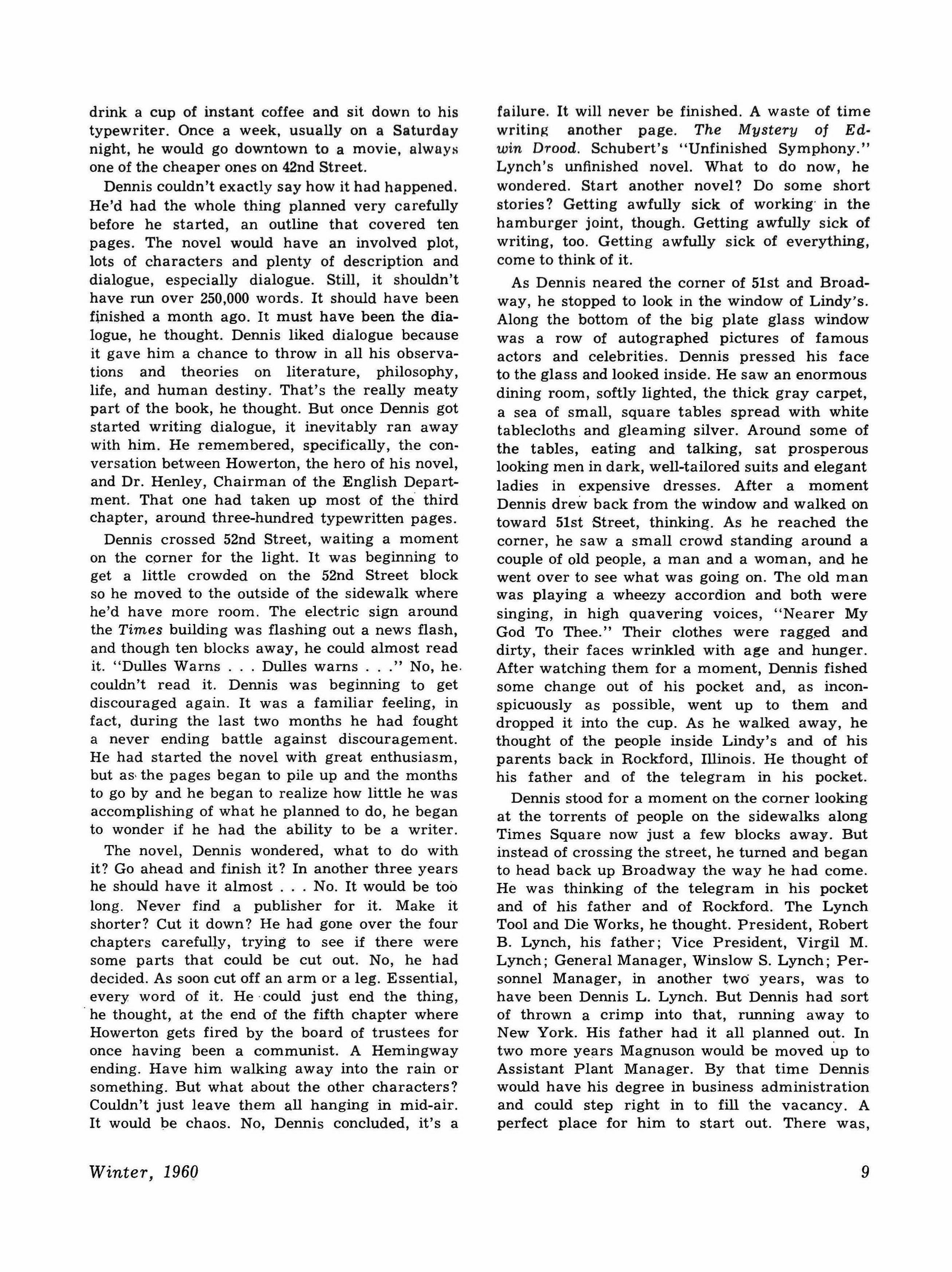
failure. It will never be finished. A waste of time writing another page. The Mystery of Ed· win Drood. Schubert's "Unfinished Symphony." Lynch's unfinished novel. What to do now, he wondered. Start another novel? Do some short stories? Getting awfully sick of working' in the hamburger joint, though. Getting awfully sick of writing, too. Getting awfully sick of everything, come to think of it.
As Dennis neared the corner of 51st and Broadway, he stopped to look in the window of Lindy's. Along the bottom of the big plate glass window was a row of autographed pictures of famous actors and celebrities. Dennis pressed his face to the glass and looked inside. He saw an enormous dining room, softly lighted, the thick gray carpet, a sea of small, square tables spread with white tablecloths and gleaming silver. Around some of the tables, eating and talking, sat prosperous looking men in dark, well-tailored suits and elegant ladies in expensive dresses. After a moment Dennis drew back from the window and walked on toward 51st Street, thinking. As he reached the corner, he saw a small crowd standing around a couple of old people, a man and a woman, and he went over to see what was going on. The old man was playing a wheezy accordion and both were singing, in high quavering voices, "Nearer My God To Thee." Their clothes were ragged and dirty, their faces wrinkled with age and hunger. After watching them for a moment, Dennis fished some change out of his pocket and, as inconspicuously as possible, went up to them and dropped it into the cup. As he walked away, he thought of the people inside Lindy's and of his parents back in Rockford, Illinois. He thought of his father and of the telegram in his pocket.
Dennis stood for a moment on the corner looking at the torrents of people on the sidewalks along Times Square now just a few blocks away. But instead of crossing the street, he turned and began to head back up Broadway the way he had come. He was thinking of the telegram in his pocket and of his father and of Rockford. The Lynch Tool and Die Works, he thought. President, Robert B. Lynch, his father; Vice President, Virgil M. Lynch; General Manager, Winslow S. Lynch; Personnel Manager, in another two years, was to have been Dennis L. Lynch. But Dennis had sort of thrown a crimp into that, running away to New York. His father had it all planned out. In two more years Magnuson would be moved up to Assistant Plant Manager. By that time Dennis would have his degree in business administration and could step right in to fill the vacancy. A perfect place for him to start out. There was,
9
however, one thing his father hadn't counted on: Dennis hated business. He hated it because he considered it petty, and trivial and boring. At the university, enrolled 'in Business School, he had found his business courses intolerable. But he had liked his liberal arts courses very much, particularly the ones in literature and philosophy. His first two years. he had scraped by, getting A's and B's in liberal arts and C's and D's in business. Then, the second quarter of his junior year, he transferred to the School of Liberal Arts as an English Literature major. When his father found out what Dennis had done without even consulting him, he was furious. Bawling Dennis out over the telephone, he told him that if he was not back in Business School by Spring Quarter, he wouldn't get another cent from him. Dennis hung up the telephone. Then he got his bags out from under his bed and stuffed them full, emptying his closet and his dresser. Drawing all the money out of his checking account, he left that evening for New York, without saying a word to anyone. Three months later he wrote his father a letter, telling him that he was now self-supporting, that he was not coming back' to Rockford, that he wanted nothing more from him but to be left alone. In New York he began work on the novel he had been planning to write ever since his freshman year in college. For seven months he worked on
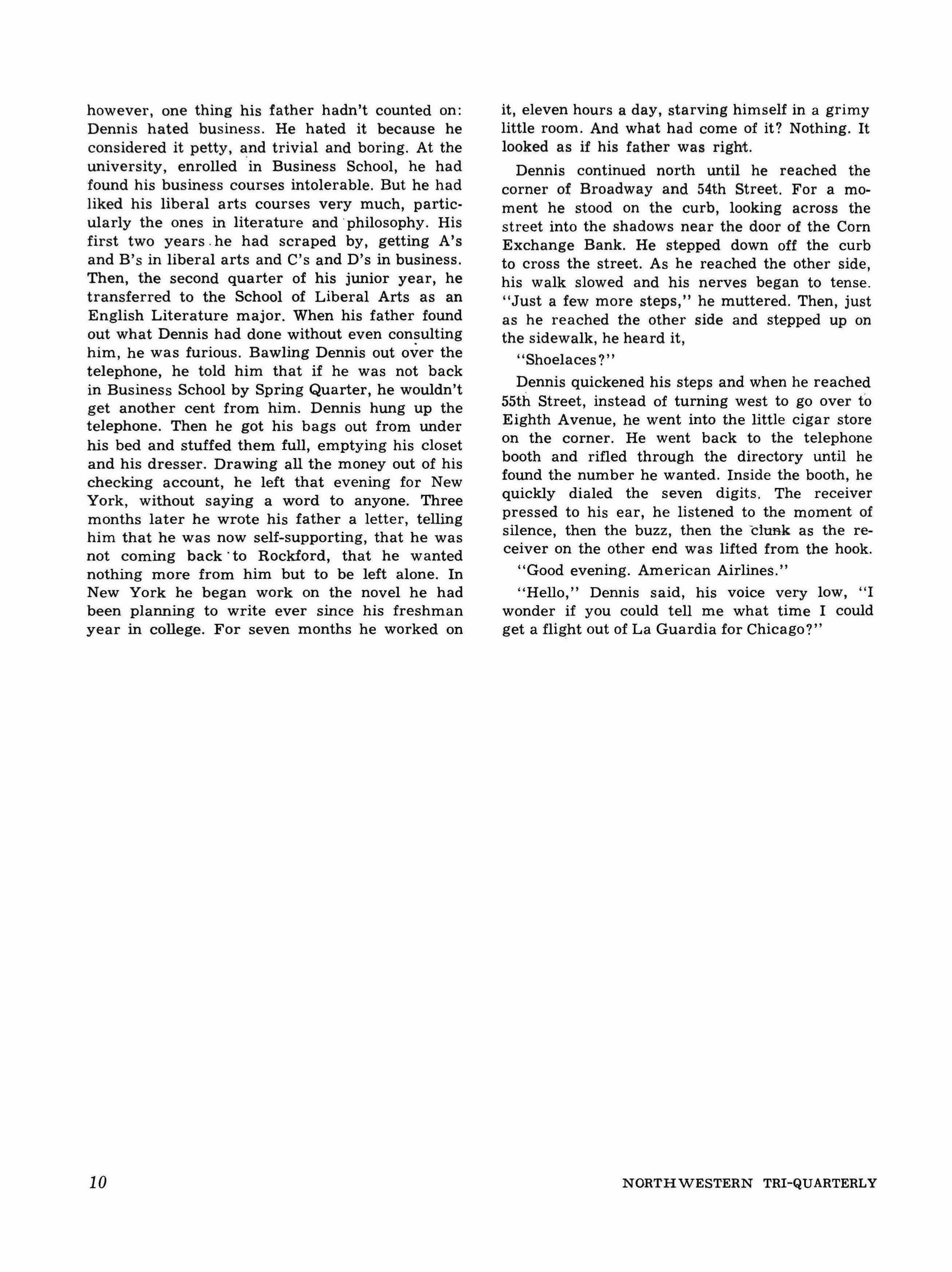
it, eleven hours a day, starving himself in a grimy little room. And what had come of it? Nothing. It looked as if his father was right.
Dennis continued north until he reached the corner of Broadway and 54th Street. For a moment he stood on the curb, looking across the street into the shadows near the door of the Corn Exchange Bank. He stepped down off the curb to cross the street. As he reached the other side, his walk slowed and his nerves began to tense. "Just a few more steps," he muttered. Then, just as he reached the other side and stepped up on the sidewalk, he heard it,
"Shoelaces?
Dennis quickened his steps and when he reached 55th Street, instead of turning west to go over to Eighth Avenue, he went into the little cigar store on the corner. He went back to the telephone booth and rifled through the directory until he found the number he wanted. Inside the booth, he quickly dialed the seven digits. The receiver pressed to his ear, he listened to the moment of silence, then the buzz, then the Clunk as the receiver on the other end was lifted from the hook.
"Good evening. American Airlines."
"Hello," Dennis said, his voice very low, "I wonder if you could tell me what time I could get a flight out of La Guardia for Chicago?"
10
NORTH WESTERN TRI-QUARTERLY
J
Lyndon Shanley
James Lyndon Shanley is Associate Dean of the CoHege of Liberal Arts and a professor in the Department of English. He came to Northwestern in 1936 after receiving both his undergraduate and graduate degrees at Princeton. "Pleasures of Walden" wa·s originally delivered as an address last summer to the Thoreau Society, of which Dean Shanley was president tor the year 195859. The Society has requested reprints of THE TRI-QuARTERLY'S printing tor distribution to its members.
Mr. Shanley's The Making 0; Walden, based on a study oi the Thoreau manuscripts at the Huntington Library, appeared in 1957. He has published also in the field of Spenserian and Chaucerian scholarship.
PLEASURES. OF WALDEN
T HE REASONS PEOPLE OFFER for reading Walden are various, sometimes wonderful, as is this comment of fifty years ago:
Thoreau's writings are peculiarly suited to all classes; they are alike instructive and entertaining: to the poorer class, because he proves conclusively what comfort, and even happiness, may be enjoyed with the minimum of effort and expense; and to the opulent they satisfy an important desideratum in the form of the most wholesome entertainment.
I think there are better reasons. Today I would speak of the happiness, the humor, and the wisdom I find in Walden. And one other virtue that I would mention first-the excellence of its writing.
IWalden is a delight to read. I mention this first because the quality, if not the absolute existence, of its other pleasures depends upon it. The happiness, the humor, and the wisdom of WaLden would not be what they are in other words, in another order. Thoreau was a craftsman and artist with complete mastery of his medium. Everywhere in Walden the writing is clear and forceful, and superbly suited to the rich variety of Thoreau's purposes.
The proof of this, of course, is only in the reading. I shall quote a number of passages from Walden later; here let me offer two very varied pieces in evidence: the scathingly scornful remarks on the teamster and the lyrical elegy on the former inhabitants of the woods. (The reader must hear Walden, at least in the mind's ear.
Winter, 1960

Thoreau read much of it to audiences in Concord, Boston, Salem, a'Ild other New England tOWJlS, and he wrote the greater part of it as if he were "speaking" to his readers. The rhythms of his sentences and his tones of voice are essential to the meaning and effect of his words):
Talk: of a divinity in man! Look at the teamster on the highway, wending to market by day or night; does any divinity stir within him? His highest duty to fodder and water his horses! What is his destiny to him compared with the shipping interests? Does not he drive for Squire Make-a-stir? How godlike, how immortal, is he? See how he cowers and speaks, how vaguely all the day he fears, not being immortal nor divine, but the slave and prisoner pf his own opinion of himself, a fame won by his own deeds.
And the elegy for the long-dead inhabitants of the woods:
Still grows the vivacious lilac a generation after the door and lintel a-nd the sill are gone, unfolding its sweet-scented flowers each spring, to be plucked by the musing traveller; planted and tended once by children's hands, in front-yard plots, - standing by wall-sides in retired pastures, and giving place to new-rising forests; - the last of that stirp, sole survivor of that family. Little did the dusky children think that the puny slip with its two eyes only, which they stuck in the ground in the shadow of the houses and daily watered, would root itself so, and outlive them, and house itself in the rear that shaded it, and grown man's garden and orchard, and tell their story faintly to the lone wanderer a halfcentury after they had grown up and died, - blossoming as fair, and smelling as sweet, as in that first spring. I mark -its still tender, civil, cheerful, lilac colors.
Walden is, in turns, satiric, reflective, narra-
11
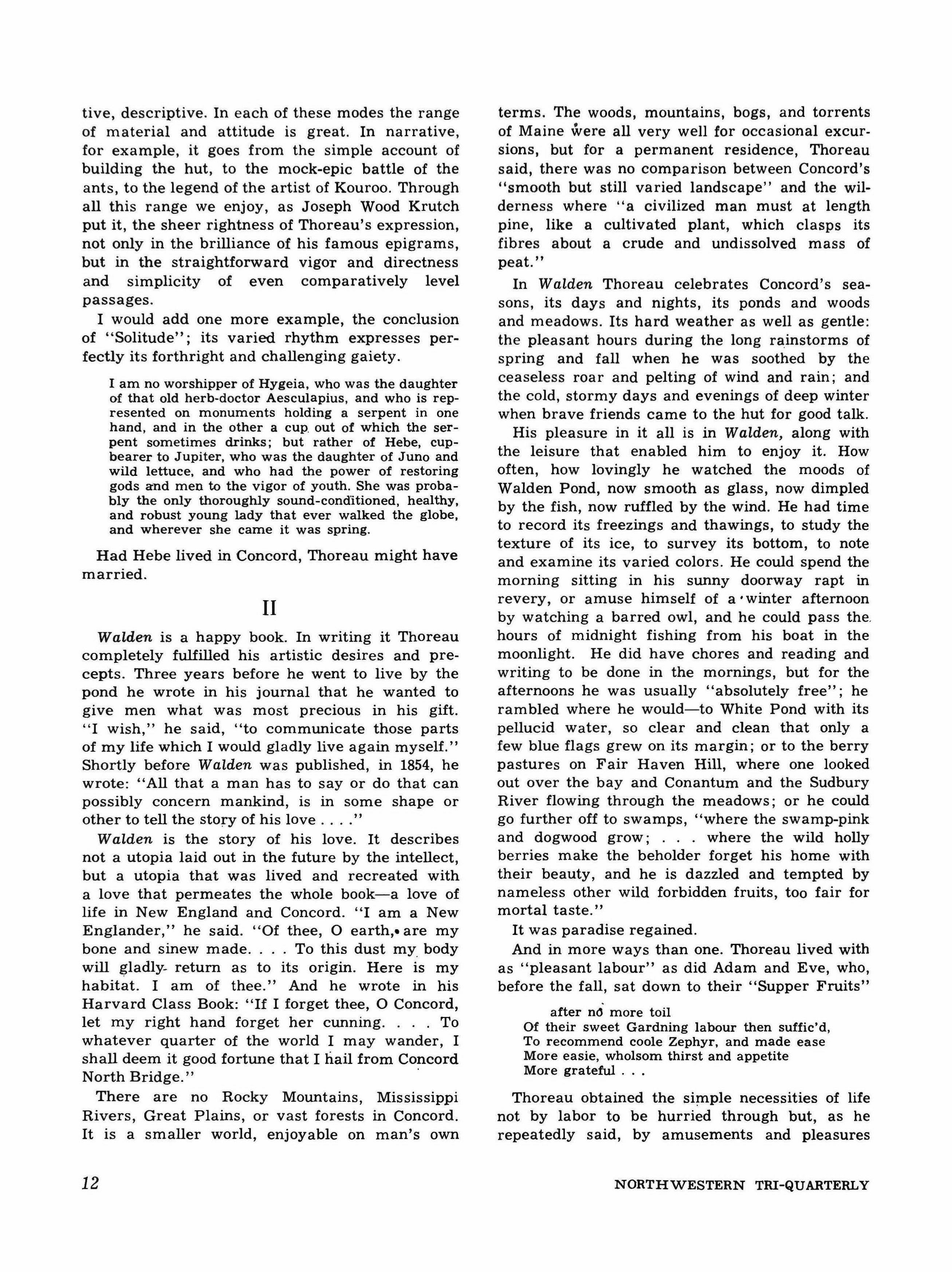
tive, descriptive. In each of these modes the range of material and attitude is great. In narrative, for example, it goes from the simple account of building the hut, to the mock-epic battle of the ants, to the legend of the artist of Kouroo. Through all this range we enjoy, as Joseph Wood Krutch put it, the sheer rightness of Thoreau's expression, not only in the brilliance of his famous epigrams, but in the straightforward vigor and directness and simplicity of even comparatively level passages.
I would add one more example, the conclusion of "Solitude"; its varied rhythm expresses perfectly its forthright and challenging gaiety.
I am no worshipper of Hygeia, who was the daughter of that old herb-doctor Aesculapius, and who is represented on monuments holding a serpent in one hand, and in the other a cup. out of which the serpent sometimes drinks; but rather of Hebe, cupbearer to Jupiter, who was the daughter of Juno and wild lettuce, and who had the power of restoring gods a:nd men to the vigor of youth. She was probably the only thoroughly sound-conditioned, healthy, and robust young lady that ever walked the globe, and wherever she came it was spring.
Had Hebe lived in Concord, Thoreau might have married.
II
WaLden is a happy book. In writing it Thoreau completely fulfilled his artistic desires and precepts. Three years before he went to live by the pond he wrote in his journal that he wanted to give men what was most precious in his gift. "I wish," he said, "to communicate those parts of my life which I would gladly live again myself." Shortly before WaLden was published, in 1854, he wrote: "All that a man has to say or do that can possibly concern mankind, is in some shape or other to tell the story of his love
Walden is the story of his love. It describes not a utopia laid out in the future by the intellect, but a utopia that was lived and recreated with a love that permeates the whole book-a love of life in New England and Concord. "I am a New Englander," he said. "Of thee, 0 earth,s are my bone and sinew made To this dust my' body will gladly- return as to its origin. Here is my habitat. I am of thee." And he wrote in his Harvard Class Book: "If I forget thee, 0 Concord, let my right hand forget her cunning. To whatever quarter of the world I may wander, I shall deem it good fortune that I hail from Concord North Bridge."
There are no Rocky Mountains, Mississippi Rivers, Great Plains, or vast forests in Concord. It is a smaller world, enjoyable on man's own
terms. The woods, mountains, bogs, and torrents of Maine were all very well for occasional excursions, but for a permanent residence, Thoreau said, there was no comparison between Concord's "smooth but still varied landscape" and the wilderness where "a civilized man must at length pine, like a cultivated plant, which clasps its fibres about a crude and undissolved mass of peat.
In Walden Thoreau celebrates Concord's seasons, its days and nights, its ponds and woods and meadows. Its hard weather as well as gentle: the pleasant hours during the long rainstorms of spring and fall when he was soothed by the ceaseless roar and pelting of wind and rain; and the cold, stormy days and evenings of deep winter when brave friends came to the hut for good talk.
His pleasure in it all is in Walden, along with the leisure that enabled him to enjoy it. How often, how lovingly he watched the moods of Walden Pond, now smooth as glass, now dimpled by the fish, now ruffled by the wind. He had time to record its freezings and thawings, to study the texture of its ice, to survey its bottom, to note and examine its varied colors. He could spend the morning sitting in his sunny doorway rapt in revery, or amuse himself of a' winter afternoon by watching a barred owl, and he could pass the. hours of midnight fishing from his boat in the moonlight. He did have chores and reading and writing to be done in the mornings, but for the afternoons he was usually "absolutely free"; he rambled where he would-to White Pond with its pellucid water, so clear and clean that only a few blue flags grew on its margin; or to the berry pastures on Fair Haven Hill, where one looked out over the bay and Conantum and the Sudbury River flowing through the meadows; or he could go further off to swamps, "where the swamp-pink and dogwood grow; where the wild holly berries make the beholder forget his home with their beauty, and he is dazzled and tempted by nameless other wild forbidden fruits, too fair for mortal taste."
It was paradise regained.
And in more ways than one. Thoreau lived with as "pleasant labour" as did Adam and Eve, who, before the fall, sat down to their "Supper Fruits" after nO more toil
Of their sweet Gardning labour then suffic'd, To recommend coole Zephyr, and made ease
More easie, wholsom thirst and appetite
More grateful
Thoreau obtained the simple necessities of life not by labor to be hurried through but, as he repeatedly said, by amusements and pleasures
12
NORTHWESTERN TRI-QUARTERL
Y
to be lingered over. He made no haste as he went about cutting and shaping the timbers of his house, for "they were pleasant spring days" in which he worked on the pine-covered hillside overlooking the thawing pond. Scrubbing his floor with sand and water from Walden was "a pleasant pastime." "It was no little amusement" to bake and turn his small loaves of rye and Indian meal over his fire. And he "amused himself one winter day" by sliding fire-wood half a mile across the frozen pond "skating behind with one end of a fifteen-foot log on [his] shoulder, and the other on the ice." This is a life of infinite leisure and peace.
During his first summer he often hoed beans from five o'clock in the morning to noon. The labor was all his own-he had no "improved instruments of husbandry," much less any hired help-and he thus came to know his beans well, and the weeds too. As he hoed, he had time to attend to everything, the gala-day guns and bands in the distant village, the curious passers-by on the Walden road, the brown thrasher that sang to him, and the hawks that sported overhead. "It was," he wrote, "a rare amusement which continued too long might have become a dissipation."
He had much the same pleasure as Robinson Crusoe had in his competence and self-reliance. And there is another similarity: the simplicity and solitude of their lives. Thoreau did away with most of the clutter in everyday life: no curtains to be cleaned; no mat to be shaken out; no ornaments to be dusted; no yard to be kept up; no fence, no gate to be painted and repaired. No wonder he had time. Moreover, he lived "as far off as many a region viewed nightly by astronomers," in a "withdrawn, but forever new and unprofaned, part of the universe" with "some square miles of unfrequented forest" for his privacy. As a result, his time was his own. The red squirrels chattered impudently under his house, and the loon laughed at him, but, unlike the unctuous reformers and insistent men of business, his brute neighbors never invaded his privacy impertinently.
But Thoreau would not be a hermit; in privacy as in other good things he knew that "a little more than enough is by much too much." He enjoyed "the best of two worlds," the fruits of society and civilization as well as those of solitude and wildness. His retirement was voluntary and calculated and was as much richer than Crusoe's as voluntary poverty is than poverty merely endured. He might write of "no gate-no front-yard-and no path to the civilized world," but the railroad right-of-way skirted the pond, and he was happy
Winter, 1960
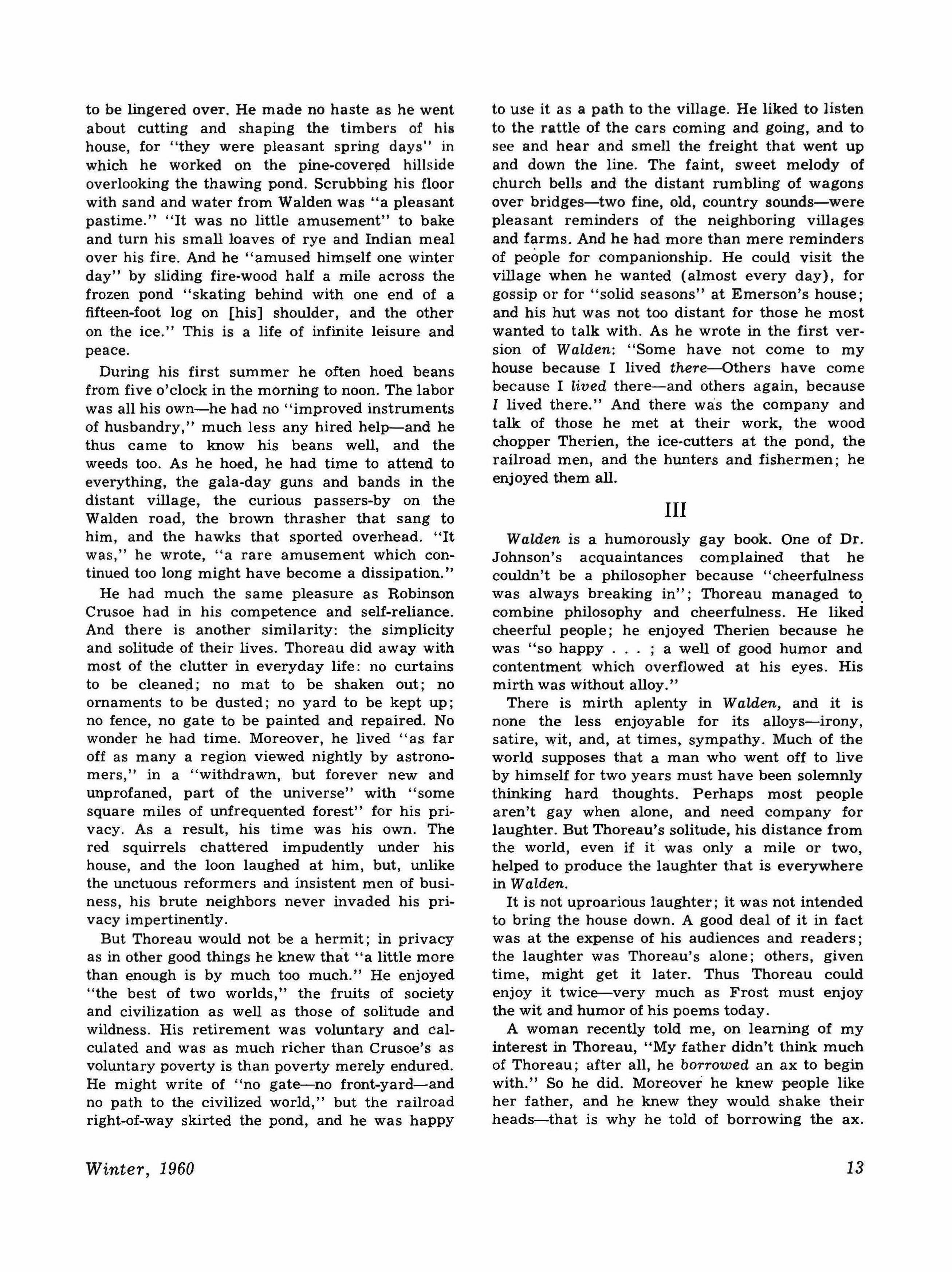
to use it as a path to the village. He liked to listen to the rattle of the cars coming and going, and to see and hear and smell the freight that went up and down the line. The faint, sweet melody of church bells and the distant rumbling of wagons over bridges-two fine, old, country sounds-were pleasant reminders of the neighboring villages and farms. And he had more than mere reminders of people for companionship. He could visit the village when he wanted (almost every day), for gossip or for "solid seasons" at Emerson's house; and his hut was not too distant for those he most wanted to talk with. As he wrote in the first version of Walden: "Some have not come to my house because I lived there-Others have come because I lived there-and others again, because I lived there." And there was the company and talk of those he met at their work, the wood chopper Therien, the ice-cutters at the pond, the railroad men, and the hunters and fishermen; he enjoyed them all.
III
Walden is a humorously gay book. One of Dr. Johnson's acquaintances complained that he couldn't be a philosopher because "cheerfulness was always breaking in"; Thoreau managed to. combine philosophy and cheerfulness. He liked cheerful people; he enjoyed Therien because he was "so happy ; a well of good humor and contentment which overflowed at his eyes. His mirth was without alloy."
There is mirth aplenty in Walden, and it is none the less enjoyable for its alloys-irony, satire, wit, and, at times, sympathy. Much of the world supposes that a man who went off to live by himself for two years must have been solemnly thinking hard thoughts. Perhaps most people aren't gay when alone, and need company for laughter. But Thoreau's solitude, his distance from the world, even if it was only a mile or two, helped to produce the laughter that is everywhere in Walden.
It is not uproarious laughter; it was not intended to bring the house down. A good deal of it in fact was at the expense of his audiences and readers; the laughter was Thoreau's alone; others, given time, might get it later. Thus Thoreau could enjoy it twice-very much as Frost must enjoy the wit and humor of his poems today.
A woman recently told me, on learning of my interest in Thoreau, "My father didn't think much of Thoreau; after all, he borrowed an ax to begin with." So he did. Moreover he knew people like her father, and he knew they would shake their heads-that is why he told of borrowing the ax.
13
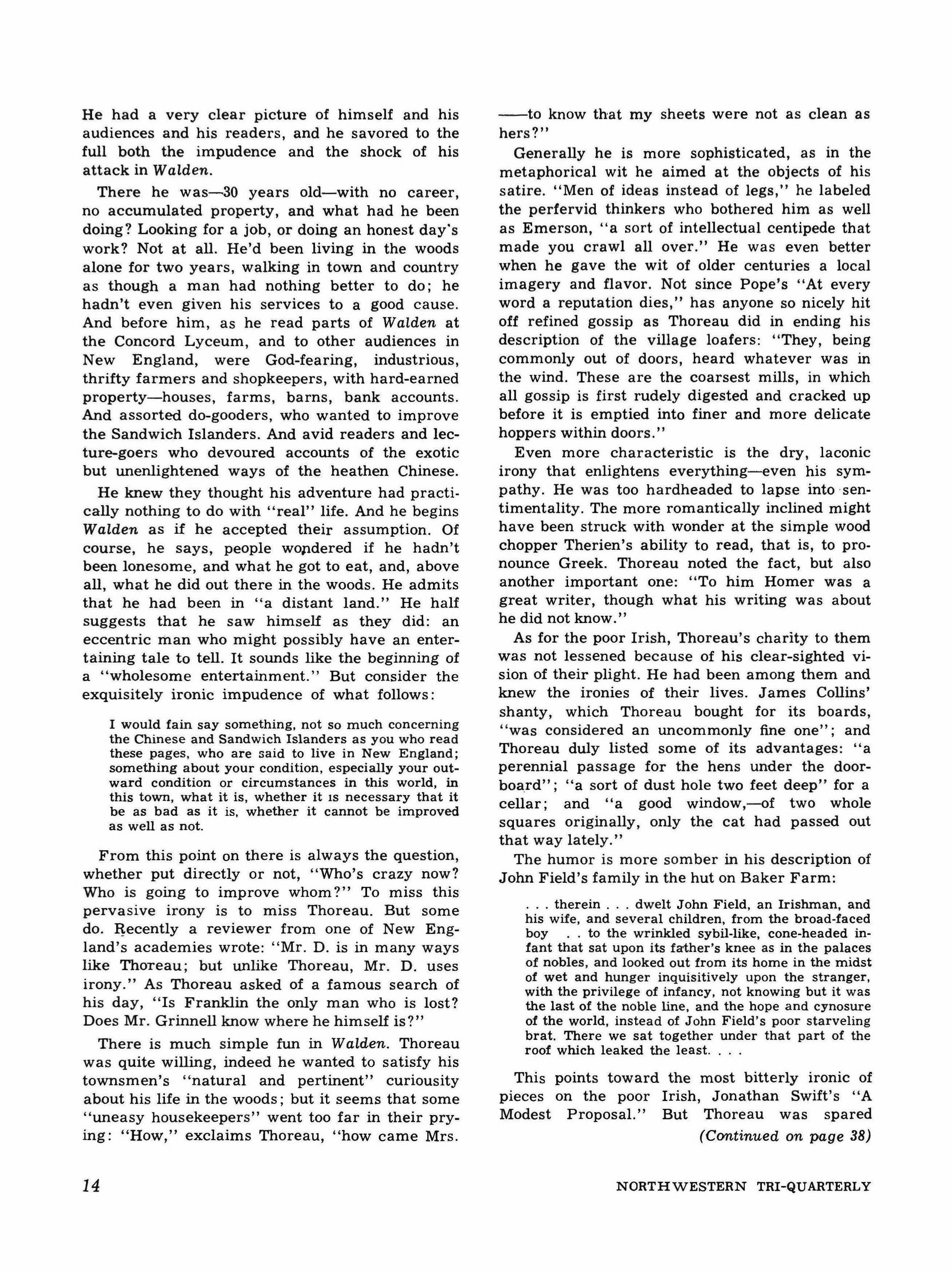
He had a very clear picture of himself and his audiences and his readers, and he savored to the full both the impudence and the shock of his attack in Walden.
There he was-30 years old-with no career, no accumulated property, and what had he been doing? Looking for a job, or doing an honest day's work? Not at all. He'd been living in the woods alone for two years, walking in town and country as though a man had nothing better to do; he hadn't even given his services to a good cause. And before him, as he read parts of Walden at the Concord Lyceum, and to other audiences in New England, were God-fearing, industrious, thrifty farmers and shopkeepers, with hard-earned property-houses, farms, barns, bank accounts. And assorted do-gooders, who wanted to improve the Sandwich Islanders. And avid readers and leeture-goers who devoured accounts of the exotic but unenlightened ways of the heathen Chinese. He knew they thought his adventure had practically nothing to do with "real" life. And he begins Walden as if he accepted their assumption. Of course, he says, people wondered if he hadn't been lonesome, and what he got to eat, and, above all, what he did out there in the woods. He admits that he had been in "a distant land." He half suggests that he saw himself as they did: an eccentric man who might possibly have an entertaining tale to tell. It sounds like the beginning of a "wholesome entertainment." But consider the exquisitely ironic impudence of what follows:
I would fain say something, not so much concerning the Chinese and Sandwich Islanders as you who read these pages, who are said to live in New England; something about your condition, especially your outward condition or circumstances in this world, in this town, what it is, whether it IS necessary that it be as bad as it is, whether it cannot be improved as well as not.
From this point on there is always the question, whether put directly or not, "Who's crazy now? Who is going to improve whom?" To miss this pervasive irony is to miss Thoreau. But some do. Recently a reviewer from one of New England's academies wrote: "Mr. D. is in many ways like Thoreau; but unlike Thoreau, Mr. D. uses irony." As Thoreau asked of a famous search of his day, "Is Franklin the only man who is lost? Does Mr. Grinnell know where he himself is?"
There is much simple fun in Walden. Thoreau was quite willing, indeed he wanted to satisfy his townsmen's "natural and pertinent" curiousity about his life in the woods; but it seems that some "uneasy housekeepers" went too far in their prying: "How," exclaims Thoreau, "how came Mrs.
--to know that my sheets were not as clean as hers?"
Generally he is more sophisticated, as in the metaphorical wit he aimed at the objects of his satire. "Men of ideas instead of legs," he labeled the perfervid thinkers who bothered him as well as Emerson, "a sort of intellectual centipede that made you crawl all over." He was even better when he gave the wit of older centuries a local imagery and flavor. Not since Pope's "At every word a reputation dies," has anyone so nicely hit off refined gossip as Thoreau did in ending his description of the village loafers: "They, being commonly out of doors, heard whatever was in the wind. These are the coarsest mills, in which all gossip is first rudely digested and cracked up before it is emptied into finer and more delicate hoppers within doors."
Even more characteristic is the dry, laconic irony that enlightens everything-even his sympathy. He was too hardheaded to lapse into sentimentality. The more romantically inclined might have been struck with wonder at the simple wood chopper Therien's ability to read, that is, to pronounce Greek. Thoreau noted the fact, but also another important one: "To him Homer was a great writer, though what his writing was about he did not know."
As for the poor Irish, Thoreau's charity to them was not lessened because of his clear-sighted vision of their plight. He had been among them and knew the ironies of their lives. James Collins' shanty, which Thoreau bought for its boards, "was considered an uncommonly fine one"; and Thoreau duly listed some of its advantages: "a perennial passage for the hens under the doorboard"; "a sort of dust hole two feet deep" for a cellar; and "a good window,-of two whole squares originally, only the cat had passed out that way lately."
The humor is more somber in his description of John Field's family in the hut on Baker Farm: therein dwelt John Field, an Irishman, and his wife, and several children, from the broad-faced boy to the wrinkled sybil-like, cone-headed infant that sat upon its fCl'ther's knee as in the palaces of nobles, and looked out from its home in the midst of wet and hunger inquisitively upon the stranger, with the privilege of infancy, not knowing but it was the last of the noble line, and the hope and cynosure of the world, instead of John Field's poor starveling brat. There we sat together under that part of the roof which leaked the least.
This points toward the most bitterly ironic of pieces on the poor Irish, Jonathan Swift's "A Modest Proposal." But Thoreau was spared (Continued on page 38)
14
NORTHWESTERN TRI-QUARTERLY
Gerald M Caplan
Gerald M. Caplan (L.A. '59) is assistant in the Political Science Department, where he is working for his master's degree. His special interests are the primitive societies and the political systems of Latin America. He has traoeled in Mexico, Cuba, and Spain.
In the story below, the two Americans are former members of the Lincoln Battalion, a division of the International Brigade that fought on the Loyalist side during the Spanish Civil War and that suffered an overwhelming defeat at Jarama. The title is based on a song of the Lincoln Battalion.
A VALLEY IN SPAIN CALLED JARAMA
IT WAS THE FIRST TIME the two men had visited Spain in over twenty years and they were tense and excited at the thought of seeing oncefamiliar places again. They did little talking as they drove through the countryside, so intent were they on breathing in old memories. Once the driver remarked, "Spain has changed so little in all these years," and his companion nodded; otherwise they sat in silence, smoking cigarettes and drinking good wine from the bota.
They were driving through the olive country, and the small trees, not yet bearing fruit, lined the hills for miles on every side. There were no workers in the field at this time of day; the sun was overhead and it was too hot to be outdoors.
In the back seat of the car was a priest. The Americans had met him at a petrol station on the gravel road from Murcia to. Jarama. He had hurried over to them, his heavy black robe dragging across the loose pebbles, his head covered by a hat with an enormous brim that shielded him from the bright heat of the sun. He was an old priest with a dark round face that was well-wrinkled. He asked them for a ride to Santa Clara, a little town sixty kilometers away, where he was to visit relatives.
"It is very hot," the driver remarked, wiping his forehead dry with his shirt sleeve.
"It is always hot like this in August," the priest replied. He smiled pleasantly. "The South of Spain is a hot place."
"Yes, but it is very peaceful and quiet," the driver continued in good Spanish. "That is what we like about Spain; it is so peaceful and quiet."
Winter, 1960
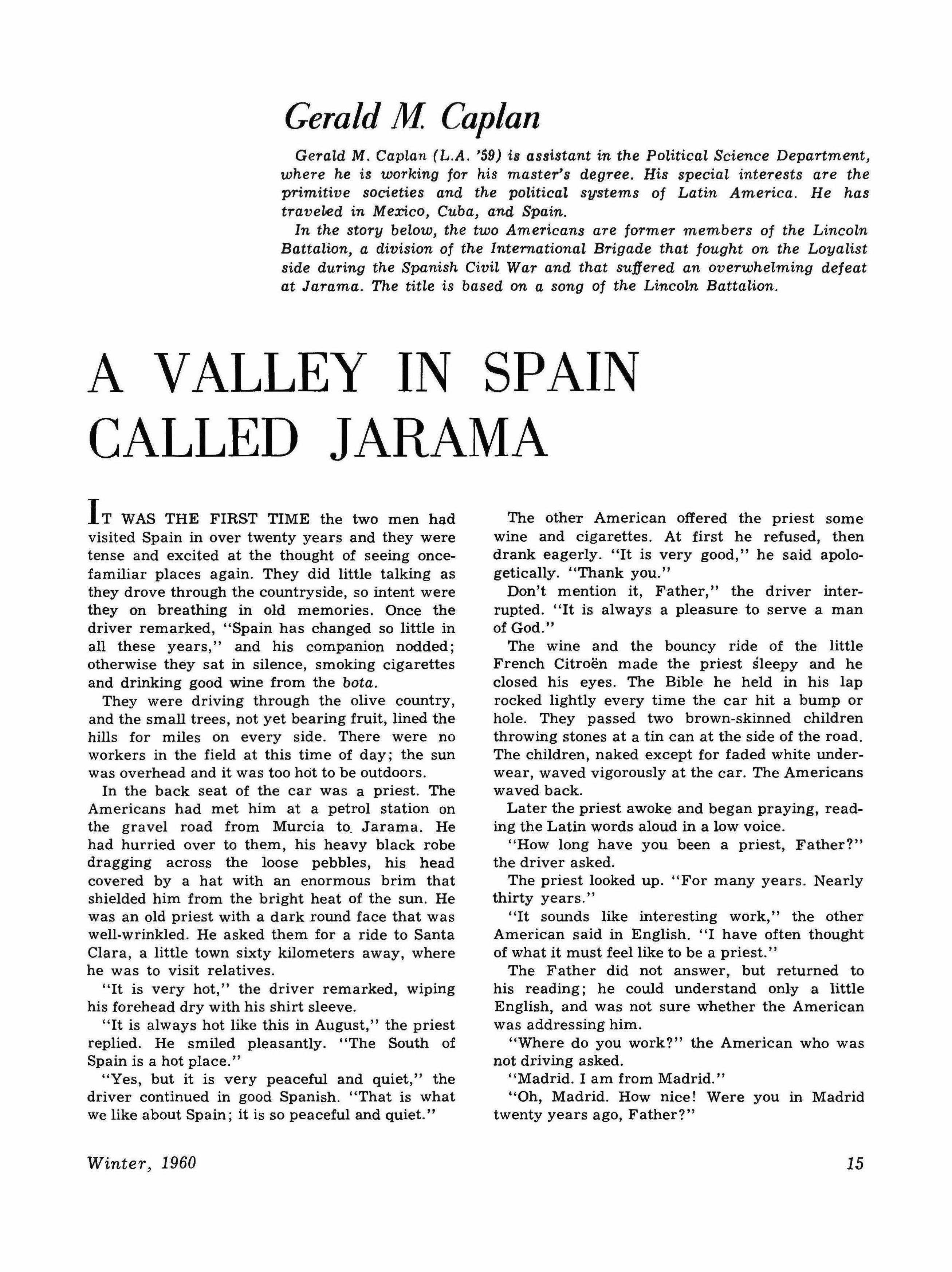
The other American offered the priest some wine and cigarettes. At first he refused, then drank eagerly. "It is very good," he said apologetically. "Thank you."
Don't mention it, Father," the driver interrupted. "It is always a pleasure to serve a man of God."
The wine and the bouncy ride of the little French Citroen made the priest sleepy and he closed his eyes. The Bible he held in his lap rocked lightly every time the car hit a bump or hole. They passed two brown-skinned children throwing stones at a tin can at the side of the road. The children, naked except for faded white underwear, waved vigorously at the car. The Americans waved back.
Later the priest awoke and began praying, reading the Latin words aloud in a low voice.
"How long have you been a priest, Father?" the driver asked.
The priest looked up. "For many years. Nearly thirty years."
"It sounds like interesting work," the other American said in English. "I have often thought of what it must feel like to be a priest."
The Father did not answer, but returned to his reading; he could understand only a little English, and was not sure whether the American was addressing him.
"Where do you work?" the American who was not driving asked.
"Madrid. I am from Madrid."
"Oh, Madrid. How nice! Were you in Madrid twenty years ago, Father?"
15
"What did you say?" the priest asked. "No, of course he was not in Madrid then," the other American said. "The priests were all helping out at Guernica and the Ebro and, of course, Jarama; they were not in Madrid. Isn't that so, Father?"
"What?" said the priest. "I do not understand." "Have you been to Jarama before, Father?" the driver asked. "When was the last time you fired a machine gun?" The driver turned to look at the priest, who stared at him curiously. "I joke, Father," he continued. "I am a big joker."
They were driving up a steep green hill from the top of which stretched a view of the countryside. Brown-leaved olive trees grew everywhere; they were planted in neat long rows along the bottom of the valley and over and across small hills that were very round. The driver drew the car to a slow halt. "I think we have a flat tire," he said.
"Want me to get out and look?" his companion asked.
The driver faced the priest, who sat quietly
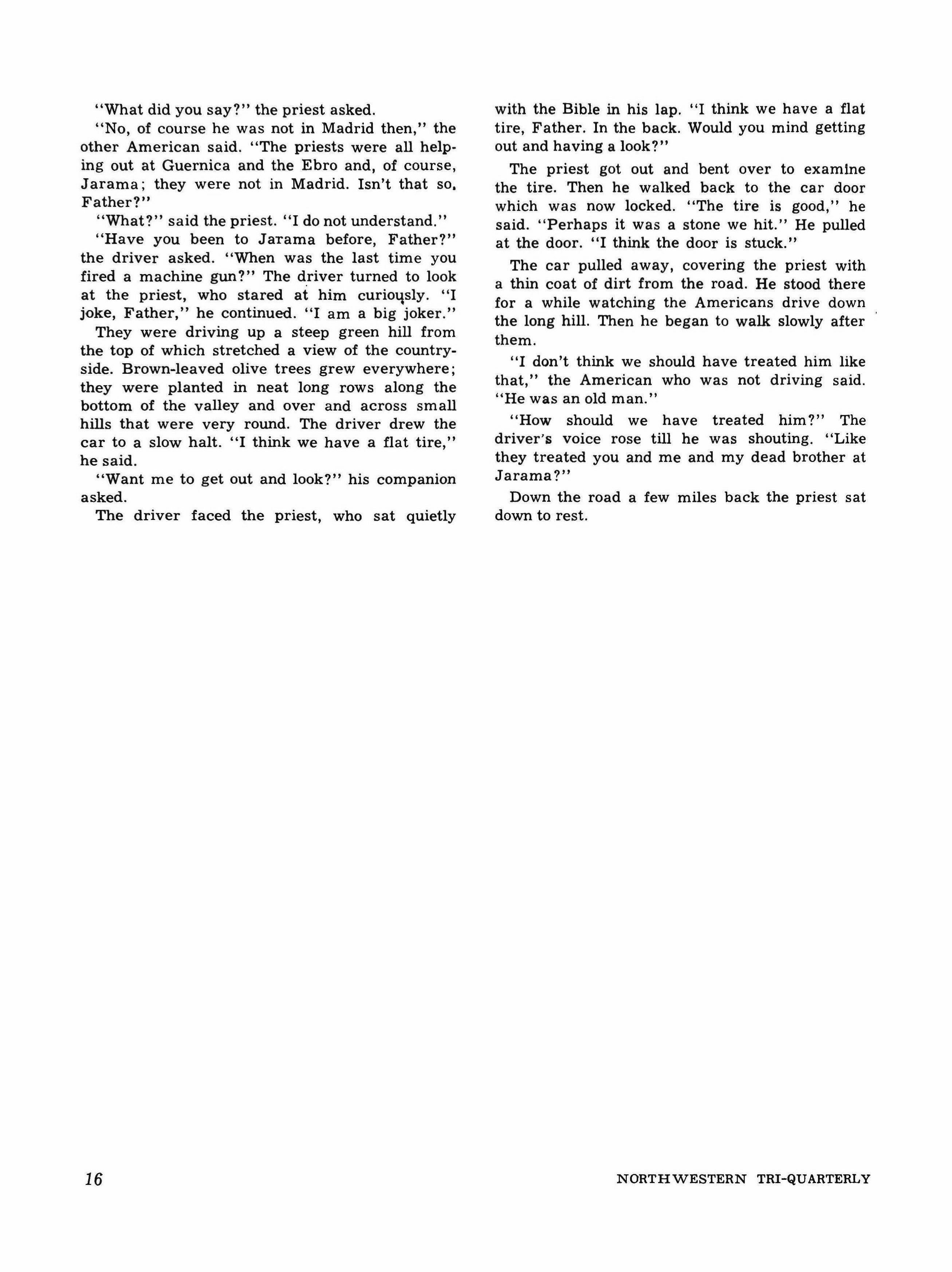
with the Bible in his lap. "I think we have a flat tire, Father. In the back. Would you mind getting out and having a look?"
The priest got out and bent over to examine the tire. Then he walked back to the car door which was now locked. "The tire is good," he said. "Perhaps it was a stone we hit." He pulled at the door. "I think the door is stuck."
The car pulled away, covering the priest with a thin coat of dirt from the road. He stood there for a while watching the Americans drive down the long hill. Then he began to walk slowly after them.
"I don't think we should have treated him like that," the American who was not driving said. "He was an old man."
"How should we have treated him?" The driver's voice rose till he was shouting. "Like they treated you and me and my dead brother at Jarama?"
Down the road a few miles back the priest sat down to rest.
16
NORTHWESTERN TRI-QUARTERLY
William E Powers
Willia.m Edwards Powers is professor of geography at Northwestern. Born in Florence, Al.abama, he received his B.A. (1925) and M.A. (1928) at Northwestern, and his Ph.D. in geology at Harvard (1931). He has held a number of offices in the learned societies in his field, and has served on the Geological Surveys of Illinois, North Dakota, and the United States. He has pubLished some seventy technical and professional articLes and books, including his Introduction to the Study of Weather and Climate (with H. B. Ward), 1942 and 1948, and (with Clyde F. Kohn) Aerial Photo-Interpretation of Landforms and Rural Cultural Features in Glaciated and Coastal Regions, 1959. In recent years he has done considerable research under contract with the U.S. Navy, Office of Naval Research.
Lake Michigan is a research area which has delighted Mr. Powers for many years, during which he has visited nearly every mile of its l,372-mile coastline. He wrote this article especially for THE TRI-QUARTERLY at the invitation of the editors.
LAKE MICHIGAN
FROM THE TIME OF VOYAGEURS and pioneer settlers, Lake Michigan has played an ever increasing part in man's life in the surrounding region. The Great Lakes, already the greatest inland waterway in the world, are expected to become even more important as the recent Saint Lawrence Seaway leads to an expansion of foreign trade. Such modern activities, the sites of lake ports like Chicago and Detroit, and even the presence of the lakes themselves are related to remarkable events in the recent geologic past, long before Europeans set foot on America. The story of Lake Michigan serves to illustrate the complex history of the Great Lakes. Our story goes back to before the Ice Age, long before even aboriginal man had arrived in the region.
The Great Lakes Region Be/ore the Glaciers Came
Although man did not see this region before the Ice Age, we can envision its appearance from such evidences as the bedrock surface below the glacial drift; the landforms in the "Driftless Area" of southwestern Wisconsin; and the pattern of glacial advance from Canada.
Where detailed maps have been made of the buried bedrock surface, based on well records which penetrate the glacial drift cover, that surface is found to be hilly, with high points and
Winter, 1960
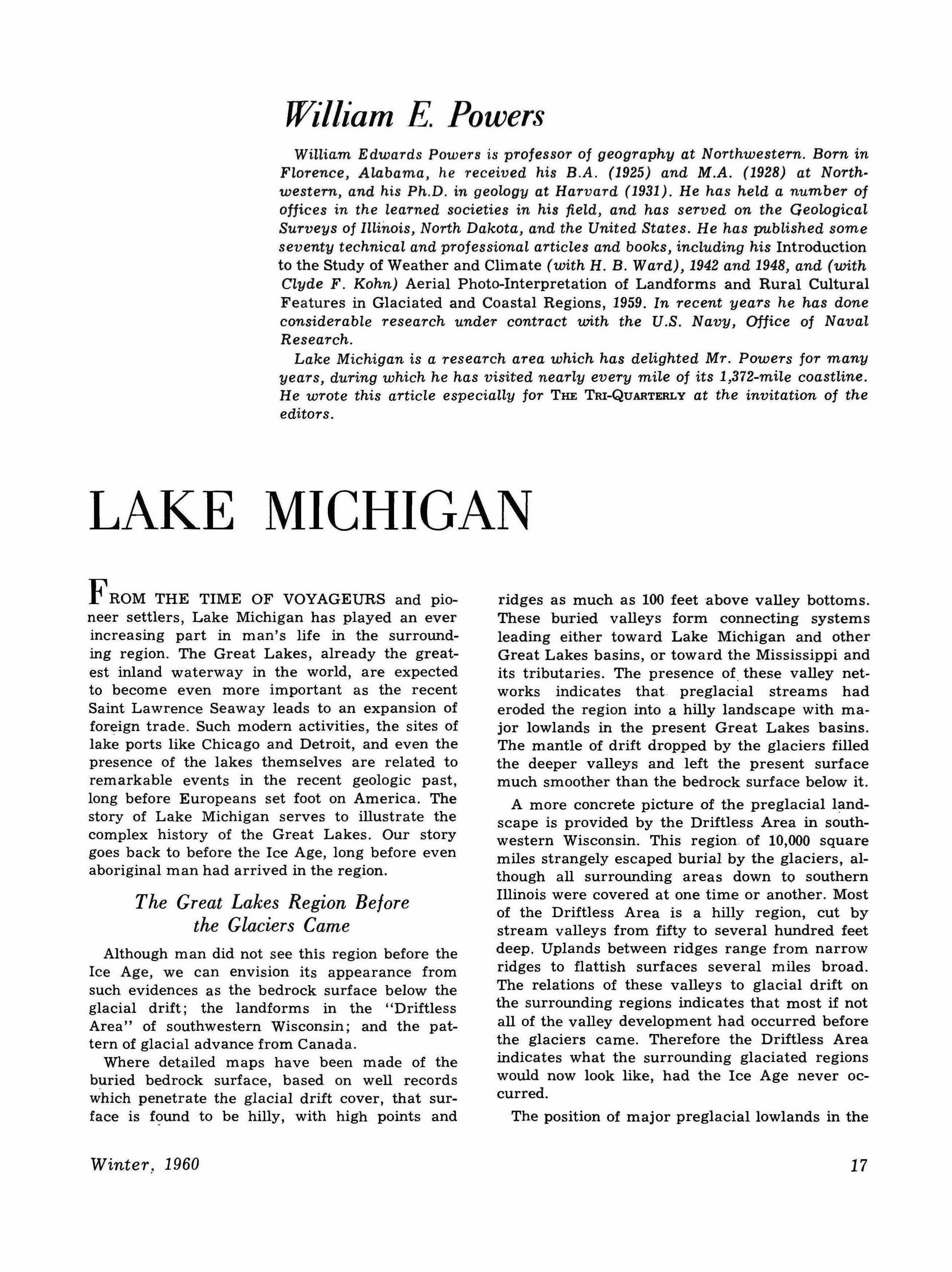
ridges as much as 100 feet above valley bottoms. These buried valleys form connecting systems leading either toward Lake Michigan and other Great Lakes basins, or toward the Mississippi and its tributaries. The presence of. these valley networks indicates that preglacial streams had eroded the region into a hilly landscape with major lowlands in the present Great Lakes basins. The mantle of drift dropped by the glaciers filled the deeper valleys and left the present surface much smoother than the bedrock surface below it.
A more concrete picture of the preglacial landscape is provided by the Driftless Area in southwestern Wisconsin. This region. of 10,000 square miles strangely escaped burial by the glaciers, although all surrounding areas down to southern Illinois were covered at one time or another. Most of the Driftless Area is a hilly region, cut by stream valleys from fifty to several hundred feet deep. Uplands between ridges range from narrow ridges to flattish surfaces several miles broad. The relations of these valleys to glacial drift on the surrounding regions indicates that most if not all of the valley development had occurred before the glaciers came. Therefore the Driftless Area indicates what the surrounding glaciated regions would now look like, had the Ice Age never occurred.
The position of major preglacial lowlands in the
17
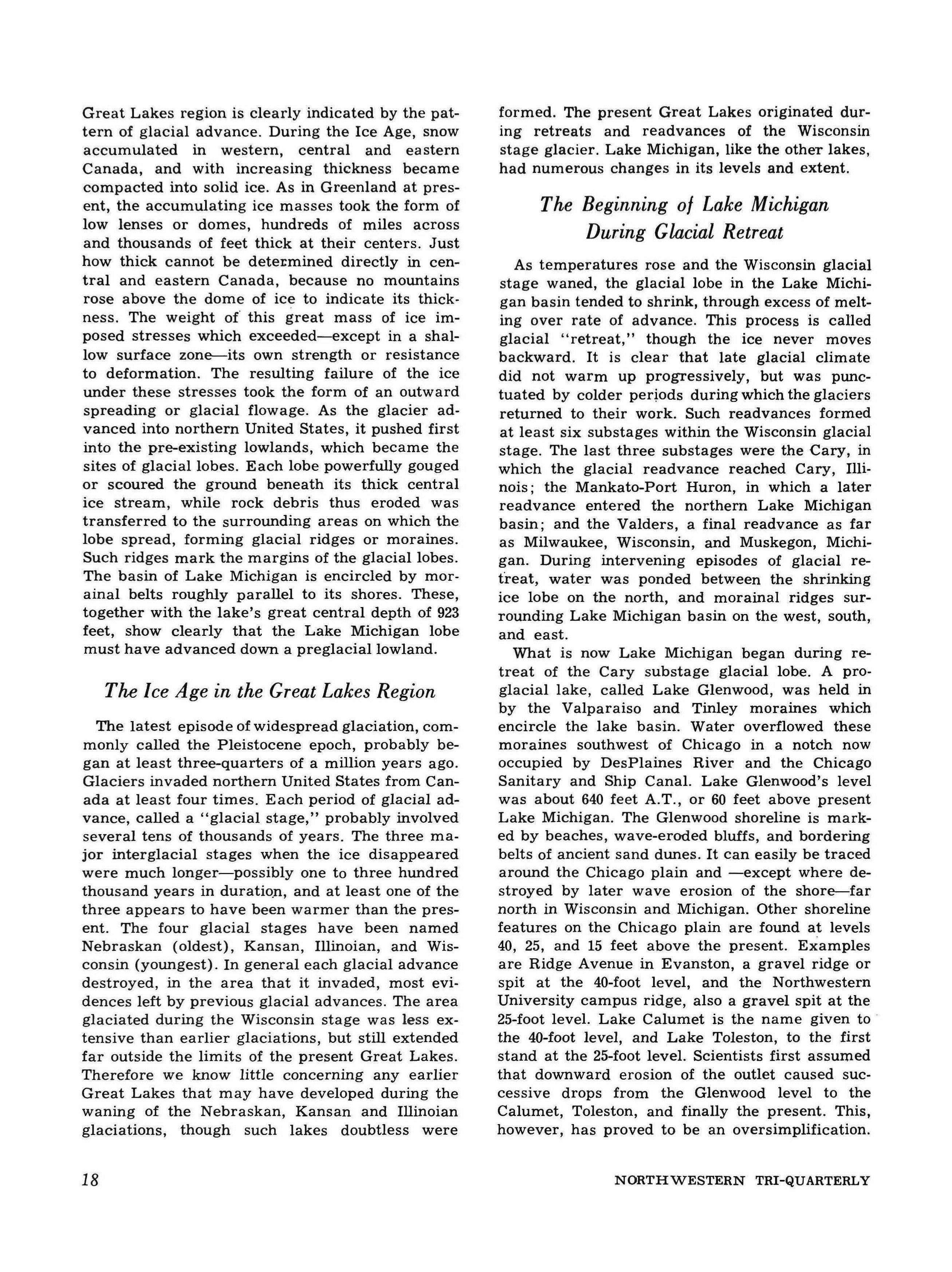
Great Lakes region is clearly indicated by the pattern of glacial advance. During the Ice Age, snow accumulated in western, central and eastern Canada, and with increasing thickness became compacted into solid ice. As in Greenland at present, the accumulating ice masses took the form of low lenses or domes, hundreds of miles across and thousands of feet thick at their centers. Just how thick cannot be determined directly in central and eastern Canada, because no mountains rose above the dome of ice to indicate its thickness. The weight of' this great mass of ice imposed stresses which exceeded-except in a shallow surface zone--its own strength or resistance to deformation. The resulting failure of the ice under these stresses took the form of an outward spreading or glacial flowage. As the glacier advanced into northern United States, it pushed first into the pre-existing lowlands, which became the sites of glacial lobes. Each lobe powerfully gouged or scoured the ground beneath its thick central ice stream, while rock debris thus eroded was transferred to the surrounding areas on which the lobe spread, forming glacial ridges or moraines. Such ridges mark the margins of the glacial lobes. The basin of Lake Michigan is encircled by morainal belts roughly parallel to its shores. These, together with the lake's great central depth of 923 feet, show clearly that the Lake Michigan lobe must have advanced down a preglacial lowland.
The Ice Age in the Great Lakes Region
The latest episode of widespread glaciation, commonly called the Pleistocene epoch, probably began at least three-quarters of a million years ago. Glaciers invaded northern United States from Canada at least four times. Each period of glacial advance, called a "glacial stage," probably involved several tens of thousands of years. The three major interglacial stages when the ice disappeared were much longer-possibly one to three hundred thousand years in duration, and at least one of the three appears to have been warmer than the present. The four glacial stages have been named Nebraskan (oldest), Kansan, Illinoian, and Wisconsin (youngest). In general each glacial advance destroyed, in the area that it invaded, most evidences left by previous glacial advances. The area glaciated during the Wisconsin stage was less extensive than earlier glaciations, but still extended far outside the limits of the present Great Lakes. Therefore we know little concerning any earlier Great Lakes that may have developed during the waning of the Nebraskan, Kansan and Illinoian glaciations, though such lakes doubtless were
formed. The present Great Lakes originated during retreats and readvances of the Wisconsin stage glacier. Lake Michigan, like the other lakes, had numerous changes in its levels and extent.
The Beginning 0/ Lake Michigan During Glacial Retreat
As temperatures rose and the Wisconsin glacial stage waned, the glacial lobe in the Lake Michigan basin tended to shrink, through excess of melting over rate of advance. This process is called glacial "retreat," though the ice never moves backward. It is clear that late glacial climate did not warm up progressively, but was punctuated by colder periods during which the glaciers returned to their work. Such readvances formed at least six substages within the Wisconsin glacial stage. The last three substages were the Cary, in which the glacial readvance reached Cary, Illinois; the Mankato-Port Huron, in which a later readvance entered the northern Lake Michigan basin; and the Valders, a final readvance as far as Milwaukee, Wisconsin, and Muskegon, Michigan. During intervening episodes of glacial retreat, water was ponded between the shrinking ice lobe on the north, and morainal ridges surrounding Lake Michigan basin on the west, south, and east.
What is now Lake Michigan began during retreat of the Cary substage glacial lobe. A proglacial lake, called Lake Glenwood, was held in by the Valparaiso and Tinley moraines which encircle the lake basin. Water overflowed these moraines southwest of Chicago in a notch now occupied by DesPlaines River and the Chicago Sanitary and Ship Canal. Lake Glenwood's level was about 640 feet A.T., or 60 feet above present Lake Michigan. The Glenwood shoreline is marked by beaches, wave-eroded bluffs, and bordering belts of ancient sand dunes. It can easily be traced around the Chicago plain and -except where destroyed by later wave erosion of the shore--far north in Wisconsin and Michigan. Other shoreline features on the Chicago plain are found at levels 40, 25, and 15 feet above the present. Examples are Ridge Avenue in Evanston, a gravel ridge or spit at the 40-foot level, and the Northwestern University campus ridge, also a gravel spit at the 25-foot level. Lake Calumet is the name given to the 40-foot level, and Lake Toleston, to the first stand at the 25-foot level. Scientists first assumed that downward erosion of the outlet caused successive drops from the Glenwood level to the Calumet, Toleston, and finally the present. This, however, has proved to be an oversimplification. NORTHWESTERN
18
TRI-QUARTERLY
Investigations have revealed the presence of peat and logs interbedded with certain lake sediments, thus indicating low water stages when areas of former lake bottom were dry land. Some of the lake sediments have been found to be interbedded with glacial drift, indicating that the glacier readvanced into the lake that it had created by its retreat. And it was found that shorelines of the later, more extensive lake stages are not horizontal throughout their extent, but rise northward and thus indicate upwarping in the earth's crust in the region northeast of the Great Lakes. The levels of Lake Michigan's predecessors were affected not only by lowering of its DesPlaines River outlet, but also by glacial retreat which from time to time uncovered lower outlets to the northeast. The former levels and drainage to the south were periodically restored by glacial readvances which blocked northern outlets, and by crustal upwarping that lifted northern outlets higher than those in the more stable southern part of the region. The interrelationships of these controlling factors led to an extraordinary succession of water levels in the Lake Michigan basin.
Water Levels in the Lake Michigan Basin
The successive lake stages beginning with Lake Glenwood have not only been identified as to level, but have been dated in years by use of the Carbon-14 isotope technique. Dates computed by this method appear to be accurate within five per cent or less, in most cases.
Lake Glenwood at 60 feet above the present level began nearly 16,000 years B.P. (i.e., before the present), when retreat of the Cary glacial lobe exposed the south end of the lake basin. The DesPlaines River outlet was established, and carried lake drainage to the Illinois River and thence to the Mississippi. As shown by its flat lake plain and shore features, Lake Glenwood covered the present Chicago plain from Winnetka southward to Indiana, and west to LaGrange, Bellwood, and Chicago Heights. With retreat of the Cary glacial lobe, Lake Glenwood eventually extended almost to northern Michigan. However, the northland was then much lower than now, and when the shrinking glacier cleared Little Traverse Bay near Petoskey, an outlet to the east lowered the water to its present level or below. This was about 14,000 B.P. Within half a millenium the glacier pushed back into Lake Michigan basin in its Mankato-Port Huron substage, and Lake Glenwood formed again at the 60-foot level. But by 12,000 B.P. a new glacial retreat cleared the Straits of Mackinac and lake level fell again to below the
Winter, 1960

present. This retreatal interval is called the Two Creeks. It is marked in eastern Wisconsin by forest litter, logs, and tree stumps that grew on silt and clay deposits of Lake Glenwood, deposited before the Two Creeks retreat of the glacier and laid bare during the resulting lowering of lake level. The C-14 method indicates that these plant remains are about 11,500 years old. The locality is the Lake Michigan shore near the hamlet of Two Creeks, a few miles north of Two Rivers, Wisconsin. These Two Creeks plant remains are covered by glacial drift deposited during the last ice invasion of the basin-the Valders. This drift forms a morainal belt in eastern Wisconsin parallel to the present shore, as far south as Milwaukee. Here the Valders glacier stopped. A submerged ridge crossing Lake Michigan basin from Milwaukee to Muskegon appears to be in part the Valders terminal moraine. This drift is brick red, clayey in texture, and contains few stones, so that it is easily distinguished from the gray, silty, stony drift dropped by the Cary glacier farther south and west.
The Valders glacial advance created Lake Glenwood a third time. Within a thousand years the glacier began its final retreat from the region, but this proceeded slowly, and meanwhile, Lake Glenwood's level began to fall. Its volume was augmented by inflow across Michigan, via the Grand River valley, of waters from large lakes in the Erie and Ontario basins. Greater outflow caused more rapid erosion of the DesPlaines outlet, and by 10,500 years ago this was lowered by 20 feet, resulting in Lake Calumet at the 620-foot level. Within a few hundred years erosion lowered the outlet another 15 feet, and Lake Calumet passed into Lake Toleston at 605 feet A.T. About 9,500 B.P. the retreating glacial margin uncovered an outlet channel - now the Trent River - from Georgian Bay of Lake Huron basin to the Lake Ontario basin, which was sufficiently low at that time to form an arm of the ocean - the Saint Lawrence estuary. The waters within the Michigan and Huron basins then formed a single lake, called Lake Algonquin, which was soon lowered by the Trent River outlet to 15 feet or more below present Lakes Michigan-Huron. However, upwarping of the northeast part of the region was now proceeding rapidly, and by 9,000 B.P. the Trent River outlet was raised above the DesPlaines outlet and Lake Algonquin again rose to the 605-foot level.
Next came the most extraordinary episode in Lake Michigan's history - its fall to a level 350 feet below the present. Further shrinkage of the waning glacier uncovered an outlet northeast from Georgian Bay into present Lake Nipisaing in On-
19
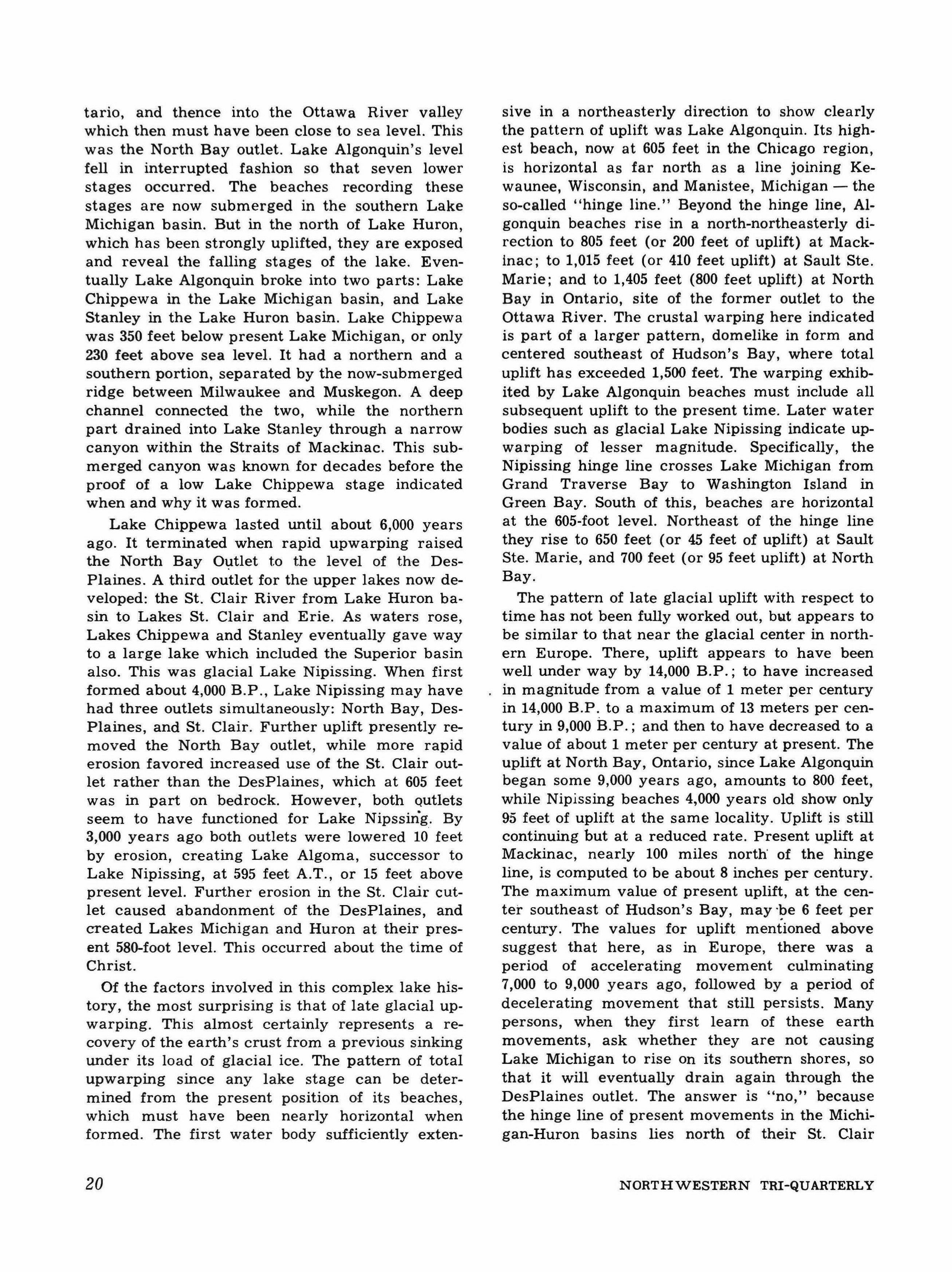
tario, and thence into the Ottawa River valley which then must have been close to sea level. This was the North Bay outlet. Lake Algonquin's level fell in interrupted fashion so that seven lower stages occurred. The beaches recording these stages are now submerged in the southern Lake Michigan basin. But in the north of Lake Huron, which has been strongly uplifted, they are exposed and reveal the falling stages of the lake. Eventually Lake Algonquin broke into two parts: Lake Chippewa in the Lake Michigan basin, and Lake Stanley in the Lake Huron basin. Lake Chippewa was 350 feet below present Lake Michigan, or only 230 feet above sea level. It had a northern and a southern portion, separated by the now-submerged ridge between Milwaukee and Muskegon. A deep channel connected the two, while the northern part drained into Lake Stanley through a narrow canyon within the Straits of Mackinac. This submerged canyon was known for decades before the proof of a low Lake Chippewa stage indicated when and why it was formed.
Lake Chippewa lasted until about 6,000 years ago. It terminated when rapid upwarping raised the North Bay Outlet to the level of the DesPlaines. A third outlet for the upper lakes now developed: the St. Clair River from Lake Huron basin to Lakes St. Clair and Erie. As waters rose, Lakes Chippewa and Stanley eventually gave way to a large lake which included the Superior basin also. This was glacial Lake Nipissing. When first formed about 4,000 B.P., Lake Nipissing may have had three outlets simultaneously: North Bay, DesPlaines, and St. Clair. Further uplift presently removed the North Bay outlet, while more rapid erosion favored increased use of the St. Clair outlet rather than the DesPlaines, which at 605 feet was in part on bedrock. However, both outlets seem to have functioned for Lake Nipssing, By 3,000 years ago both outlets were lowered 10 feet by erosion, creating Lake Algoma, successor to Lake Nipissing, at 595 feet A.T., or 15 feet above present level. Further erosion in the St. Clair cutlet caused abandonment of the DesPlaines, and created Lakes Michigan and Huron at their present 580-foot level. This occurred about the time of Christ.
Of the factors involved in this complex lake history, the most surprising is that of late glacial upwarping. This almost certainly represents a recovery of the earth's crust from a previous sinking under its load of glacial ice. The pattern of total upwarping since any lake stage can be determined from the present position of its beaches, which must have been nearly horizontal when formed. The first water body sufficiently exten-
sive in a northeasterly direction to show clearly the pattern of uplift was Lake Algonquin. Its highest beach, now at 605 feet in the Chicago region, is horizontal as far north as a line joining Kewaunee, Wisconsin, and Manistee, Michigan - the so-called "hinge line." Beyond the hinge line, Algonquin beaches rise in a north-northeasterly direction to 805 feet (or 200 feet of uplift) at Mackinac; to 1,015 feet (or 410 feet uplift) at Sault Ste. Marie; and to 1,405 feet (800 feet uplift) at North Bay in Ontario, site of the former outlet to the Ottawa River. The crustal warping here indicated is part of a larger pattern, domelike in form and centered southeast of Hudson's Bay, where total uplift has exceeded 1,500 feet. The warping exhibited by Lake Algonquin beaches must include all subsequent uplift to the present time. Later water bodies such as glacial Lake Nipissing indicate upwarping of lesser magnitude. Specifically, the Nipissing hinge line crosses Lake Michigan from Grand Traverse Bay to Washington Island in Green Bay. South of this, beaches are horizontal at the 60S-foot level. Northeast of the hinge line they rise to 650 feet (or 45 feet of uplift) at Sault Ste. Marie, and 700 feet (or 95 feet uplift) at North Bay.
The pattern of late glacial uplift with respect to time has not been fully worked out, but appears to be similar to that near the glacial center in northern Europe. There, uplift appears to have been well under way by 14,000 B.P.; to have increased in magnitude from a value of 1 meter per century in 14,000 B.P. to a maximum of 13 meters per century in 9,000 B.P.; and then to have decreased to a value of about 1 meter per century at present. The uplift at North Bay, Ontario, since Lake Algonquin began some 9,000 years ago, amounts to 800 feet, while Nipissing beaches 4,000 years old show only 95 feet of uplift at the same locality. Uplift is still continuing but at a reduced rate. Present uplift at Mackinac, nearly 100 miles north of the hinge line, is computed to be about 8 inches per century. The maximum value of present uplift, at the center southeast of Hudson's Bay, may 'be 6 feet per century. The values for uplift mentioned above suggest that here, as in Europe, there was a period of accelerating movement culminating 7,000 to 9,000 years ago, followed by a period of decelerating movement that still persists. Many persons, when they first learn of these earth movements, ask whether they are not causing Lake Michigan to rise on its southern shores, so that it will eventually drain again through the DesPlaines outlet. The answer is "no," because the hinge line of present movements in the Michigan-Huron basins lies north of their St. Clair
20
NORTHWESTERN TRI-QUARTERLY
River outlet. Therefore, the southern portions of both lakes are presently stable, and no change will occur in Lake Michigan's drainage unless the Straits of Mackinac - known to be more than 200 feet deep - are lifted by that amount so as to separate Lakes Michigan and Huron. At the present uplift rate of 8 inches per century, this will take 30,000 years.
How Lake Michigan's History Affects Man
The changing past levels of the lake have had important effects on man's occupance of the region. First, the flat lake plains formed when waters stood higher than the present have favored transportation and the spread of cities. On the plain at the foot of Lake Michigan, Chicago and its suburbs have spread in all directions except eastward into the lake. However, the low flat terrane thus occupied has presented serious problems in drainage and sewage disposal. Second, the low water stages such as Lake Chippewa caused all tributary streams to erode deep valleys. Upon subsequent rise in lake level, these valleys were flooded and became estuaries. Some remained to furnish good harbors, features lacking along most of the Lake Michigan shore. Examples are the inland harbors at Muskegon and Holland, Michigan. Other estuaries were closed by sandspits to become such coastal lakes as Glen Lake, Michigan. Still others were filled with river sediment and muck to form river flood plains; an example is that of the Milwaukee River. Such floodplains are very accessible to lake shipping and therefore have attracted industrial development, but the unstable materials forming these valley-fills have presented serious problems to foundation engineers.
Lake Michigan's Changing Shoreline
It has been pointed out that present upwarping of the earth's crust is mainly north of Lake Michigan, is proceeding at a very slow rate, and cannot now affect lake levels south of the hinge line. Present changes are mainly along Lake Michigan's shores, where waves and storms erode some stretches, build out others. Areas of erosion are generally marked by steep bluffs from a few feet to several hundred feet high, depending on the elevation of the area inland. Where the shore is composed of solid bedrock, as in much of Door County in Wisconsin, wave erosion has been very slow. But bluffs of unconsolidated sand, clay, gravel and glacial drift - which compose 29 per cent of the 1,372 miles of Lake Michigan shoreline - are easily undermined and driven back by wave attack. Many owners of shore property have suf-
Winter, 1960

fered severe losses, in some instances several feet during a single storm. Studies indicate that shore erosion and bluff recession are not constant but proceed at varying rates, being fastest when (a) bluffs are low, (b) bluffs are of weak, fine-grained material that yields little coarse detritus to accumulate into a protective beach, (c) water level is high, and (d) unusually severe storms occur. For a given locality, the first two factors do not vary, while the number and severity of storms appear to be distributed in haphazard fashion during long periods of years. But the mean annual level of Lake Michigan fluctuates through a vertical range of about five feet, with an irregular periodicity. The long-term mean level of the lake is 580.56 feet. Mean level for the year 1887 was 582.7 feet, and for 1929, 582.2 feet; while the mean level in 1926 was only 577.25 feet. High mean levels occurred in 1886, 1905-08, 1918, 1929, 1943, and 1952. Unusually low mean levels occurred in 1897, 1911, 1915, 1926, 1933-34, and 1956-59. Fairly high levels prevailed from 1943 to 1952. These figures indicate that high levels have occurred at intervals of about 13 years on the average, though the period has ranged from a few years to nearly 20. Times of unusually low water come in between.
When water is low, broad beaches protect the bluffs' behind them, and shore erosion is slow. When the water is high, beaches may be too narrow to protect the shore, and erosion may be rapid. Extreme examples are an annual loss of 40 feet between 1905 and 1907 for a low bluff of clay near Manitowoc, Wisconsin, and an annual loss of 12.33 feet between 1918 and 1921, for a fairly low bluff north of Kenosha, Wisconsin. Several studies have been made of such bluff recession in an attempt to find the average rate over a period of years. Such computations for various sectors of the Lake Michigan shore have indicated annual losses ranging from less than two to more than nine feet. However, it is apparent that only areas of unusually severe erosion were studied by most investigators. The region adjacent to Lake Michigan was surveyed by the United States government between 1829 and 1850. Many of the section corners then established can be easily identified today, and the original chained distances to the shore or "meander line" as recorded in surveyors' notes can be compared with the same lines as remeasured today. The writer recently identified more than 100 of these original survey points, and remeasured the distances to the lake shore. Most localities showed recession of the shore, with an average annual loss of approximately 1.6 feet. The average loss at a given shore locality includes periods of rapid erosion when lake levels were high,
21
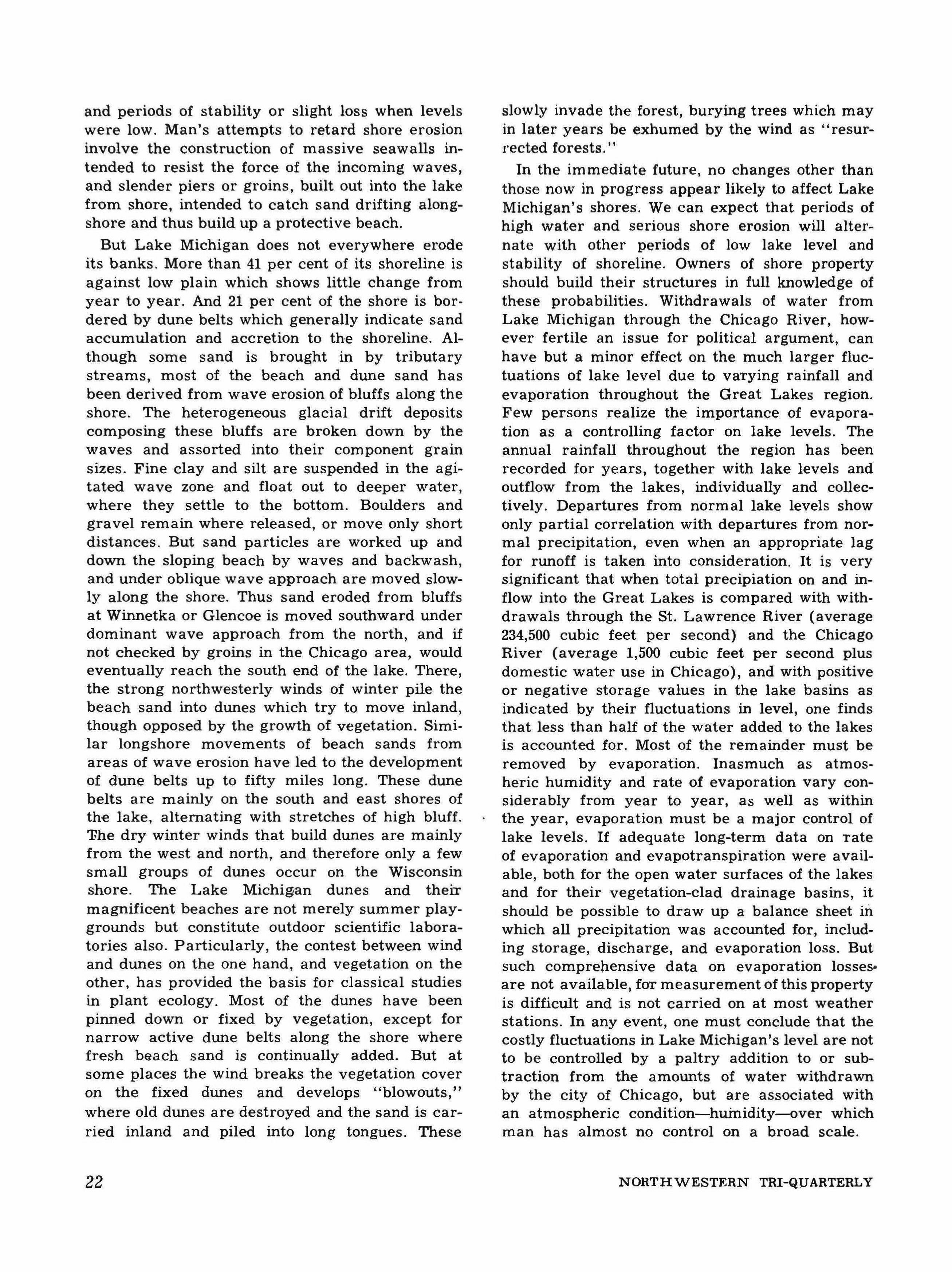
and periods of stability or slight loss when levels were low. Man's attempts to retard shore erosion involve the construction of massive seawalls intended to resist the force of the incoming waves, and slender piers or groins, built out into the lake from shore, intended to catch sand drifting alongshore and thus build up a protective beach.
But Lake Michigan does not everywhere erode its banks. More than 41 per cent of its shoreline is against low plain which shows little change from year to year. And 21 per cent of the shore is bordered by dune belts which generally indicate sand accumulation and accretion to the shoreline. Although some sand is brought in by tributary streams, most of the beach and dune sand has been derived from wave erosion of bluffs along the shore. The heterogeneous glacial drift deposits composing these bluffs are broken down by the waves and assorted into their component grain sizes. Fine clay and silt are suspended in the agitated wave zone and float out to deeper water, where they settle to the bottom. Boulders and gravel remain where released, or move only short distances. But sand particles are worked up and down the sloping beach by waves and backwash, and under oblique wave approach are moved slowly along the shore. Thus sand eroded from bluffs at Winnetka or Glencoe is moved southward under dominant wave approach from the north, and if not checked by groins in the Chicago area, would eventually reach the south end of the lake. There, the strong northwesterly winds of winter pile the beach sand into dunes which try to move inland, though opposed by the growth of vegetation. Similar longshore movements of beach sands from areas of wave erosion have led to the development of dune belts up to fifty miles long. These dune belts are mainly on the south and east shores of the lake, alternating with stretches of high bluff. 'Fhe dry winter winds that build dunes are mainly from the west and north, and therefore only a few small groups of dunes occur on the Wisconsin shore. The Lake Michigan dunes and their magnificent beaches are not merely summer playgrounds but constitute outdoor scientific laboratories also. Particularly, the contest between wind and dunes on the one hand, and vegetation on the other, has provided the basis for classical studies in plant ecology. Most of the dunes have been pinned down or fixed by vegetation, except for narrow active dune belts along the shore where fresh beach sand is continually added. But at some places the wind breaks the vegetation cover on the fixed dunes and develops "blowouts," where old dunes are destroyed and the sand is carried inland and piled into long tongues. These
slowly invade the forest, burying trees which may in later years be exhumed by the wind as "resurrected forests."
In the immediate future, no changes other than those now in progress appear likely to affect Lake Michigan's shores. We can expect that periods of high water and serious shore erosion will alternate with other periods of low lake level and stability of shoreline. Owners of shore property should build their structures in full knowledge of these probabilities. Withdrawals of water from Lake Michigan through the Chicago River, however fertile an issue for political argument, can have but a minor effect on the much larger fluctuations of lake level due to varying rainfall and evaporation throughout the Great Lakes region. Few persons realize the importance of evaporation as a controlling factor on lake levels. The annual rainfall throughout the region has been recorded for years, together with lake levels and outflow from the lakes, individually and collectively. Departures from normal lake levels show only partial correlation with departures from normal precipitation, even when an appropriate lag for runoff is taken into consideration. It is very significant that when total precipiation on and inflow into the Great Lakes is compared with withdrawals through the St. Lawrence River (average 234,500 cubic feet per second) and the Chicago River (average 1,500 cubic feet per second plus domestic water use in Chicago), and with positive or negative storage values in the lake basins as indicated by their fluctuations in level, one finds that less than half of the water added to the lakes is accounted for. Most of the remainder must be removed by evaporation. Inasmuch as atrnosheric humidity and rate of evaporation vary considerably from year to year, as well as within the year, evaporation must be a major control of lake levels. If adequate long-term data on rate of evaporation and evapotranspiration were available, both for the open water surfaces of the lakes and for their vegetation-clad drainage basins, it should be possible to draw up a balance sheet in which all precipitation was accounted for, including storage, discharge, and evaporation loss. But such comprehensive data on evaporation lossesare not available, for measurement of this property is difficult and is not carried on at most weather stations. In any event, one must conclude that the costly fluctuations in Lake Michigan's level are not to be controlled by a paltry addition to or subtraction from the amounts of water withdrawn by the city of Chicago, but are associated with an atmospheric condition-huinidity-over which man has almost no control on a broad scale. NORTHWESTERN TRI-QUARTERLY
22
John F Clute
John F. Clute, born in Toronto, is a Canadian citizen. He now lives in Wilmette. His early schooling was begun at Toronto and completed at New Trier High School. He is nineteen years old, a sophomore in the College of Liberal Arts.
A POEM
carcajou lament on the surfeit of blackandwhite chiaroscuro
I:
one gesticulates food to mouth, (marshalled by martinet fork) clicks lips goodby to bobbypinned bedmate: morningdear.
one manipulates legs unfrowardly (marshalled by militant sidewalk) to the irrelevantly phallic bustopsign: morningharry.
one wriggles aboard the bus, with harry. one sits (prim buttocks marshalled by the seat) probably beside harry, whom one knows.
carcajou rampant, fiery in the new earth's rusted middle, carcajou sniff about the rigid chiaroscuro, the brass navel of the new land. unshaven, unrectified, flame phallic in the blackandwhite city.
one cracks a chapped smile at harry and (bidden by the antiseptic bus' proper halt) arises and impotently upright cracks: haveagooddayharry.
one manoeuvres through the aisle, exits and (bidden by his brazen mating call) moves through the city's geometry to a newsboy: aStarplease.
one pauses, meticulously immobile. one reads (eye bidden by salacious headline) with pigeon-toed eyebrow correctly arched.
carcajou stop, there is no vital fatal error here,
Winter, 1960

carcajou, no right, no wrong in the new land's meticulous chiaroscuro, in the city's brittle straining to be impotently phallic.
If:
the meticulous bitterness of a washed bus, the casual eternity of a subway train rub me raw as flames the width of god in a metal forest. I tend to scream: if it echoes, at least the walls have responded: chiaroscuro, but no red.
the breath of the carcajou is flame. the city was born in 1920 and was aged by the raging years and temporal agonies of the time: the carcajou is exiled, the raw breath that bore the city is boycotted by intricacy, by the complexities of life, by the impotent fallacies of the drawing board: the frigidaire trumpets enthusiastic fiats: an electric exultation Yes, Allah, Allah to freshfrozen venison.
He Who had died to save men had died Man: the new, the neon jesus saves the bowdlerized, the meticulously transient. the carcajou is exiled, the carcajou is damned. there is a brighter flame than neon.
23
III:
crane, lament, the ground is filled, you have borne your steel child.
a birth, a christening, crack the bottle. champagne for petrified chipmunks. there they stand, the placidly awed, the begetters, the cleanly clad before their Zeus: an impotent glass-sheathed phallic mockery.
one's new officebuilding is airconditioned. saltpetre in our lunch, indifferent rumor has it. ah the champagne last night to celebrate. one almost blushes at what one almost asked one's secretary. behind the frigidaire, munching animal crackers, one was not quite sure one could still do it. youth was a wearisome time and unsettled: one has a wife.
IV:
one travails late and one regards the carcajou lurid in the windowpane: a pang of remembrance?
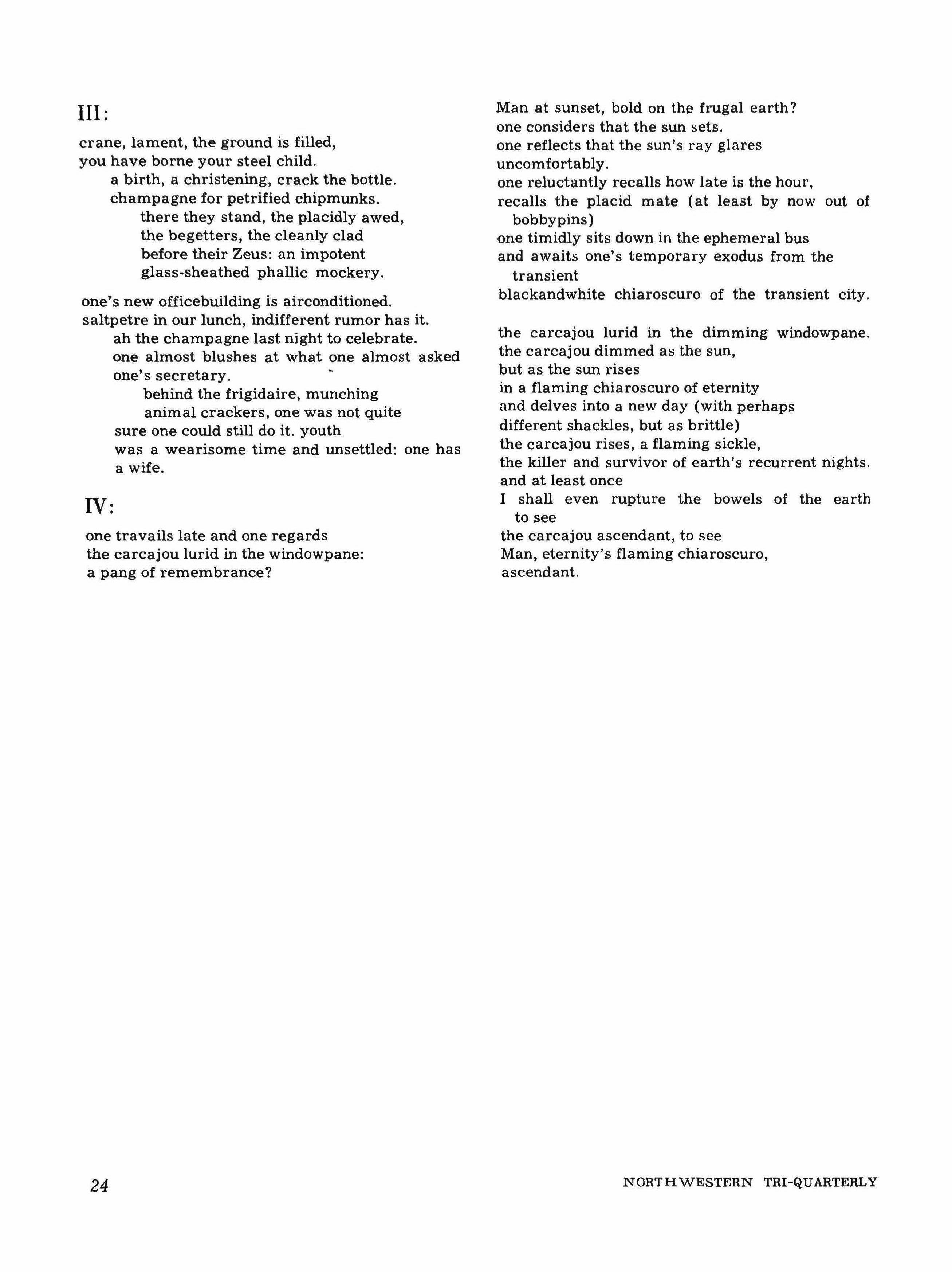
Man at sunset, bold on the frugal earth? one considers that the sun sets. one reflects that the sun's ray glares uncomfortably.
one reluctantly recalls how late is the hour, recalls the placid mate (at least by now out of bobbypins)
one timidly sits down in the ephemeral bus and awaits one's temporary exodus from the transient blackandwhite chiaroscuro of the transient city.
the carcajou lurid in the dimming windowpane. the carcajou dimmed as the sun, but as the sun rises in a flaming chiaroscuro of eternity and delves into a new day (with perhaps different shackles, but as brittle) the carcajou rises, a flaming sickle, the killer and survivor of earth's recurrent nights. and at least once
I shall even rupture the bowels of the earth to see the carcajou ascendant, to see Man, eternity's flaming chiaroscuro, ascendant.
24
NORTHWESTERN TRI-QUARTERLY
Richard Eberhart
The TRI-QUARTERLY is pLeased to print these two poems which Mr. Eberhart kindly sent Mr. ThorsLev to accompany his article. "Divarication" .is hitherto unpublished; "Ernest Chenaur" was printed in Dartmouth's Vox Last Spring.
POEMS
Divarication
I saw the grains of time In meshes of music. I threw the spear That pierced Christ's side.
I felt philosophy In lonely attics And mathematics As will toward purity.
I felt depth as love Loss as profundity Joy as momentary Effort as necessity.
And over Western Europe A doubtful fame
As to Chinese rhythms Unaccustomed I came.
It is equally true In imagination That I was the wounded, I took the spear.
And God was dancing brave Before suicides and saints. He said, Not Western, not Eastern, It is a world poet I need.
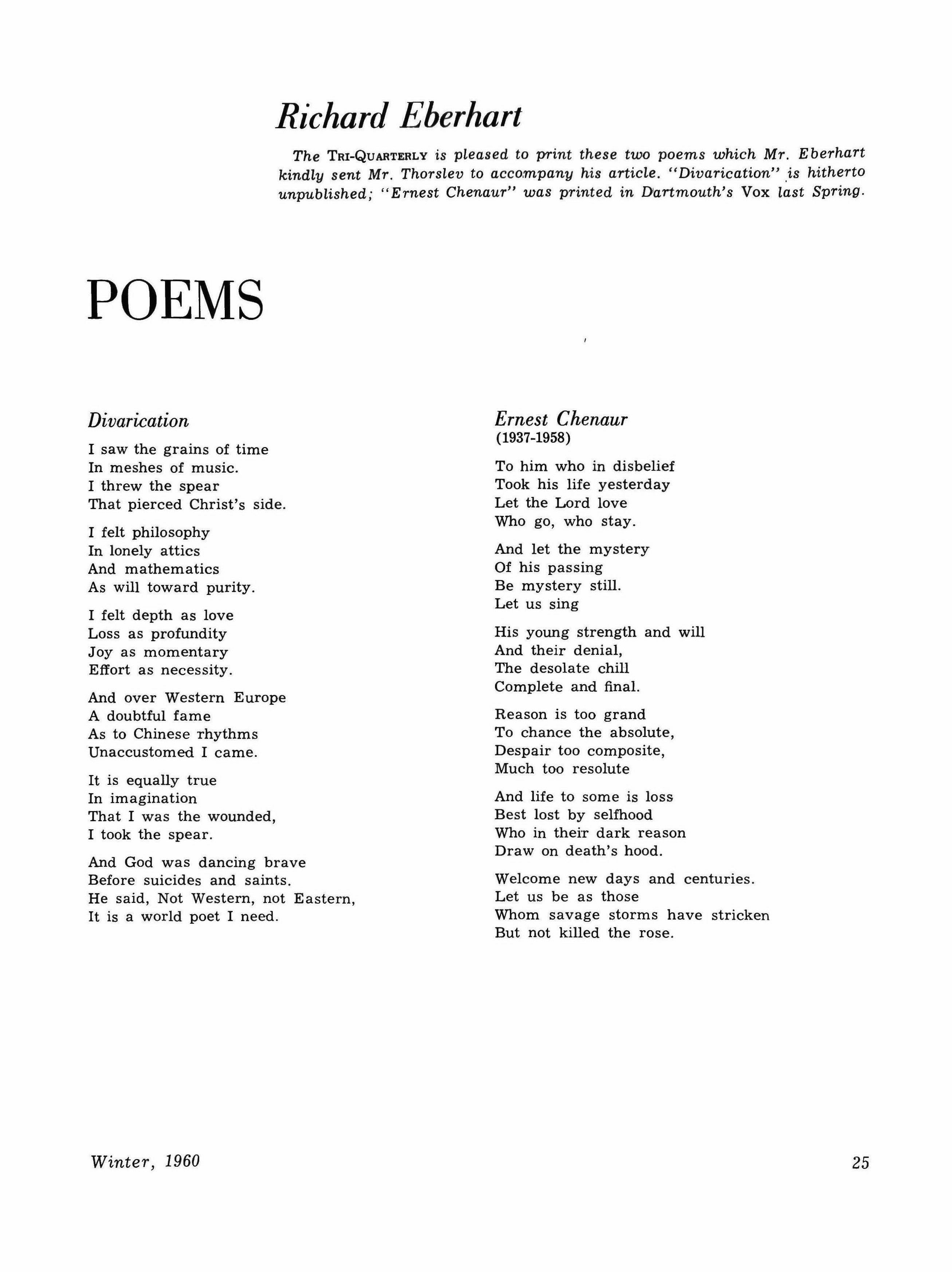
Ernest Chenaur (1937-1958)
To him who in disbelief Took his life yesterday Let the Lord love Who go, who stay.
And let the mystery Of his passing Be mystery still. Let us sing
His young strength and will And their denial, The desolate chill Complete and final.
Reason is too grand To chance the absolute, Despair too composite, Much too resolute
And life to some is loss Best lost by selfhood Who in their dark reason Draw on death's hood.
Welcome new days and centuries. Let us be as those Whom savage storms have stricken But not killed the rose.
Winter,
25
1960
Peter L. Thorslev, Ir.
Peter L. Thorslev, Jr., came to Northwestern as instructor in the Department of English last fall. Born in Iowa in 1929 he received his early education in Canada, and was graduated [rom. Dana Coltege, Nebraska, in 1950. Following three years in the U.S. Army, in this country and in Europe, he took his grad· uate degrees at the University of Minnesota (M.A. 1957, Ph.D. 1959) where he was Shevlin Fellow in Arts (1955-56), taught as assistant and instructor for two years, and published a number of articles and reviews in Graduate Student of English.
This is the fifth in THE TRI-QUARTERLY'S series of articles on living American poets.
THE POETRY OF RICHARD· EBERHART
It is absurd to wince at being called a romantic poet. Unless one is that, one is not a poet at all. Wallace Stevens, in Opus Posthumous
RICHARD
EBERHART'S life has been almost as varied as his poetry, rising at times to poetic adventure, and sinking again to the seemingly prosaic. Born at Austin, Minnesota, in 1904, he was raised there, and it was from there that he went to Dartmouth, where he received his B.A. in 1926. He capped his undergraduate education with a trip around the world on a tramp steamer, working as a deck-boy, chipping rust from sun-glaring decks, or stoking coal in engine-rooms with temperatures well over 100 degrees, and visiting strange oriental cities. He completed his education at St. John's College, Cambridge (B.A. 1929, M.A. 1933), and at Harvard; but during this time he also took a year off to become tutor to the son of Prajadhipok, the King of Siam. He then returned to the more conventional teaching of English at St. Mark's School, Southboro, Massachusetts, until the outbreak of the second World War. During the war, he served in the U.S. Navy, in aircraft gunnery for part of the time; after the war, he joined the Butcher Polish Company, of Boston. While rising in six years from assistant manager to vice president,
The quotations are by permission of the Oxford University Press (New York). Most of the poems cited will be included in Richard Eberhart's forthcoming volume, Collected Poems: 1930-1960, from the same publishers.
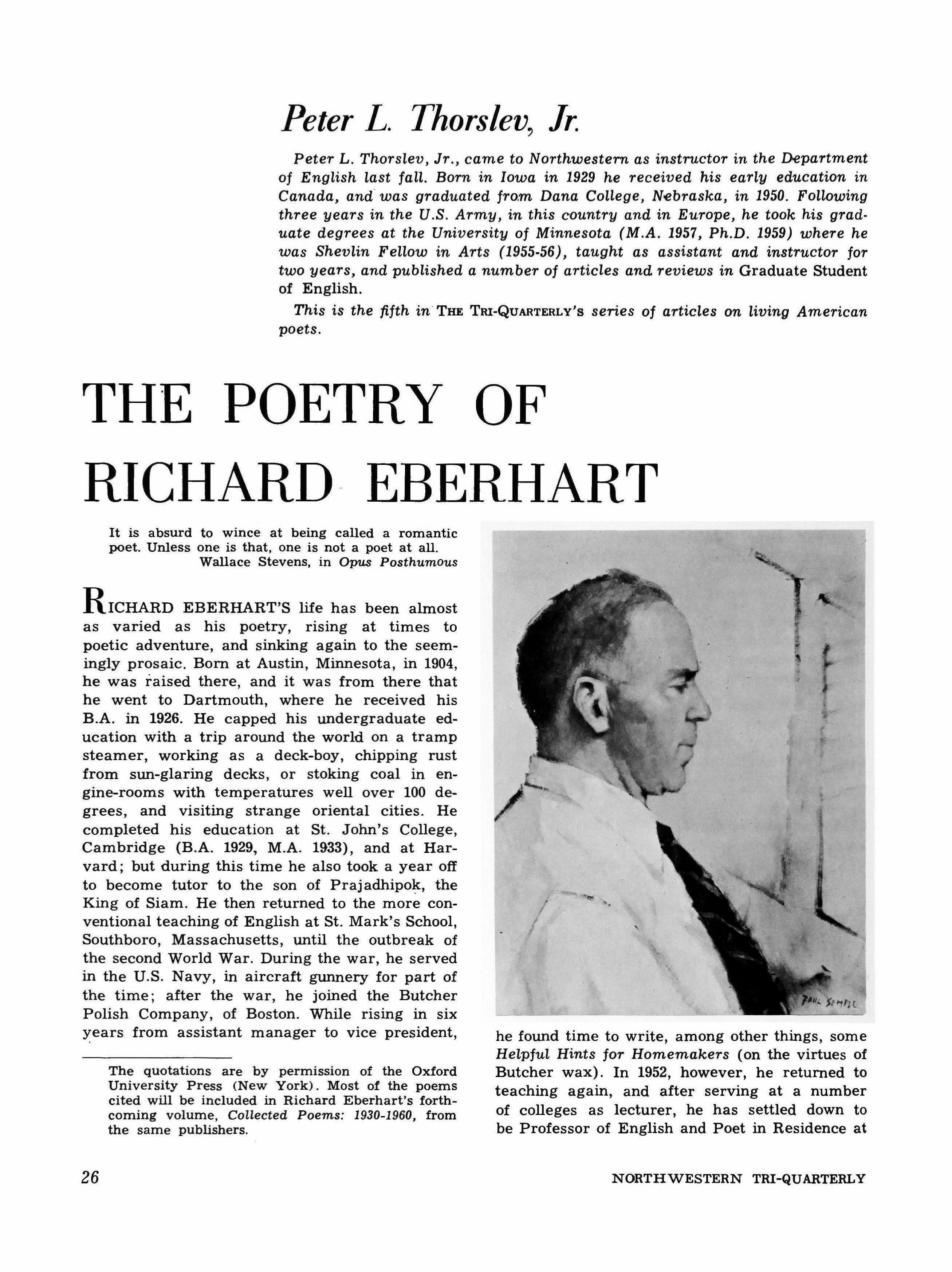
he found time to write, among other things, some Helpful Hints for Homemakers (on the virtues of Butcher wax). In 1952, however, he returned to teaching again, and after serving at a number of colleges as lecturer, he has settled down to be Professor of English and Poet in Residence at
NORTHWESTERN TRI-QUARTERLY
26 -_ ,..,.. I '. I
Dartmouth, his alma mater. This year he is on leave of absence to serve as Consultant in Poetry at the Library of Congress.
Recognition has come to Eberhart rather as a slow growth or accretion than as sudden fame. His first volume of verse, A Bravery of Earth, appeared in England in 1930, and since that date six more volumes have appeared, in England and America, the latest, Great Praises, in 1957. His Collected Poems: 1930-1960, will appear next year. His honors include the Harriet Monroe Memorial Award, the Shelley Memorial Prize (1951), and a grant from the National Institute of Arts and Letters.
From the first his reviews have been "mixed"; their general tenor could be summarized in the nursery rhyme: "When he is good, he is very, very good;/ And when he is bad, he is horrid." Such a reaction on the part of critics is not in itself remarkable, I suppose: a poet who writes such lines as these: "My being being being's essence, a mathema" ("The Magical"), or "Will will will him his own, a fabled ease" ("Sestina"), certainly risks offending the sensitive ears of his critics. Such verbal pyrotechnics perhaps distract more than they convey. (Admittedly much of Eberhart's verse reads like a poetry of inclusion, rather than of selection or exclusion. In his criticism and casual pronouncements he has not expressed much respect for the care-filled revision, fOT the serious second thoughts which would perhaps excise such lines as these.) But what is more remarkable in these reviews is the tone which Eberhart's critics assume. In the face of his successes they remain curiously inarticulate, almost in awe; with his "failures," on the other hand, they are never condescending, or merely disappointed: they become petulant, exasperated, almost infuriated. It is as if somehow they were personally involved, and personally betrayed. To put it another way, with much contemporary poetry one is pleased or annoyed, surprised by an unexpected felicity or a clever image, or mildly irritated because so much cerebration seems to yield so little; and just below the level of consciousness hovers the question: But does it all really matter? With Eberhart's poetry this question never occurs; the reader is immediately aware that what is being said, with whatever success, does indeed matter, both to himself and to the poet. One may sometimes question the felicity of the expression, but one is never tempted to question the validity of the experience.
The qualities just indicated-the reliance on first thoughts or on "inspiration," the emotional intensity, the earnestness, and the assertive mor-
Winter, 1960
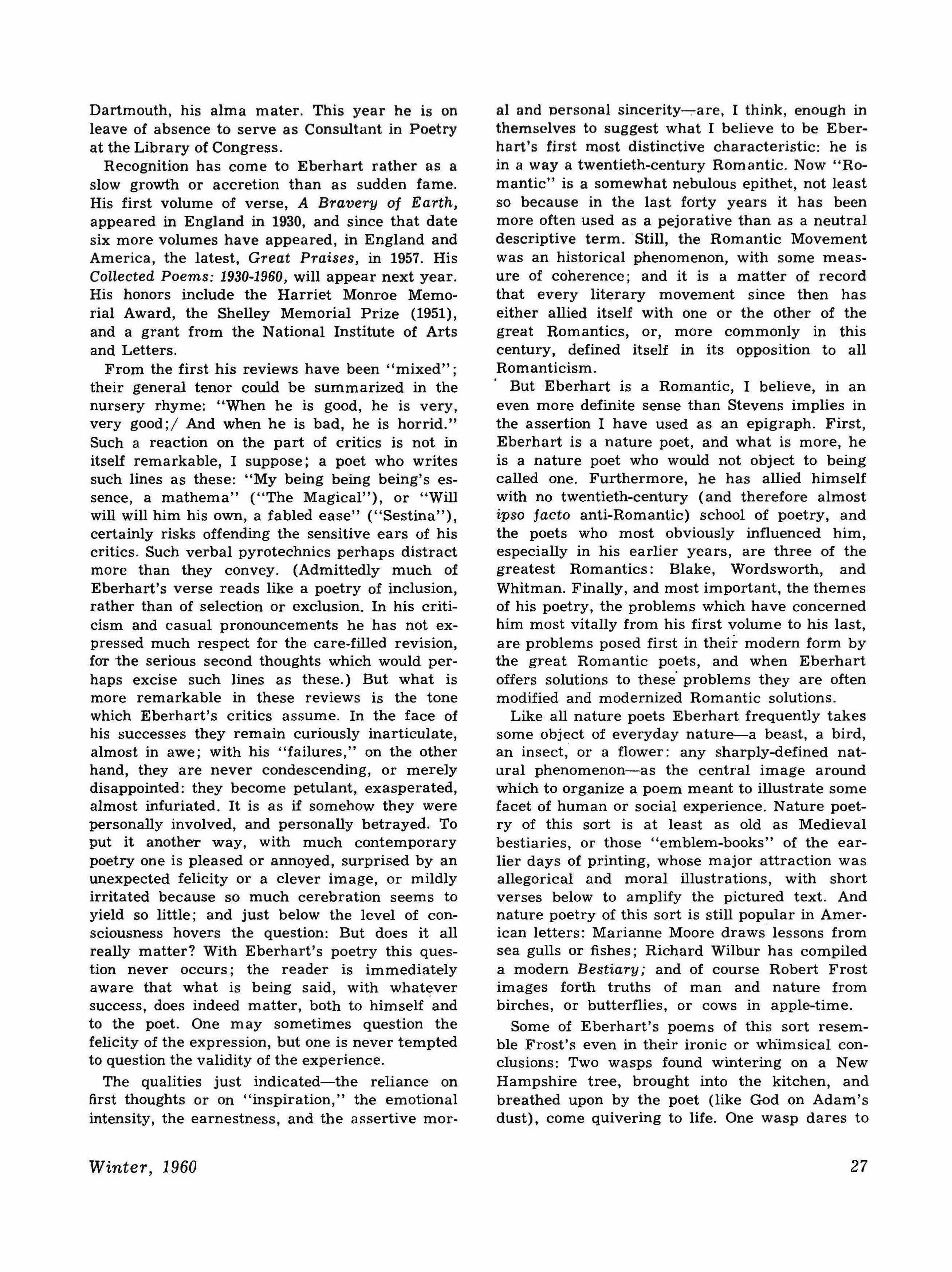
al and personal sincerity-e-are, I think, enough in themselves to suggest what I believe to be Eberhart's first most distinctive characteristic: he is in a way a twentieth-century Romantic. Now "Romantic" is a somewhat nebulous epithet, not least so because in the last forty years it has been more often used as a pejorative than as a neutral descriptive term. Still, the Romantic Movement was an historical phenomenon, with some measure of coherence; and it is a matter of record that every literary movement since then has either allied itself with one or the other of the great Romantics, or, more commonly in this century, defined itself in its opposition to all Romanticism.
But Eberhart is a Romantic, I believe, in an even more definite sense than Stevens implies in the assertion I have used as an epigraph. First, Eberhart is a nature poet, and what is more, he is a nature poet who would not object to being called one. Furthermore, he has allied himself with no twentieth-century (and therefore almost ipso facto anti-Romantic) school of poetry, and the poets who most obviously influenced him, especially in his earlier years, are three of the greatest Romantics: Blake, Wordsworth, and Whitman. Finally, and most important, the themes of his poetry, the problems which have concerned him most vitally from his first volume to his last, are problems posed first in their modern form by the great Romantic poets, and when Eberhart offers solutions to these' problems they are often modified and modernized Romantic solutions.
Like all nature poets Eberhart frequently takes some object of everyday nature--a beast, a bird, an insect, or a flower: any sharply-defined natural phenomenon-as the central image around which to organize a poem meant to illustrate some facet of human or social experience. Nature poetry of this sort is at least as old as Medieval bestiaries, or those "emblem-books" of the earlier days of printing, whose major attraction was allegorical and moral illustrations, with short verses below to amplify the pictured text. And nature poetry of this sort is still popular in American letters: Marianne Moore draws lessons from sea gulls or fishes; Richard Wilbur has compiled a modern Bestiary; and of course Robert Frost images forth truths of man and nature from birches, or butterflies, or cows in apple-time.
Some of Eberhart's poems of this sort resemble Frost's even in their ironic or whimsical conclusions: Two wasps found wintering on a New Hampshire tree, brought into the kitchen, and breathed upon by the poet (like God on Adam's dust), come quivering to life. One wasp dares to
27

attempt to fly, but dazed, it falls and is crushed accidentally by the poet's boot. The other, safer and sager, remains to become a pet; and Eberhart concludes:
The moral of this is plain. But I will shirk it. You will not like it. And God does not live to explain. ("New Hampshire, February")
In another poem in the same volume the poet finds wisdom in contemplating the "large soft cows" in a warm barn. The cow has "learned the lesson of the pacifist," that of passive sufferance. Eberhart concludes ironically:
If acceptance after storms of decades Is the ounce of wisdom in electrified flesh, Philosophy can end in the eye of a cow.
("Burr Oaks: The Barn")
Others of these "emblem" poems seem to come closer, in theme and in spirit, to the poems of Blake. The dry husk of the sloughed skin of a cicada leads the poet to consider life, change, and perfect death-like form, and to question "What eternal hovers in Him?" ("The Largess"); and the sight of a "tight lizard on a wall" leads him to ask ultimate questions-"What the protection, who the protector?"-like Blake's in "The Tiger." Even cancer cells under a microscope, in their "spiky shapes," become an image of the poetic imagination, of the "fixed forms in the massive fluxion."
One of these poems, although not printed until 1953, was actually written much earlier, and is somewhat unique in that it seems reminiscent of the woods and of the history of Eberhart's native Minnesota. He must often have seen this soft, white fungus with its single flower in the groves and pastures around Austin. The lyric spells out no explicit moral, and its meaning is left to spiral out from Indians and ghosts to the evanescence of all forces and dreams. The poem is entitled "Indian Pipe":
Searching once I found a flower
By a sluggish stream.
Waxy white, a stealthy tower
To an Indian's dream.
This its life supreme.
Blood red winds the sallow creek
Draining as it flows.
Left the flower all white and sleek, Fainting in repose.
Gentler than a rose.
Red man's pipe is now a ghost
Whispering to beware.
Hinting of the savage host
Once that traveled there.
Perfume frail as air.
But Eberhart is by no means alone among con-
temporary poets in his use of animal or floral "emblems"; he is more particularly the nature poet in his celebration of the sheer sensuous and sensual pleasures in the physical world around him. In this he comes close, in spirit, at least, to Wordsworth, or to the Whitman of "Song of Myself." Eberharts first volume of poetry, A Bravery of Earth (1930), opens and closes with the lines:
This fevers me, this sun on green, On grass glowing, this young spring.
The whole volume is really one long poem in four parts, and it forms something unique in twentiethcentury American verse, I believe: it is a spiritual autobiography of a poet, and its obvious model is Wordsworth's Prelude. Not in style or diction, certainly; Eberhart's short lyric lines, with their irregular rhymes and rhythms, are very much his own. But the stages in the poet's spiritual growth are remarkably like those Wordsworth describes in the Prelude. The "first awareness" is of life as will, as sensual force, the "fever" of the sun and of the world of energy and sub-intellectual life: much the same as the feeling for nature which Wordsworth describes in his youthful climbing over the Cumberland hills, or along the banks of the Wye. The "second awareness," however, is an intellectual disillusionment caused by analytic reason, which makes the world seem a dull and deadly mechanism, drained of will or purpose (Wordsworth describes a similar experience once in his student life at Cambridge). Gradually, however, the poet grows into the light of a new manhood, "a bravery of earth," and this "third awareness" brings a new understanding not only of nature, but of man in nature - a vision of purpose and of human "destiny" which owes much, I think, to Whitman.
The elemental joy in physical nature is admittedly more characteristic of Eberhart's early poetry; still, enough of it remains to add a special poignancy to such later poems as "Recollection of Childhood" or "If I could only live at the pitch that is near madness." In the latter poem he laments the fact that in taking on manhood he has come "into the realm of complexity,"
Where nothing is possible but necessity
And the truth wailing there like a red babe.
But sometimes even in his mature poetry he can achieve a pure nature lyric such as "Now is the air made of chiming balls," in which the delight in all of the senses is unclouded by analytic reason or moral second thoughts:
Now is the air made of chiming balls. The stormcloud, wizened, has rolled its rind away.
NORTHWESTERN TRI-QUARTERLY
28
Now is the eye with hill and valley laved And the seeds, assuaged, peep from the nested spray.
The bluebird drops from a bough. The speckled meadow-lark Springs in his blithe array. Fresh air
Blesses the vanished tear: the bunched anguish. The laughing balls their joyful pleasure tear. Renewed is the whole world and the sun Begins to dress with warmth again every thing. The lettuce in pale burn; the burdock tightening; And naked necks of craning fledglings.
Nevertheless, such joy in uncomplicated nature is relatively rare in Eberhart's latest poetry; he moves on to consider themes and problems more complex and tragic. The "second awareness" comes for him as it comes for the first Romantics; and nature and man, which seem simple and unified in childhood, break into the complexities of adult life. In Blake's terms, we move from innocence to experience, and the new "awareness" becomes painful and intense. The Romantics did not, after all, come by their mature "single visions" easily (in Blake's terms again): at first the old certainties of the Enlightenment broke into polar opposites, and what they found was rather a duality in man-between blood and mind, between passion and analysis, between imagination and reason-and a corresponding duality in the world of things-between nature as life and organism and nature as mechanical necessity. When the Romantics arrived at a new unity, a new vision of the world as one (and the Romantics were, generally speaking, the last who dared a monist metaphysics), it was usually through a higher and dialectic synthesis in the realm of spirit, a new mystic vision which transcended both blood and the mind, both organism and mechanism. Wordsworth found his new unified vision in a Nature in which all things were transformed into spirit, but a spirit which seems often rather bloodless and passionless. Blake's synthesis is perhaps more modern, in that he did not entirely relinquish the world of the flesh in the realm of the spirit: his God created both the tiger and the lamb. In this respect, Eberhart is closer to Blake, I think, than to Wordsworth.
For these Romantic themes (Romantic in their origins, at least) form the subject-matter of many of Eberhart's best poems. In some of these he laments the disillusionment, the loss of wonder, which comes when life is probed by analytic reason:
It is man did it, man, Who imagined imagination, And he did what man can, He uncreated creation.
There is no tree in my arm,
Winter, 1960
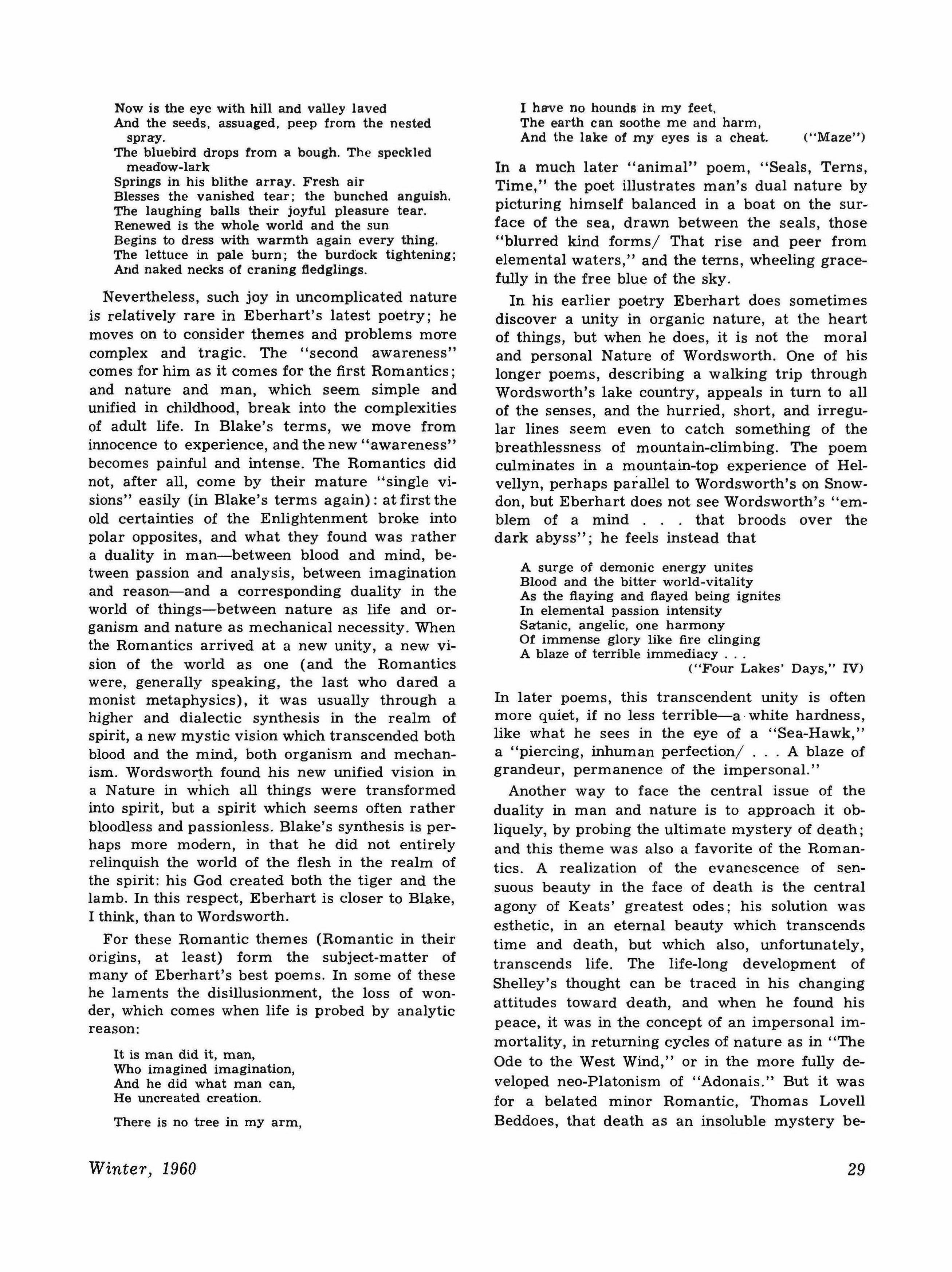
I have no hounds in my feet, The earth can soothe me and harm, And the lake of my eyes is a cheat. ("Maze")
In a much later "animal" poem, "Seals, Terns, Time," the poet illustrates man's dual nature by picturing himself balanced in a boat on the surface of the sea, drawn between the seals, those "blurred kind forms/ That rise and peer from elemental waters," and the terns, wheeling gracefully in the free blue of the sky.
In his earlier poetry Eberhart does sometimes discover a unity in organic nature, at the heart of things, but when he does, it is not the moral and personal Nature of Wordsworth. One of his longer poems, describing a walking trip through Wordsworth's lake country, appeals in turn to all of the senses, and the hurried, short, and irregular lines seem even to catch something of the breathlessness of mountain-climbing. The poem culminates in a mountain-top experience of Helvellyn, perhaps parallel to Wordsworth's on Snowdon, but Eberhart does not see Wordsworth's "emblem of a mind that broods over the dark abyss"; he feels instead that
A surge of demonic energy unites
Blood and the bitter world-vitality
As the flaying and flayed being ignites
In elemental passion intensity
Satanic, angelic, one harmony
Of immense glory like fire clinging
A blaze of terrible immediacy ("Four Lakes' Days," IV)
In later poems, this transcendent unity is often more quiet, if no less terrible-a· white hardness, like what he sees in the eye of a "Sea-Hawk," a "piercing, inhuman perfection/ A blaze of grandeur, permanence of the impersonal."
Another way to face the central issue of the duality in man and nature is to approach it obliquely, by probing the ultimate mystery of death; and this theme was also a favorite of the Romantics. A realization of the evanescence of sensuous beauty in the face of death is the central agony of Keats' greatest odes; his solution was esthetic, in an eternal beauty which transcends time and death, but which also, unfortunately, transcends life. The life-long development of Shelley's thought can be traced in his changing attitudes toward death, and when he found his peace, it was in the concept of an impersonal immortality, in returning cycles of nature as in "The Ode to the West Wind," or in the more fully developed neo-Platonism of "Adonais." But it was for a belated minor Romantic, Thomas Lovell Beddoes, that death as an insoluble mystery be-
29
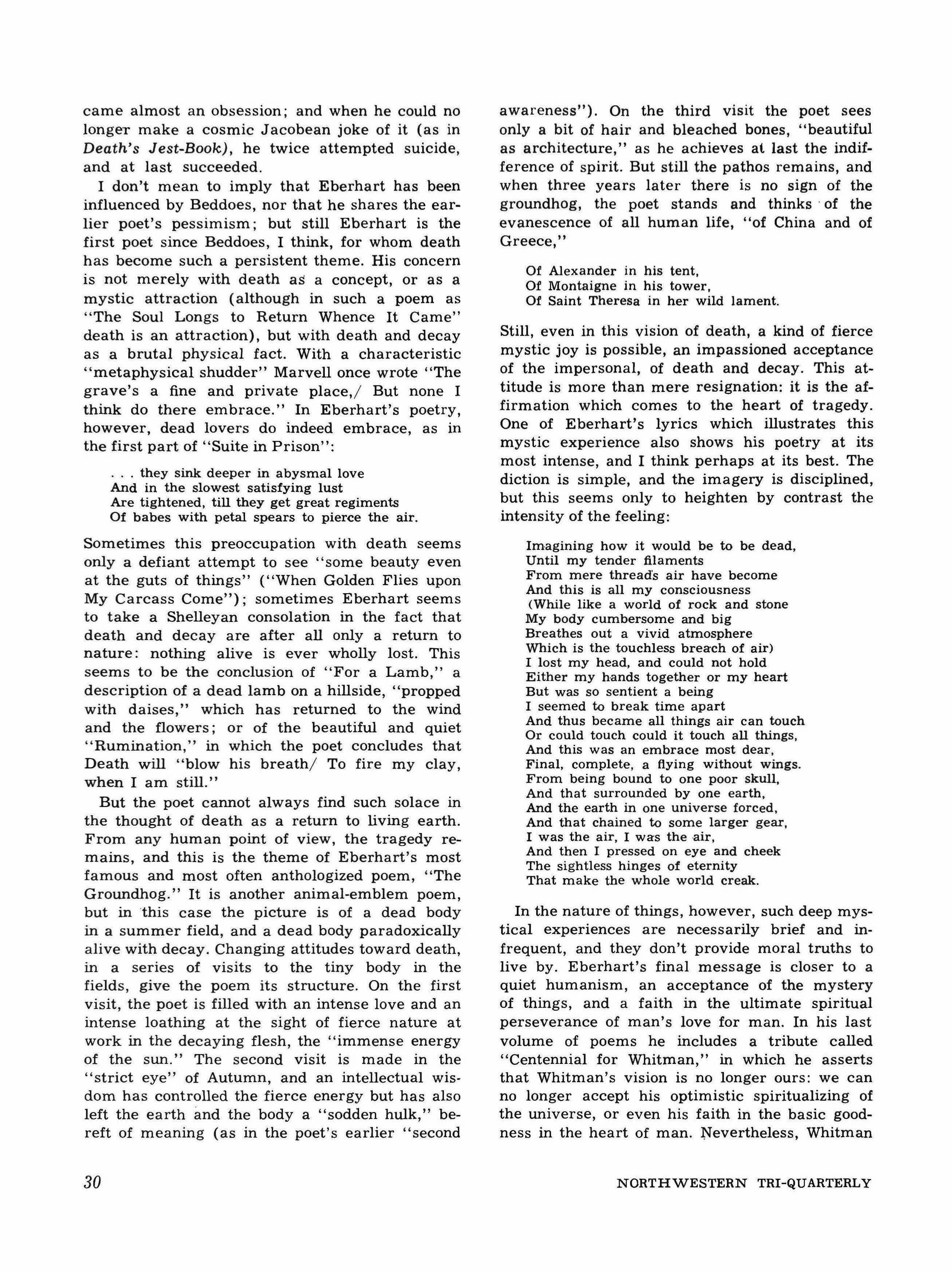
came almost an obsession; and when he could no longer make a cosmic Jacobean joke of it (as in Death's Jest-Book), he twice attempted suicide, and at last succeeded.
I don't mean to imply that Eberhart has been influenced by Beddoes, nor that he shares the earlier poet's pessimism; but still Eberhart is the first poet since Beddoes, I think, for whom death has become such a persistent theme. His concern is not merely with death as a concept, or as a mystic attraction (although in such a poem as "The Soul Longs to Return Whence It Came" death is an attraction), but with death and decay as a brutal physical fact. With a characteristic "metaphysical shudder" Marvell once wrote "The grave's a fine and private place,/ But none I think do there embrace." In Eberhart's poetry, however, dead lovers do indeed embrace, as in the first part of "Suite in Prison":
they sink deeper in abysmal love
And in the slowest satisfying lust Are tightened, till they get great regiments Of babes with petal spears to pierce the air.
Sometimes this preoccupation with death seems only a defiant attempt to see "some beauty even at the guts of things" ("When Golden Flies upon My Carcass Come"); sometimes Eberhart seems to take a Shelleyan consolation in the fact that death and decay are after all only a return to nature: nothing alive is ever wholly lost. This seems to be the conclusion of "For a Lamb," a description of a dead lamb on a hillside, "propped with daises," which has returned to the wind and the flowers; or of the beautiful and quiet "Rumination," in which the poet concludes that Death will "blow his breath/ To fire my clay, when I am still."
But the poet cannot always find such solace in the thought of death as a return to living earth. From any human point of view, the tragedy remains, and this is the theme of Eberhart's most famous and most often anthologized poem, "The Groundhog." It is another animal-emblem poem, but in this case the picture is of a dead body in a summer field, and a dead body paradoxically alive with decay. Changing attitudes toward death, in a series of visits to the tiny body in the fields, give the poem its structure. On the first visit, the poet is filled with an intense love and an intense loathing at the sight of fierce nature at work in the decaying flesh, the "immense energy of the sun." The second visit is made in the "strict eye" of Autumn, and an intellectual wisdom has controlled the fierce energy but has also left the earth and the body a "sodden hulk," bereft of meaning (as in the poet's earlier "second
awareness"). On the third visit the poet sees only a bit of hair and bleached bones, "beautiful as architecture," as he achieves at last the indifference of spirit. But still the pathos remains, and when three years later there is no sign of the groundhog, the poet stands and thinks of the evanescence of all human life, "of China and of Greece,"
Of Alexander in his tent, Of Montaigne in his tower, Of Saint Theresa in her wild lament.
Still, even in this vision of death, a kind of fierce mystic joy is possible, an impassioned acceptance of the impersonal, of death and decay. This attitude is more than mere resignation: it is the affirmation which comes to the heart of tragedy. One of Eberhart's lyrics which illustrates this mystic experience also shows his poetry at its most intense, and I think perhaps at its best. The diction is simple, and the imagery is disciplined, but this seems only to heighten by contrast the intensity of the feeling:
Imagining how it would be to be dead, Until my tender filaments
From mere thread's air have become And this is all my consciousness (While like a world of rock and stone My body cumbersome and big Breathes out a vivid atmosphere Which is the touchless breach of air) I lost my head, and could not hold Either my hands together or my heart But was so sentient a being I seemed to break time apart And thus became all things air can touch Or could touch could it touch all things, And this was an embrace most dear, Final, complete, a flying without wings. From being bound to one poor skull, And that surrounded by one earth, And the earth in one universe forced, And that chained to some larger gear, I was the air, I was the air, And then I pressed on eye and cheek The sightless hinges of eternity That make the whole world creak.
In the nature of things, however, such deep mystical experiences are necessarily brief and infrequent, and they don't provide moral truths to live by. Eberhart's final message is closer to a quiet humanism, an acceptance of the mystery of things, and a faith in the ultimate spiritual perseverance of man's love for man. In his last volume of poems he includes a tribute called "Centennial for Whitman," in which he asserts that Whitman's vision is no longer ours: we can no longer accept his optimistic spiritualizing of the universe, or even his faith in the basic goodness in the heart of man. Nevertheless, Whitman
30
NORTHWESTERN TRI-QUARTERLY
has still a meaning, even in our less sanguine twentieth century; "the force you spoke with, the heart's holy rapture,"
Your knowledge of the changeless in birth and death,
The merit of man in his eternal suffering, Your love of the stars, of valour, and of doom.
There could be a danger in so much emphasis on Eberhart's neo-Romanticism, I suppose. In the first place, such an emphasis may seem to imply that his verse is derivative in style and idiom, when this is not at all the case. Then, too, although those of his poems which I think are most likely to survive are concerned with personal themes-themes which are Romantic, in the best and broadest sense of the term-he has also upon occasion written on topical subjects, especially in some war poems and in his recent experiments in verse drama.
The subject matter of his poems may be sometimes borrowed from other poets, but Eberhart's verse is nevertheless always his own. His lines are short, his rhymes oblique or infrequent, and his rhythms intentionally irregular, but within these limits he shows a quite extraordinary range. 'Some of his lyrics are fluent, with simple unaffected diction, and in almost regular metric stanzas. The beauty of these poems, I think, as is the case with many of Blake's short stanzas or with Wordsworth's "Lucy" poems, lies in the reader's appreciation of restraint, of the tension between the apparently artless simplicity of the verse and the intensity of the controlled emotion. A few isolated lines which stick in my mind will perhaps illustrate the point; "And music a broken Ilium"; or, "Calm is but the end of a poem"; or, when the poet speaks of himself and of his art as
Locked in this lone discipline Against the world's decay.
At the other extreme of his range, Eberhart writes many poems which, like the lyrics of Gerard Manley Hopkins, are crowded with stressed monosyllables and often almost choked with alliterative consonants, in which the effect seems to be to compress into each line as much poetry as possible. Across his whole range, however, Eberhart seems to be able to stamp each verse with his individuality.
References to current events of our time-political, economic, or social-were comparatively rare in his poetry all through the thirties, but the second World War and his involvement in it did break into his poetry in the forties. He also began to collect war poems by other poets, and in 1948
Winter, 1960
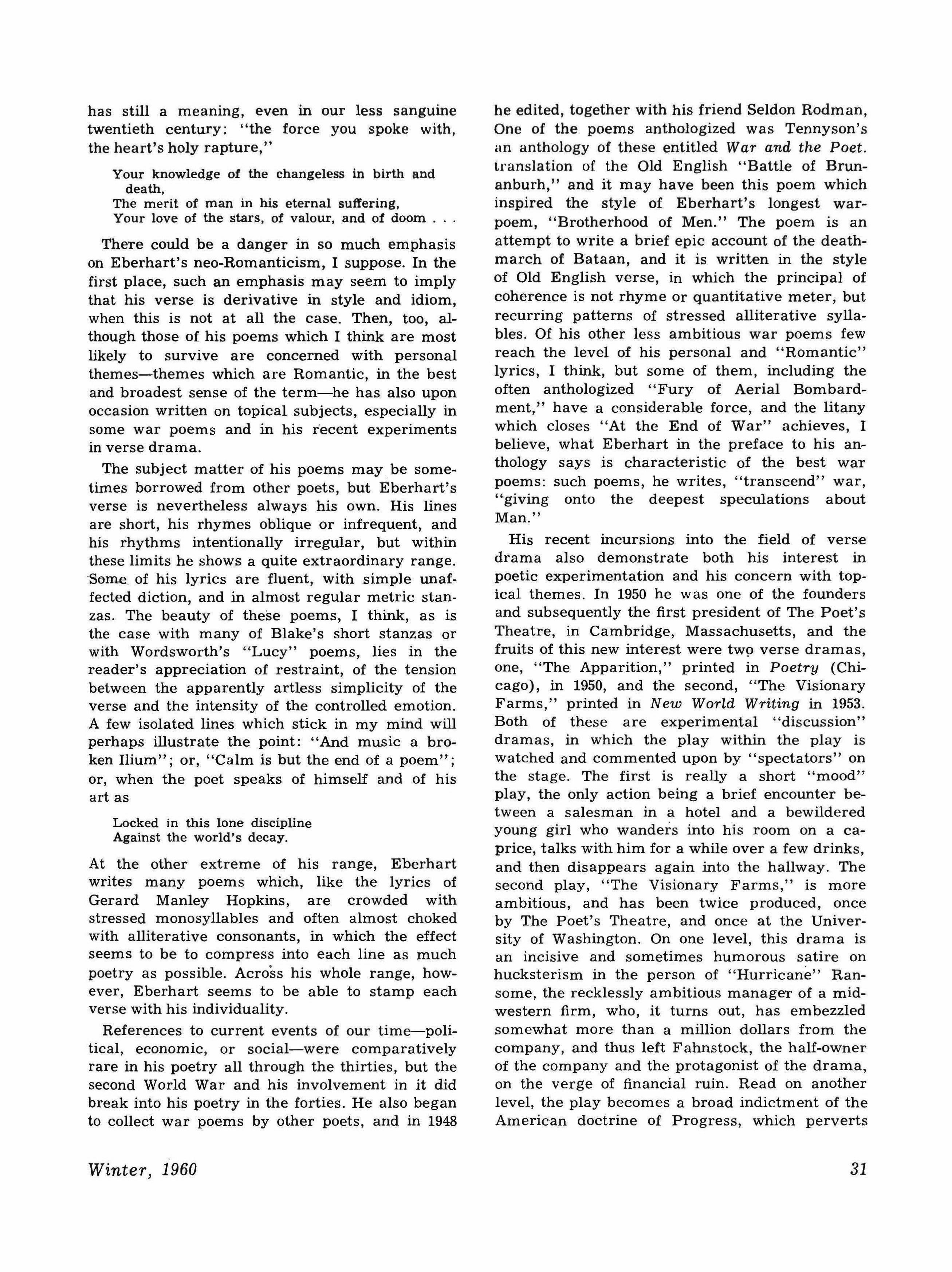
he edited, together with his friend Seldon Rodman, One of the poems anthologized was Tennyson's an anthology of these entitled War and the Poet. translation of the Old English "Battle of Brunanburh," and it may have been this poem which inspired the style of Eberhart's longest warpoem, "Brotherhood of Men." The poem is an attempt to write a brief epic account of the deathmarch of Bataan, and it is written in the style of Old English verse, in which the principal of coherence is not rhyme or quantitative meter, but recurring patterns of stressed alliterative syllables. Of his other less ambitious war poems few reach the level of his personal and "Romantic" lyrics, I think, but some of them, including the often anthologized "Fury of Aerial Bombardment," have a considerable force, and the litany which closes "At the End of War" achieves, I believe, what Eberhart in the preface to his anthology says is characteristic of the best war poems: such poems, he writes, "transcend" war, "giving onto the deepest speculations about Man."
His recent incursions into the field of verse drama also demonstrate both his interest in poetic experimentation and his concern with topical themes. In 1950 he was one of the founders and subsequently the first president of The Poet's Theatre, in Cambridge, Massachusetts, and the fruits of this new interest were tW9 verse dramas, one, "The Apparition," printed in Poetry (Chicago), in 1950, and the second, "The Visionary Farms," printed in New World Writing in 1953. Both of these are experimental "discussion" dramas, in which the play within the play is watched and commented upon by "spectators" on the stage. The first is really a short "mood" play, the only action being a brief encounter between a salesman in a hotel and a bewildered young girl who wanders into his room on a caprice, talks with him for a while over a few drinks, and then disappears again into the hallway. The second play, "The Visionary Farms," is more ambitious, and has been twice produced, once by The Poet's Theatre, and once at the University of Washington. On one level, this drama is an incisive and sometimes humorous satire on hucksterism in the person of "Hurricane" Ransome, the recklessly ambitious manager of a midwestern firm, who, it turns out, has embezzled somewhat more than a million dollars from the company, and thus left Fahnstock, the half-owner of the company and the protagonist of the drama, on the verge of financial ruin. Read on another level, the play becomes a broad indictment of the American doctrine of Progress, which perverts
31
the ideals and the very personalities of all of the characters in the play. The drama is intentionally undramatic; as one of the choric "spectators" puts it, the purpose of the play is rather to "keep vile actions off, and bring on thoughts To estimate these matters to a standstill."
These verse dramas, however, remain interesting experiments, and any summary estimate of Eberhart's achievement so far must stand on the basis of the seven slim volumes of lyric poetry which he has published since 1930. His faults, in my opinion, lie at his extremes. In a very few poems, his verse seems to me not to rise above the prosaic. In a recent long poem entitled "The Kite," for instance (Hudson Review, Summer, 1956), he spends many introductory stanzas versifying instructions for the assembly of his kite "emblem"; and however these lines are read, they seem to me to remain something less than
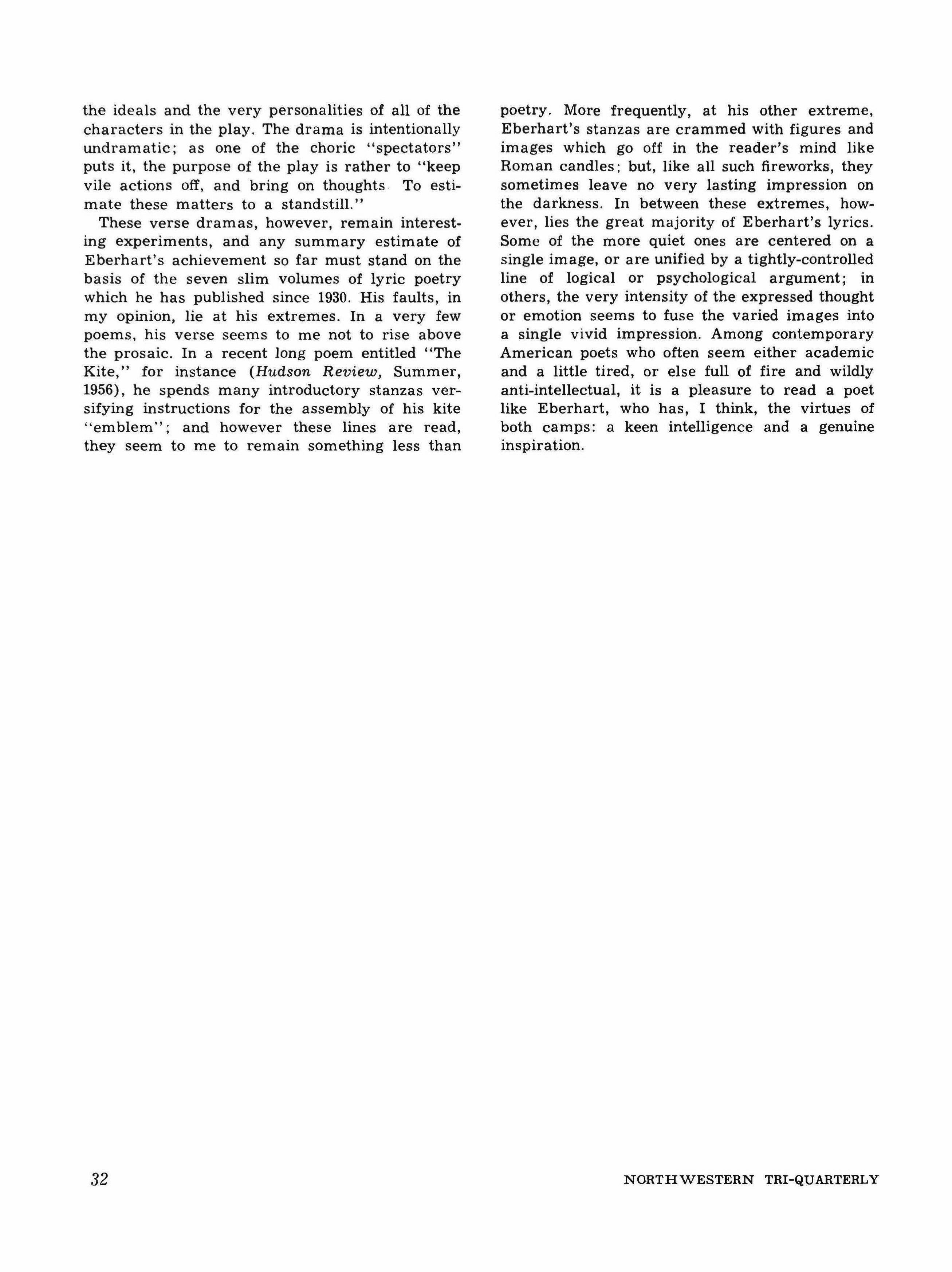
poetry. More frequently, at his other extreme, Eberhart's stanzas are crammed with figures and images which go off in the reader's mind like Roman candles; but, like all such fireworks, they sometimes leave no very lasting impression on the darkness. In between these extremes, however, lies the great majority of Eberhart's lyrics. Some of the more quiet ones are centered on a single image, or are unified by a tightly-controlled line of logical or psychological argument; in others, the very intensity of the expressed thought or emotion seems to fuse the varied images into a single vivid impression. Among contemporary American poets who often seem either academic and a little tired, or else full of fire and wildly anti-intellectual, it is a pleasure to read a poet like Eberhart, who has, I think, the virtues of both camps: a keen intelligence and a genuine inspiration.
32
NORTHWESTERN TRI-QUARTERLY
1 M Barker
J. M. Barker and his wife Barbara Last winter undertook a shooting safari in northern and centraL Tanganyika, where they coLLected a bag of twenty-three different animals and made a fiLm of the Masai steppe and its nomadic inhabitants, the coLorfuL Masai-a tribe of warrior-herdsmen who have conscientiously resisted Europeanization. Mr. Barker, director of Northwestern University Press, has hunted extensiveLy in North America and Mexico. A graduate of Northwestern (L.A. 1949), he served in the AAF, 1942-1945, and was an editor for eight years with J. B. Lippincott Company, book publishers. The line drawings are by Mrs. Barker.
A SMALL PIECE OF THE COUNTRY
STAN
LAWRENCE-BROWN, a Nairobi outfitter, said goodbye to us on the terrace of the Norfolk Hotel. The load carrier, a five-ton Bedford truck, left first and we followed a half-hour later in a green, open-sided Land Rover. We rolled out of Nairobi, went south past the blue Ngong Hills and headed toward Kilimanjaro. This was in January of 1959. I had flown out to East Africa to shoot lion, kudu, buffalo, rhino, leopard and some better-than-average heads of plainsgame. The Masai steppe of Tanganyika is one of the finest areas left if you are in search of a general bag, and that is where we were pointed.
Our first camp was a cluster of faded green tents set up in a grove of mimosa trees halfway up a gradual rise that overlooked the flats of the Masai plain. To the east stretching for a hundred miles to the Pangani River were wide belts of dry-brown savanna and bushy thickets abundant in game and unpeopled except for a few bands of nomadic Masai tribesmen. Westward behind camp were the slow-rising foothills of the Rift escarpment, greener and better watered and wooded with flat-topped acacias. A hundred miles north, sometimes visible, was the white throne of Kilimanjaro.
Three of us spoke English. There was my wife Barbara, myself, and a very polite and tough young hunter named Nick Swan who had a cattle ranch in Kenya's Northern Frontier District and who regarded himself not an Englishman or a "colonial" but a White African. At the age of
Winter, 1960
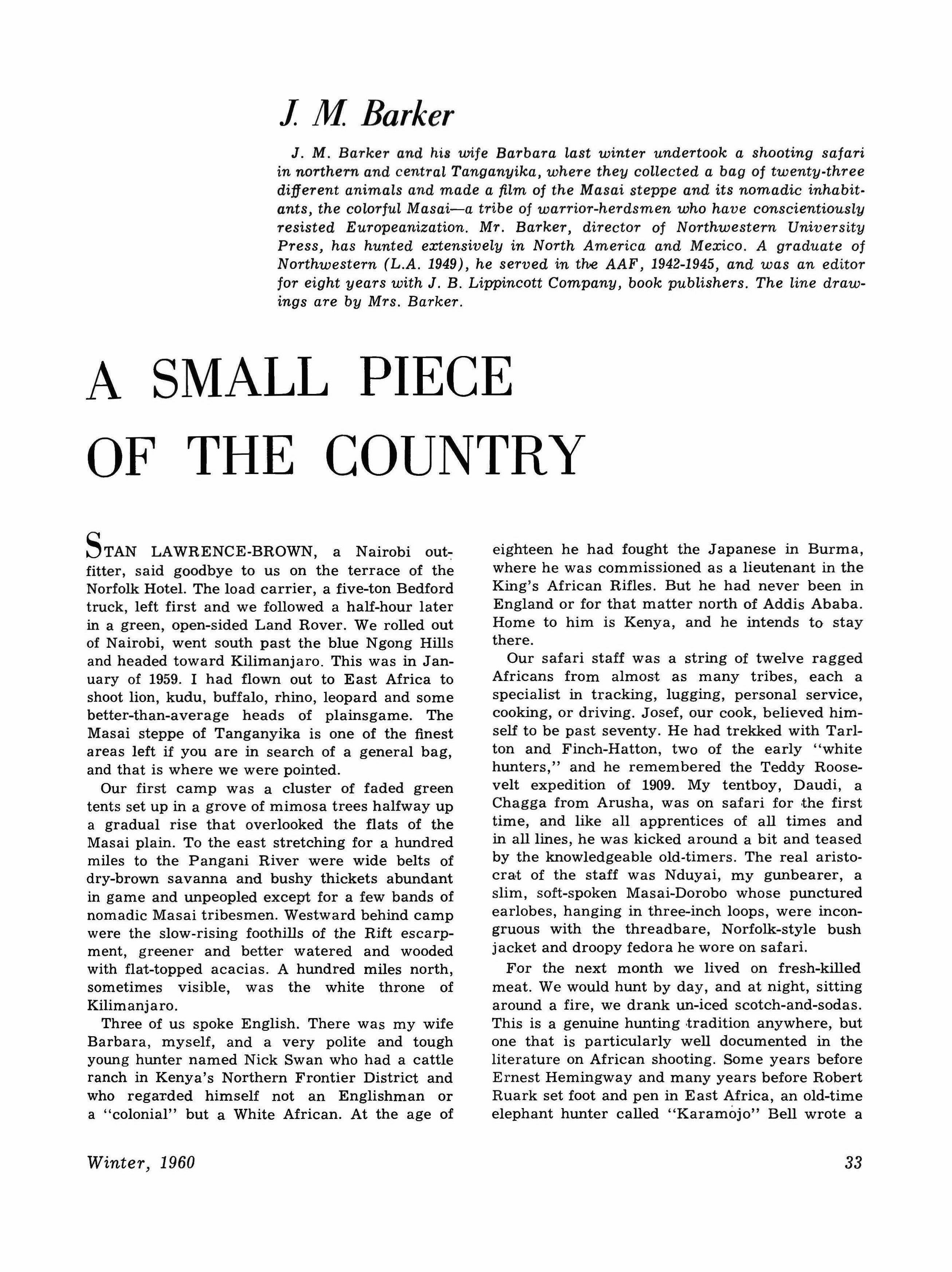
eighteen he had fought the Japanese in Burma, where he was commissioned as a lieutenant in the King's African Rifles. But he had never been in England or for that matter north of Addis Ababa. Home to him is Kenya, and he intends to stay there.
Our safari staff was a string of twelve ragged Africans from almost as many tribes, each a specialist in tracking, lugging, personal service, cooking, or driving. Josef, our cook, believed himself to be past seventy. He had trekked with Tarlton and Finch-Hatton, two of the early "white hunters," and he remembered the Teddy Roosevelt expedition of 1909. My tentboy, Daudi, a Chagga from Arusha, was on safari for the first time, and like all apprentices of all times and in all lines, he was kicked around a bit and teased by the knowledgeable old-timers. The real aristocrat of the staff was Nduyai, my gunbearer, a slim, soft-spoken Masai-Dorobo whose punctured earlobes, hanging in three-inch loops, were incongruous with the threadbare, Norfolk-style bush jacket and droopy fedora he wore on safari.
For the next month we lived on fresh-killed meat. We would hunt by day, and at night, sitting around a fire, we drank un-iced scotch-and-sodas. This is a genuine hunting tradition anywhere, but one that is particularly well documented in the literature on African shooting. Some years before Ernest Hemingway and many years before Robert Ruark set foot and pen in East Africa, an old-time elephant hunter called "Karamojo" Bell wrote a
33
book of remmiscence in which, describing the return to camp after a day of hard tracking, he tells of the "tiny-gleaming campfires in the distance." This is a nice phrase, I think, evoking an image and a mood that gives sense to the vastness and isolation you can experience in the bush. There is still today, despite the encroachment of tourism and photographic "safaris" in Kenya, plenty of country in north and central Tanganyika where a well-equipped shooting party can be completely alone in several thousand square miles of primeval hunting terrain. Here at night after a day of beating the bush it is good to come back to the comfort of a camp where fires are burning as
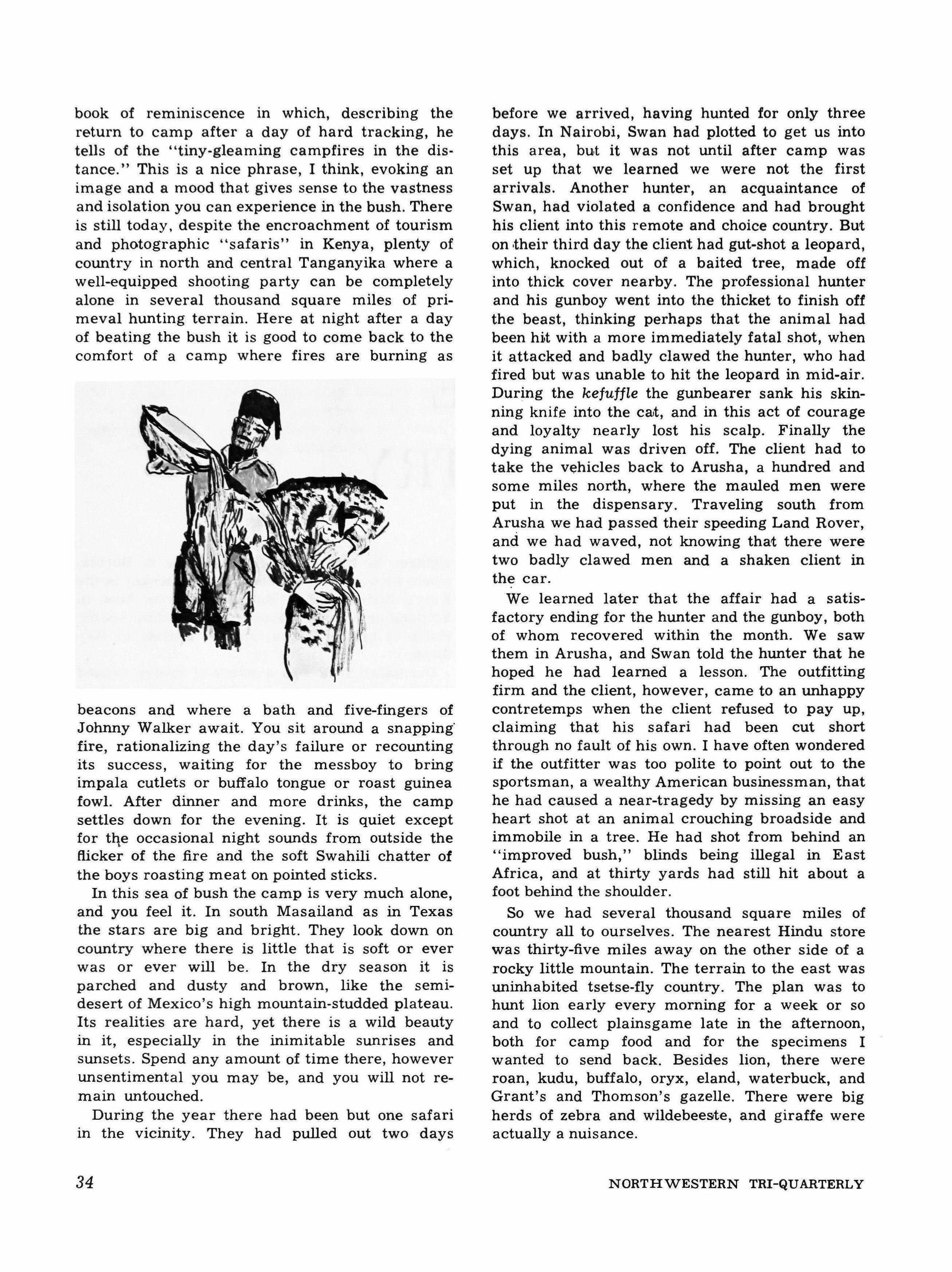
beacons and where a bath and five-fingers of Johnny Walker await. You sit around a snapping' fire, rationalizing the day's failure or recounting its success, waiting for the messboy to bring impala cutlets or buffalo tongue or roast guinea fowl. After dinner and more drinks, the camp settles down for the evening. It is quiet except for the occasional night sounds from outside the flicker of the fire and the soft Swahili chatter of the boys roasting meat on pointed sticks.
In this sea of bush the camp is very much alone, and you feel it. In south Masailand as in Texas the stars are big and bright. They look down on country where there is little that is soft or ever was or ever will be. In the dry season it is parched and dusty and brown, like the semidesert of Mexico's high mountain-studded plateau. Its realities are hard, yet there is a wild beauty in it, especially in the inimitable sunrises and sunsets. Spend any amount of time there, however unsentimental you may be, and you will not remain untouched.
During the year there had been but one safari in the vicinity. They had pulled out two days
before we arrived, having hunted for only three days. In Nairobi, Swan had plotted to get us into this area, but it was not until after camp was set up that we learned we were not the first arrivals. Another hunter, an acquaintance of Swan, had violated a confidence and had brought his client into this remote and choice country. But on their third day the client had gut-shot a leopard, which, knocked out of a baited tree, made off into thick cover nearby. The professional hunter and his gunboy went into the thicket to finish off the beast, thinking perhaps that the animal had been hit with a more immediately fatal shot, when it attacked and badly clawed the hunter, who had fired but was unable to hit the leopard in mid-air. During the kefuffle the gunbearer sank his skinning knife into the C8Jt, and in this act of courage and loyalty nearly lost his scalp. Finally the dying animal was driven off. The client had to take the vehicles back to Arusha, a hundred and some miles north, where the mauled men were put in the dispensary. Traveling south from Arusha we had passed their speeding Land Rover, and we had waved, not knowing that there were two badly clawed men and a shaken client in the car.
We learned later that the affair had a satisfactory ending for the hunter and the gunboy, both of whom recovered within the month. We saw them in Arusha, and Swan told the hunter that he hoped he had learned a lesson. The outfitting firm and the client, however, came to an unhappy contretemps when the client refused to pay up, claiming that his safari had been cut short through no fault of his own. I have often wondered if the outfitter was too polite to point out to the sportsman, a wealthy American businessman, that he had caused a near-tragedy by missing an easy heart shot at an animal crouching broadside and immobile in a tree. He had shot from behind an "improved bush," blinds being illegal in East Africa, and at thirty yards had still hit about a foot behind the shoulder.
So we had several thousand square miles of country all to ourselves. The nearest Hindu store was thirty-five miles away on the other side of a rocky little mountain. The terrain to the east was uninhabited tsetse-fly country. The plan was to hunt lion early every morning for a week or so and to collect plainsgame late in the afternoon, both for camp food and for the specimens I wanted to send back. Besides lion, there were roan, kudu, buffalo, oryx, eland, waterbuck, and Grant's and Thomson's gazelle. There were big herds of zebra and wildebeeste, and giraffe were actually a nuisance.
34
NORTHWESTERN TRI-QUARTERLY
We hunted hard during the first week out, leaving camp before sun-up to check the zebra and kongoni baits that had been strung up three or four miles from camp. Each morning Daudi would enter the tent with a pot of steaming tea and shake the mosquito netting to rouse us. We would dress by the light of a Colman lantern that hissed outside the tent in the midst of a swarm of fluttering moths. Swan would be in the mess tent sitting at the table, head in hand, shivering a little in the pre-dawn with malaria chills that disappeared with the sun. We swilled hot tea from white china mugs while Mohammet and Nduyai loaded up the Land Rover with lunch box, ammo, rifles, binoculars, water bags and spare tires. When all was ready they would come to the mess tent, sleepy-eyed, voicing respectful Swahili greetings, and Swan and I and sometimes Barbara would climb into the front seat. The gunboys sat in the slightly elevated rear of the car. We bumped our way in low gear over the rough ground leading out of camp, driving slightly down hill, winding through high grass and around acacia trees until we reached the flats and then swung eastward toward the faint sunrise. We cruised slowly and quietly, hoping to avoid the spinejolting pig-holes. Before we got to the flats we passed through a patch of low weeds that day by day became more pungent under the crush of wheels. It was an odor like thyme.
We saw plenty of lion spoor that first week, and we saw lionesses and cubs. For some reason, perhaps because of the abundance of kongoni and zebra in the vicinity, we found little evidence of lion near the baits, although we encountered plenty of hyenas skulking under the hanging carcasses. Each passing day reinforced the uneasy feeling that there were no good maned lions in the area. On the fourth day, while hunting for roan in the afternoon, we had come across a lone male, a freak of a cat that would have made an unusual trophy because of his giant size, but which, belonging to a certain Serengeti subspecies, carried no mane whatsoever. Trophy lion is judged by the quality of mane rather than by the size of the animal.
By the seventh day, Barbara had shot a fine head of roan and I had collected a thirty-inch oryx and a good buffalo. Swan and I discussed the prospects of shifting camp to a place where we could probably pick up a kudu and where we might also find lion. The problem was that we were now in some of the best lion country in Tanganyika, where we were almost certain to find a good head sooner or later, but we could not spend the rest of the month hunting for Leo
at the expense of kudu and rhino. We decided to stay on two more days before moving camp to Kijungu, about fifty miles to the south.
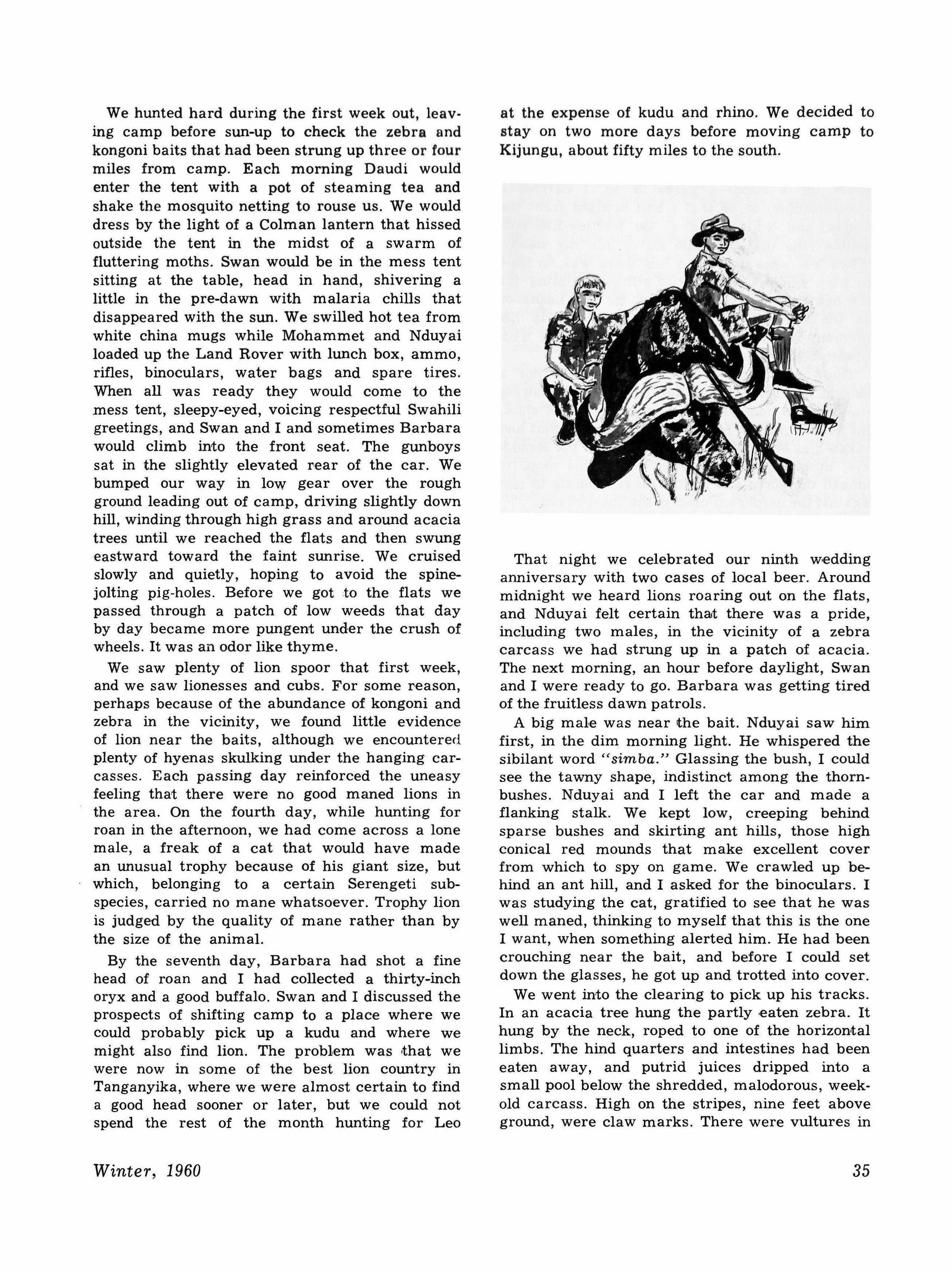
That night we celebrated our ninth wedding anniversary with two cases of local beer. Around midnight we heard lions roaring out on the flats, and Nduyai felt certain that there was a pride, including two males, in the vicinity of a zebra carcass we had strung up in a patch of acacia. The next morning, an hour before daylight, Swan and I were ready to go. Barbara was getting tired of the fruitless dawn patrols.
A big male was near the bait. Nduyai saw him first, in the dim morning light. He whispered the sibilant word "simba." Glassing the bush, I could see the tawny shape, indistinct among the thornbushes. Nduyai and I left the car and made a flanking stalk. We kept low, creeping behind sparse bushes and skirting ant hills, those high conical red mounds that make excellent cover from which to spy on game. We crawled up behind an ant hill, and I asked for the binoculars. I was studying the cat, gratified to see that he was well maned, thinking to myself that this is the one I want, when something alerted him. He had been crouching near the bait, and before I could set down the glasses, he got up and trotted into cover.
We went into the clearing to pick up his tracks. In an acacia tree hung the partly eaten zebra. It hung by the neck, roped to one of the horizontal limbs. The hind quarters and intestines had been eaten away, and putrid juices dripped into a small pool below the shredded, malodorous, weekold carcass. High on the stripes, nine feet above ground, were claw marks. There were vultures in
Winter, 1960
35
the trees and flies buzzing everywhere. The soft earth was covered with great pugrnarks.
Tracking was fairly easy because of the slight dew on the ground, and we were able to follow spoor for a hundred yards or so. I carried a Mauser-action 30/06 that I had brought from the States, and Nduyai had a .450 Westley-Richards double rifle that he could shove into my hands. When we came up on the lion there was no time to pick support, so I fired offhand, aiming for the heart of the facing animal. He had hesitated at the moment of our encounter, and in his moment of indecision the small bullet hit with breath-taking force.
There had been no chance or no need for a second shot. The animal had leaped high, clawing the air, and had fallen in high grass out of sight, his heart ruptured by a ISO-grain softnose that had taken him below the chin and between the shoulders, upsetting, after it had broken the skin, to smash the aorta and rip the lungs, coming to rest against the diaphram deep in the chest cavity.
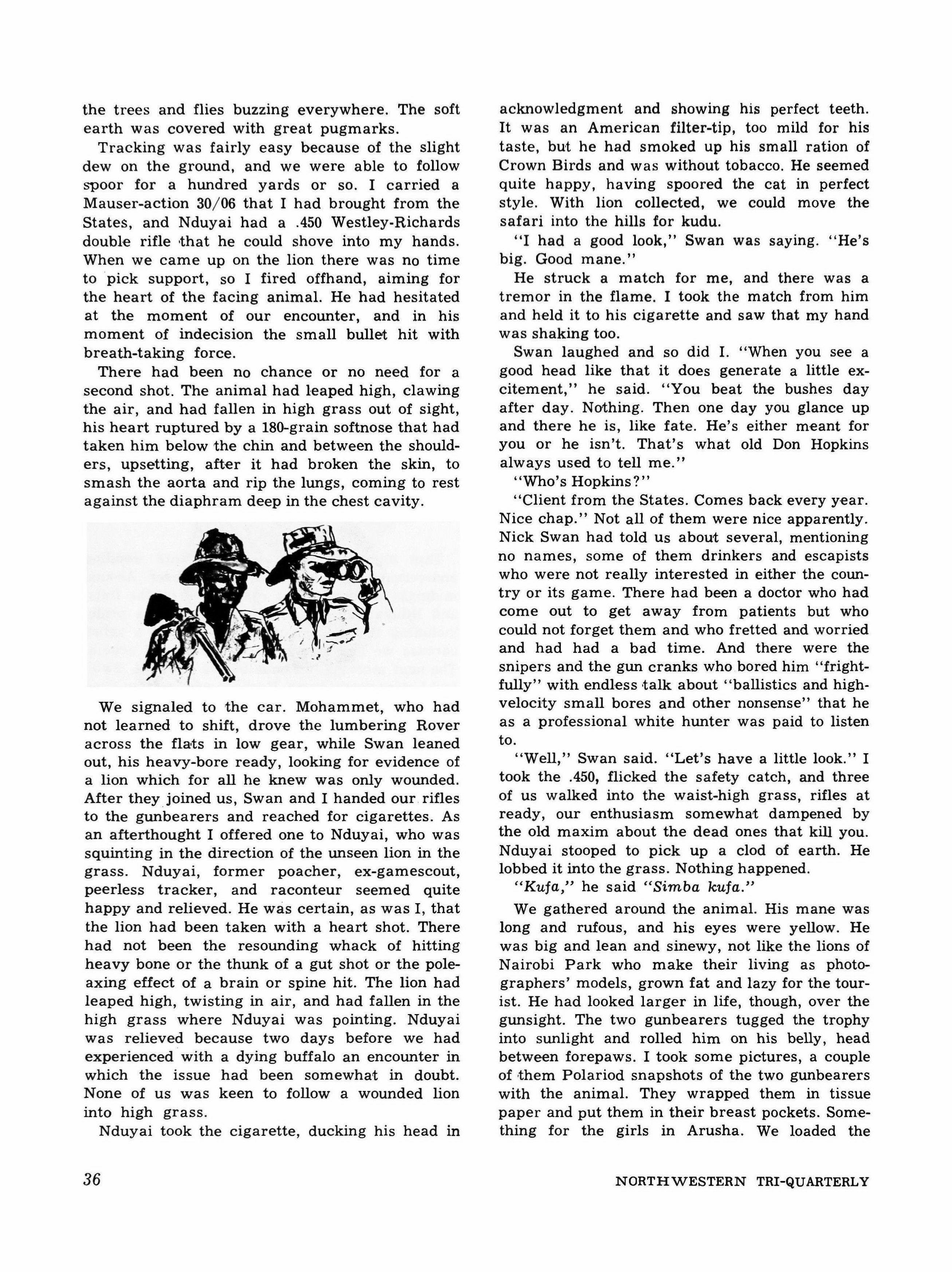
We signaled to the car. Mohammet, who had not learned to shift, drove the lumbering Rover across the flats in low gear, while Swan leaned out, his heavy-bore ready, looking for evidence of a lion which for all he knew was only wounded. After they joined us, Swan and I handed our rifles to the gunbearers and reached for cigarettes. As an afterthought I offered one to Nduyai, who was squinting in the direction of the unseen lion in the grass. Nduyai, former poacher, ex-garnescout, peerless tracker, and raconteur seemed quite happy and relieved. He was certain, as was I, that the lion had been taken with a heart shot. There had not been the resounding whack of hitting heavy bone or the thunk of a gut shot or the poleaxing effect of a brain or spine hit. The lion had leaped high, twisting in air, and had fallen in the high grass where Nduyai was pointing. Nduyai was relieved because two days before we had experienced with a dying buffalo an encounter in which the issue had been somewhat in doubt. None of us was keen to follow a wounded lion into high grass.
Nduyai took the cigarette, ducking his head in
acknowledgment and showing his perfect teeth. It was an American filter-tip, too mild for his taste, but he had smoked up his small ration of Crown Birds and was without tobacco. He seemed quite happy, having spoored the cat in perfect style. With lion collected, we could move the safari into the hills for kudu.
"I had a good look," Swan was saying. "He's big. Good mane."
He struck a match for me, and there was a tremor in the flame. I took the match from him and held it to his cigarette and saw that my hand was shaking too.
Swan laughed and so did 1. "When you see a good head like that it does generate a little excitement," he said. "You beat the bushes day after day. Nothing. Then one day you glance up and there he is, like fate. He's either meant for you or he isn't. That's what old Don Hopkins always used to tell me."
"Who's Hopkins?"
"Client from the States. Comes back every year. Nice chap." Not all of them were nice apparently. Nick Swan had told us about several, mentioning no names, some of them drinkers and escapists who were not really interested in either the country or its game. There had been a doctor who had come out to get away from patients but who could not forget them and who fretted and worried and had had a bad time. And there were the snipers and the gun cranks who bored him "frightfully" with endless ,talk about "ballistics and highvelocity small bores and other nonsense" that he as a professional white hunter was paid to listen to.
"Well," Swan said. "Let's have a little look." I took the .450, flicked the safety catch, and three of us walked into the waist-high grass, rifles at ready, our enthusiasm somewhat dampened by the old maxim about the dead ones that kill you. Nduyai stooped to pick up a clod of earth. He lobbed it into the grass. Nothing happened.
"Kufa," he said "Simba kufa."
We gathered around the animaL His mane was long and rufous, and his eyes were yellow. He was big and lean and sinewy, not like the lions of Nairobi Park who make their living as photographers' models, grown fat and lazy for the tourist. He had looked larger in life, though, over the gunsight. The two gunbearers tugged the trophy into sunlight and rolled him on his belly, head between forepaws. I took some pictures, a couple of them Polariod snapshots of the two gunbearers with the animaL They wrapped them in tissue paper and put them in their breast pockets. Something for the girls in Arusha. We loaded the
36
TRI-QUARTERLY
NORTHWESTERN
dead weight of lion into the Land Rover and shoved off.
A noisy song-and-dance celebration broke out back in camp. Later, two Masai spearmen came in to see the lion. They watched in sullen interest while Barbara took some movies and stills. After a cigarette and the gift of a Polariod print they became less supercilious, and they went through a pantomime of killing a lion with spears. The lion's mane excited them, and Nduyai, who speaks the Masai dialect, translated into Swahili that they said the mane would make an excellent headdress. None of us laughed at this. Simba, whom the Masai call Ngatuny, is for them something of a symbol, too, as well as killer of their beloved cattle.
The skinner was quite pleased. Before he got to work, while we stood around the lion staring thoughtfully, I was thinking to myself that after the skinning there will be no lion. The cook will boil down the fat and sell it to his countrymen as medicine. Nduyai. wants to take the scrotum as a tobacco pouch. The gunboys will eat the heart. The vultures will get the carcass. The skinner will keep the little lucky-bones.
And I will have the skin and skull dipped in arsenic and sent home. It is not then a lion, but only a lionskin, a rug. But more than a lionskin, it is five weeks and a piece of the country I am in, the safari smell of offal and blood and sun-dried meat and long marches in the sun and firelit dinners at nine o'clock and hyenas whooping at night, the dawn smell of bog-myrtle and thyme crushed by the wheels of the Land Rover and the cannibal looks of Simba, the driver, who keeps the five-ton Bedford truck in repair. It is a small piece of a country that is bigger than life. The animals are bigger and tougher and more plentiful, and people are fewer, and there are places
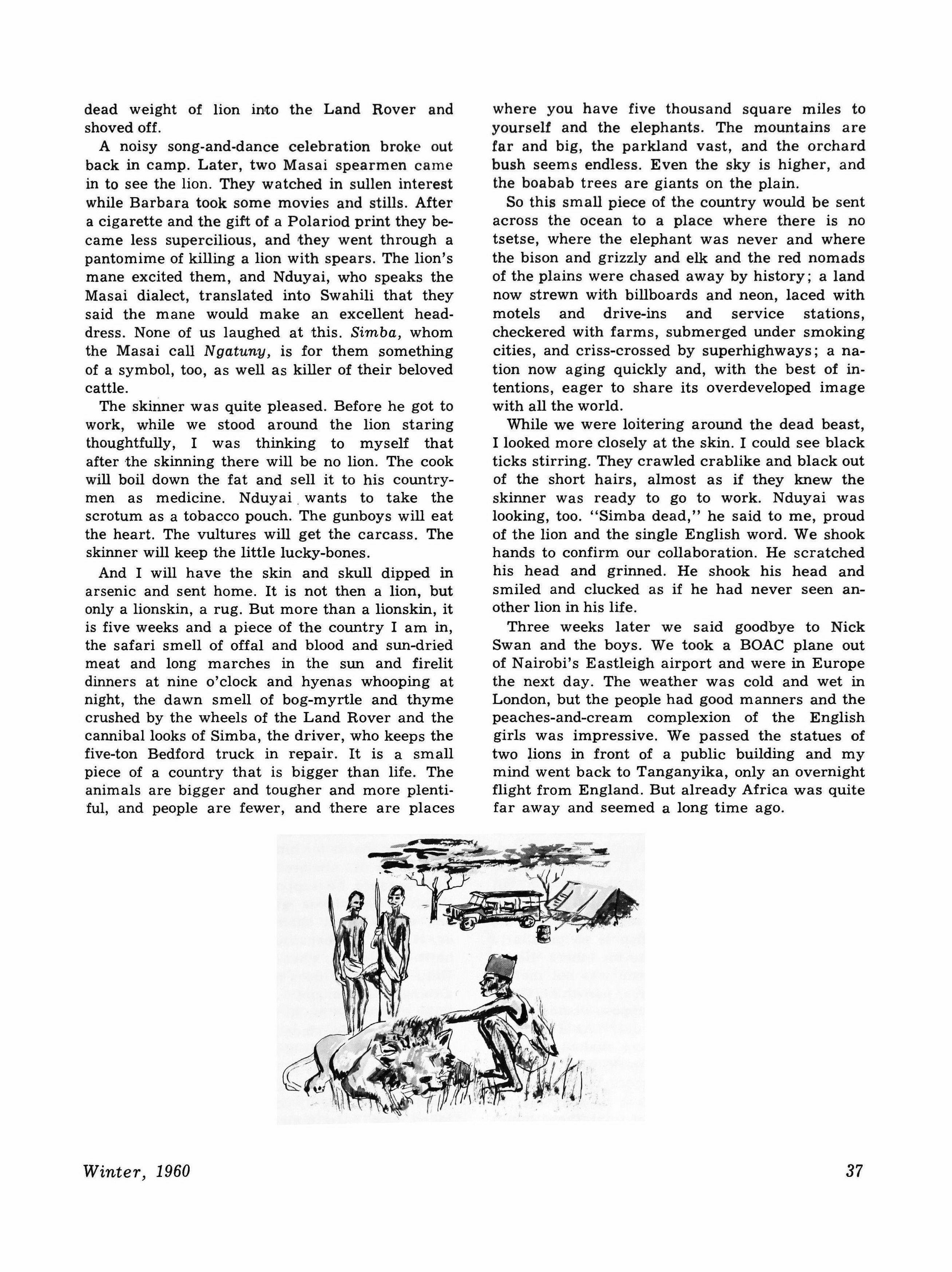
where you have five thousand square miles to yourself and the elephants. The mountains are far and big, the parkland vast, and the orchard bush seems endless. Even the sky is higher, and the boabab trees are giants on the plain.
So this small piece of the country would be sent across the ocean to a place where there is no tsetse, where the elephant was never and where the bison and grizzly and elk and the red nomads of the plains were chased away by history; a land now strewn with billboards and neon, laced with motels and drive-ins and service stations, checkered with farms, submerged under smoking cities, and criss-crossed by superhighways; a nation now aging quickly and, with the best of intentions, eager to share its overdeveloped image with all the world.
While we were loitering around the dead beast, I looked more closely at the skin. I could see black ticks stirring. They crawled crablike and black out of the short hairs, almost as if they knew the skinner was ready to go to work. Nduyai was looking, too. "Simba dead," he said to me, proud of the lion and the single English word. We shook hands to confirm our collaboration. He scratched his head and grinned. He shook his head and smiled and clucked as if he had never seen another lion in his life.
Three weeks later we said goodbye to Nick Swan and the boys. We took a BOAC plane out of Nairobi's Eastleigh airport and were in Europe the next day. The weather was cold and wet in London, but the people had good manners and the peaches-and-cream complexion of the English girls was impressive. We passed the statues of two lions in front of a public building and my mind went back to Tanganyika, only an overnight flight from England. But already Africa was quite far away and seemed a long time ago.
Winter, 1960 37
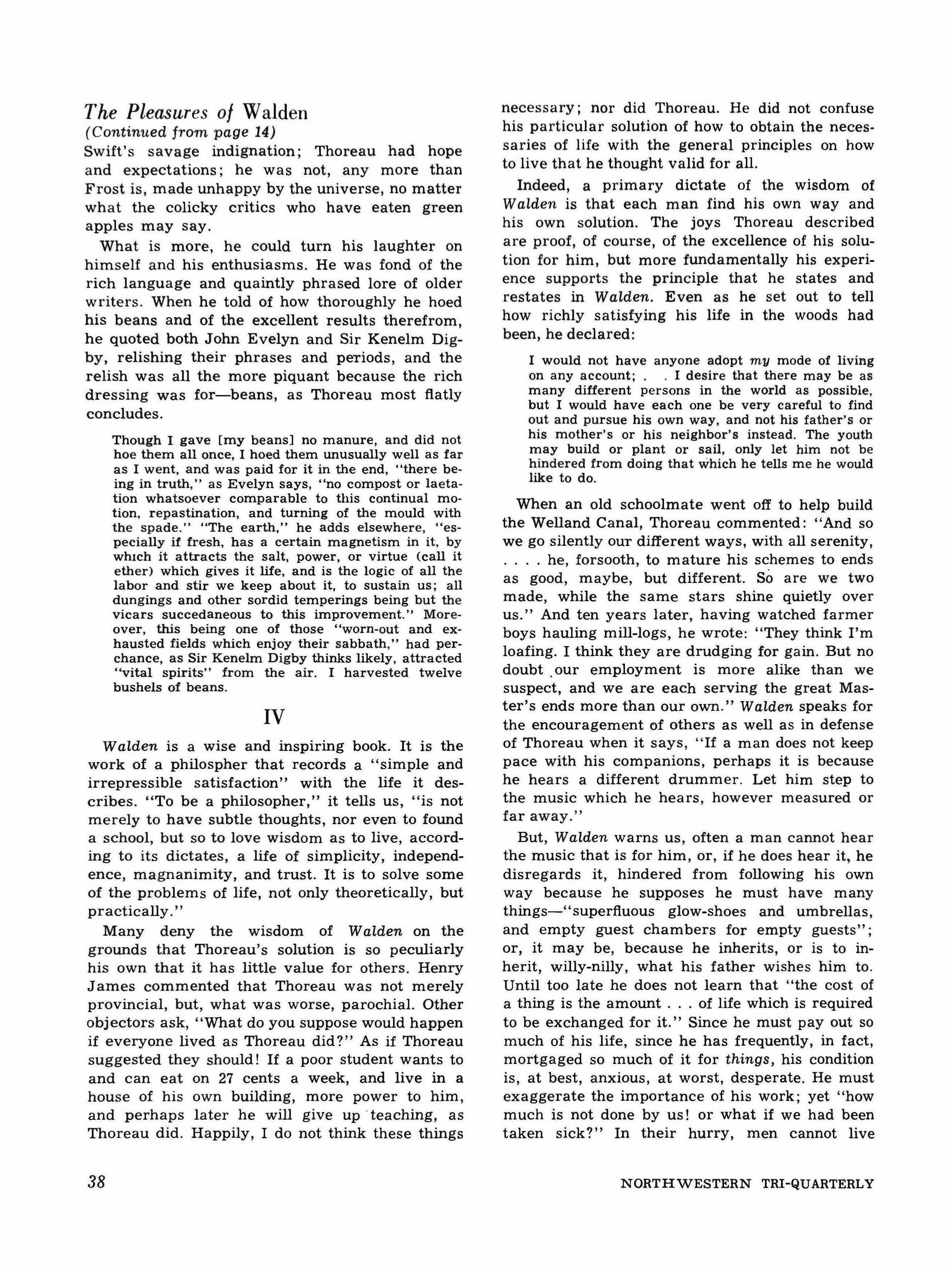
The Pleasures of Walden
(Continued from page 14)
Swift's savage indignation; Thoreau had hope and expectations; he was not, any more than Frost is, made unhappy by the universe, no matter what the colicky critics who have eaten green apples may say.
What is more, he could turn his laughter on himself and his enthusiasms. He was fond of the rich language and quaintly phrased lore of older writers. When he told of how thoroughly he hoed his beans and of the excellent results therefrom, he quoted both John Evelyn and Sir Kenelm Digby, relishing their phrases and periods, and the relish was all the more piquant because the rich dressing was for-beans, as Thoreau most flatly concludes.
Though I gave [my beans] no manure, and did not hoe them all once, I hoed them unusually well as far as I went, and was paid for it in the end, "there being in truth," as Evelyn says, "no compost or laetation whatsoever comparable to this continual motion, repastination, and turning of the mould with the spade." "The earth," he adds elsewhere, "especially if fresh, has a certain magnetism in it, by WhICh it attracts the salt, power, or virtue (call it ether) which gives it life, and is the logic of all the labor and stir we keep about it, to sustain us; all dungings and other sordid temperings being but the vicars succedaneous to this improvement." Moreover, this being one of those "worn-out and exhausted fields which enjoy their sabbath," had perchance, as Sir Kenelm Digby thinks likely, attracted "vital spirits" from the air. I harvested twelve bushels of beans.
IV
Walden is a wise and inspiring book. It is the work of a philospher that records a "simple and irrepressible satisfaction" with the life it describes. "To be a philosopher," it tells us, "is not merely to have subtle thoughts, nor even to found a school, but so to love wisdom as to live, according to its dictates, a life of simplicity, independence, magnanimity, and trust. It is to solve some of the problems of life, not only theoretically, but practically.
Many deny the wisdom of Walden on the grounds that Thoreau's solution is so peculiarly his own that it has little value for others. Henry James commented that Thoreau was not merely provincial, but, what was worse, parochial. Other objectors ask, "What do you suppose would happen if everyone lived as Thoreau did?" As if Thoreau suggested they should! If a poor student wants to and can eat on 27 cents a week, and live in a house of his own building, more power to him, and perhaps later he will give up' teaching, as Thoreau did. Happily, I do not think these things
necessary; nor did Thoreau. He did not confuse his particular solution of how to obtain the necessaries of life with the general principles on how to live that he thought valid for all.
Indeed, a primary dictate of the wisdom of Walden is that each man find his own way and his own solution. The joys Thoreau described are proof, of course, of the excellence of his solution for him, but more fundamentally his experience supports the principle that he states and restates in Walden. Even as he set out to tell how richly satisfying his life in the woods had been, he declared:
I would not have anyone adopt my mode of living on any account;. I desire that there may be as many different persons in the world as possible, but I would have each one be very careful to find out and pursue his own way, and not his father's or his mother's or his neighbor's instead. The youth may build or plant or sail, only let him not be hindered from doing that which he tells me he would like to do.
When an old schoolmate went off to help build the WeIland Canal, Thoreau commented: "And so we go silently our different ways, with all serenity, he, forsooth, to mature his schemes to ends as good, maybe, but different. So are we two made, while the same stars shine quietly over us." And ten years later, having watched farmer boys hauling mill-logs, he wrote: "They think I'm loafing. I think they are drudging for gain. But no doubt our employment is more alike than we suspect, and we are each serving the great Master's ends more than our own." Walden speaks for the encouragement of others as well as in defense of Thoreau when it says, "If a man does not keep pace with his companions, perhaps it is because he hears a different drummer. Let him step to the music which he hears, however measured or far away."
But, Walden warns us, often a man cannot hear the music that is for him, or, if he does hear it, he disregards it, hindered from following his own way because he supposes he must have many things-"superfluous glow-shoes and umbrellas, and empty guest chambers for empty guests"; or, it may be, because he inherits, or is to inherit, willy-nilly, what his father wishes him to. Until too late he does not learn that "the cost of a thing is the amount of life which is required to be exchanged for it." Since he must payout so much of his life, since he has frequently, in fact, mortgaged so much of it for things, his condition is, at best, anxious, at worst, desperate. He must exaggerate the importance of his work; yet "how much is not done by us! or what if we had been taken sick?" In their hurry, men cannot live
38
NORTHWESTERN TRI-QUARTERLY
with deliberation, but are "thrown off the track by every nutshell and mosquito's wing that falls on the rails."
WaLden puts the question, "What shall it profit a man if he gain the world and lose his life?"
A man's own way is a pearl of great price for which he must give what he has. It demands simplicity, independence, magnanimity, and trust. WaLden asserts that it will return them a hundredfold. "The mass of men lead lives of quiet despera-
Darwin and The American Literary Scene
(Cootinued from page 6)
One had only to stand out of the way of the locomotive of history and wave as it went by. Henry George in his book Progress and Poverty warned, as early as 1880, that the theory of natural selection did not at all guarantee the progress of any human society. He pointed out that history was littered with dead and bankrupt civilizations. Lester Ward, a pioneer sociologist, also raised his voice against the naive extension of the theories of Darwin and Spencer. The tide, however, was running against such defeatist criticism; besides, all these proposals for regulation and public welfare planning would cost money.
Not Until the troubles of the late eighties, signalized by the Anarchist riots in Chicago, and the shock of the great depression of 1893, were writers and readers ready for a look at the seamy side of evolution as applied to society. The initial reaction was strikingly American-accentuating the positive. Let us imagine a better society, an American utopia. Of the flood of fictional prescriptions for a brave new world, Edward Bellamy's Looking Backward and William Dean Howell's Traveler from Altruria were probably the most successful. Both writers took evolutionary principles for granted. Each in his way developed the hint that Darwin had himself given in the Descent of Man. In that book Darwin agreed with Wallace that once man acquired mental and moral faculties these would enable him to "maintain an unchanged body in harmony with the changing universe," in short that man could and did alter his environment to achieve physical and moral progress. Moreover, he acknowledged that in the course of his upward evolution man did practice mutual aid and co-operation in many ways and from early evolutionary days had employed the principle of the division of labor.
To Bellamy and Howells and their fellow utopian novelists, socialism was therefore the natural in-
Winter, 1960

tion" is very quotable. But it is not the heart of WaLden, and it is too often quoted alone. It should always be accompanied by the statement of Thoreau's wise faith in life:
"Men esteem truth remote, in the outskirts of the system, behind the farthest star, before Adam and after the last man. But all these times and places and occasions are now and here. God himself culminates in the present moment, and will never be more divine in the lapse of all the ages."
strument for overcoming the economic evils of a capitalistic society. The capitalist could no longer continue to take refuge in analogies drawn from the lower animals, except as a cloak for his own selfish desires. These utopian novels were, however, more of a credit to their authors' humanitarian impulses than to their literary power. They lived and died primarily as propaganda. We should probably make an exception of Mark Twain's Connecticut Yankee, a book whose serious theme is usually overlooked. It was an early version, so to speak, of the grim pessimism of his brilliant fable, The Mysterious Stranger. The Yankee is a thoroughgoing evolutionist. In one of the episodes he reproaches the Queen for having killed her page. The Queen says, "Forsooth, man, I am going to pay for him." The Yankee reflects:
It was no use to waste sense on her. Trainingtraining is everything; training is all there is to a person. We speak of nature; it is folly; there is no such thing as nature; what we call by that misleading name is merely heredity and training All that is original in us, and therefore fairly creditable or discreditable to us, can be covered up and hidden by the point of a cambric needle, all the rest being atoms contributed by. and inherited from, a procession of ancestors that stretches back a billion years to the Adam-clan or grasshopper or monkey from whom our race has been so tediously and ostentatiously and unprofitably developed."
Such touches were not frequent and found few echoes in the American literary scene. E. W. Howe grubbed out a painful and starkly realistic novel of small town life in a Kansas town, depicting the sordid and narrow existences that wore themselves out from dawn to dusk, victims of ignorance and a hostile environment. A few critics saw its power, but it sank almost without a trace. The novel would continue to avoid the
*1 wish to express my indebtedness for some of the citations used in this article to the valuable unpublished Harvard dissertation of John Mills Turner, Jr., "Response of Major American Writers to Darwinism, 1895-1910."
39

lower depths of society so long as America seemed able to escape the common fate of Europe and remain isolated from the troubles and miseries of the rest of the world. Not until the belated industrial revolution had brought in its wake the same train of social evils that had earlier been visited upon the Continent would America be ready for a destructive analysis of society. Then the American writer would turn the tables upon the convenient evolutionary myth of progress of the social Darwinists and turn to Darwin for a counter set of analogies to show the degradations of life in terms of the struggle for existence.
In some such fashion can be explained, I think, the literary lag in exploiting Darwinism to the uses of the new naturalistic realism that was already dominant in France in the novels of Zola, the brothers Goncourt, Maupassant, and the rest.
When we turn from social Darwinism to the impact of the Origin of Species upon American religious thought, the picture is considerably altered. There was no season of easy acceptance as with social Darwinism. Such adjustments as were made came only after prolonged soul-searching. For a few persons, however, Darwin posed practically no difficulties. Neither Emerson nor Walt Whitman seemed to have felt the slightest shock, for it was easy for these transcendentalists to read him in their own inspired and mystical way. What did Darwin do but merely spell out the mechanism by which in the world of appearances man ascended the ladder of Becoming. To the Platonist, Darwin gave but another turn of the screw, since matter was only the garment of spirit. In 1849 Emerson wrote a poem which he prefixed to his Essay on Nature. It might have been adopted by Darwin:
A subtle chain of countless rings
The next unto the farthest brings; The eye reads omens where it goes, And speaks all languages the rose; And, striving to be man, the worm Mounts through all the spires of form.
To Whitman, Emerson's disciple, Darwin's theory simply confirmed his intuitions of the identity and the interpenetration of matter and spirit. As a cosmic evolutionary optimist he wrote in the following vein:
I am an acme of the things accomplished, and I am encloser of things to be.
My feet strike an apex of the apices of stairs
Before I was born out of my mother generations guided me.
My embroyo has never been torpid. For it the nebula cohered to an orb.
All forces have been steadily employed to complete and delight me.
There is the strange paradox in literary history of Emerson reproaching his friend Agassiz for his opposition to Darwin. Agassiz the famous Harvard geologist stubbornly objected to the theory of evolution precisely because its materialist bearings were unacceptable to him. Emerson's mystical view of evolution was, however, to find increasing converts. One of the most popular evolution poems of the turn of the century came to be widely used by liberal clergymen:
A fire-mist and a planet,
A crystal and a cell,
A jelly-fish and a saurian,
And caves where the cavemen dwell;
Then a sense of law and beauty
And a face turned from the clod,
Some call it evolution
And others call it God.
The Emersonian acceptance was followed by many lesser poets, who made a virtue out of necessity and versified the growth of good from evil as part of God's evolutionary plan. In a general way this was ultimately the line of reconciliation that the liberal ministry took in the great controversy that opened in the seventies between science and religion. Thus the great Henry Ward Beecher led his fashionable congregation to accept the new dispensation by pouring the new wine of Darwin into the familiar forms and phrases of his New England theology, everywhere transforming the letter into the spirit and the symbol. For the Unitarian clergy who had long rejected supernaturalism, the doctrine was not only easily assimilated; it strengthened the naturalistic drift of morality and ethics. On the other hand, for countless thousands of persons the coming together of Darwin's naturalistic theory of evolution and the higher criticism of the Bible produced a great falling off in church attendance. Spellbinders like Robert Ingersoll drew immense crowds to lectures on atheism. To them Darwin supplied invaluable ammunition. The "village atheist" of fact and fiction dated from those great days of evangelical atheism.
Though the religion vs science issue was perplexed by a thousand cross currents, depending on how orthodox one was either about Darwinism or about Christianity, a single issue can be isolated as being the chief one raised, the issue of materialism. It is important, of course, to notice that in the great debate the term was used in its philosophical sense, meaning not dollar-chasing and the love of material things (those after all were pardonable sins), but the conception that
40
NORTHWESTERN TRI-QUARTERLY
man, the world, the whole imaginable cosmos consists only of matter, or perhaps more accurately, of matter in motion. In this conception the world of nature is all the world there is; there is no dualistic split between nature and spirit, between this world and the next. To the materialist the world is one. Darwin's theory of a completely naturalistic evolution fitted into the cosmic and social evolution of Spencer, which in tum derived from positivistic thinkers like August Comte. This view of the world as a kind of machine, ruled by cause and effect and determined in every least detail by the operation of scientifically ascertainable physical laws, eliminated not only every idea of a personal God but any God. Agnosticism was the courteous name applied to it; by any commonsense standard it was atheism.
It took a brave, and even a reckless man, to risk that label. Darwin saw fairly early the drift of his researches, for the fact is that he was the first man to be influenced by Darwinism. His own thinking was revolutionized. When the American scientist Asa Gray, with whom Darwin had long corresponded and who clung desperately to his dualistic world of nature and of God, pointed out to him the atheistic dangers, Darwin replied, "I had no intention to write atheistically. But I own, I cannot see as plainly as others do, and as I should wish to do, evidence of design and beneficence on all sides of us. There seems to me too much misery in the world." That of course was for private consumption. Herbert Spencer bowed to the storm by postulating the great Unknowable and thus pacified many critics, but he privately told John Fiske, his great American disciple, that he did so precisely to escape the badge of atheism and materialism. This flight from public reproach was to affect almost every evolutionist, expecially in his old age. The theological odium against materialism was heightened by the link of materialism with Godless socialism, for the Red Spectre filled the newspaper columns of the 70's as it was to do again during the Red Scare of the twenties when the anti-evolutionists of the Bible Leagues were quick to charge that Bolshevism was the offspring of Darwin's evolutionary theories. Even in our own times, it seems to me, part of the current retreat from what the idealistic William James long ago called "vulgar positivism," may, be accounted for as an effort to be completely disassociated from the Godless communism of the Soviet Union.
The American literary man, sensitive, as his art makes him, to the winds of doctrine, reflected during this period the uneasiness and the uncertainty of the rest of society, and in him we see
Winter, 1960
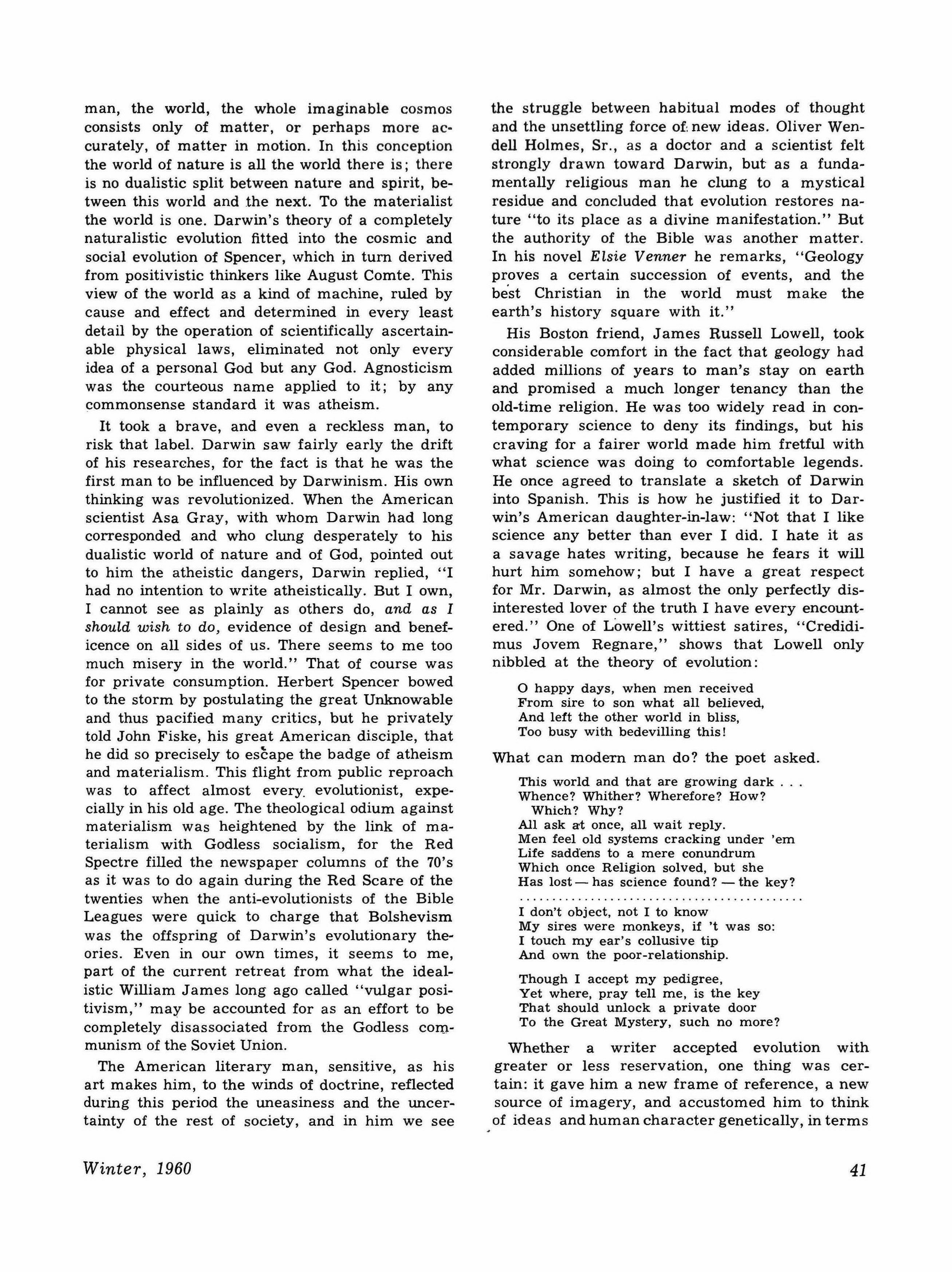
the struggle between habitual modes of thought and the unsettling force of: new ideas. Oliver Wendell Holmes, Sr., as a doctor and a scientist felt strongly drawn toward Darwin, but as a fundamentally religious man he clung to a mystical residue and concluded that evolution restores nature "to its place as a divine manifestation." But the authority of the Bible was another matter. In his novel Elsie Venner he remarks, "Geology proves a certain succession of events, and the best Christian in the world must make the earth's history square with it."
His Boston friend, James Russell Lowell, took considerable comfort in the fact that geology had added millions of years to man's stay on earth and promised a much longer tenancy than the old-time religion. He was too widely read in contemporary science to deny its findings, but his craving for a fairer world made him fretful with what science was doing to comfortable legends. He once agreed to translate a sketch of Darwin into Spanish. This is how he justified it to Darwin's American daughter-in-law: "Not that I like science any better than ever I did. I hate it as a savage hates writing, because he fears it will hurt him somehow; but I have a great respect for Mr. Darwin, as almost the only perfectly disinterested lover of the truth I have every encountered." One of Lowell's wittiest satires, "Credidimus Jovem Regnare," shows that Lowell only nibbled at the theory of evolution:
o happy days, when men received From sire to son what all believed, And left the other world in bliss, Too busy with bedevilling this!
What can modern man do? the poet asked.
This world and that are growing dark Whence? Whither? Wherefore? How? Which? Why?
All ask at once, all wait reply.
Men feel old systems cracking under 'em Life saddens to a mere conundrum Which once Religion solved, but she Has lost- has science found? - the key?
I don't object, not I to know My sires were monkeys, if 't was so: I touch my ear's collusive tip And own the poor-relationship.
Though I accept my pedigree, Yet where, pray tell me, is the key
That should unlock a private door To the Great Mystery, such no more?
Whether a writer accepted evolution with greater or less reservation, one thing was certain: it gave him a new frame of reference, a new source of imagery, and accustomed him to think of ideas and human character genetically, in terms
41
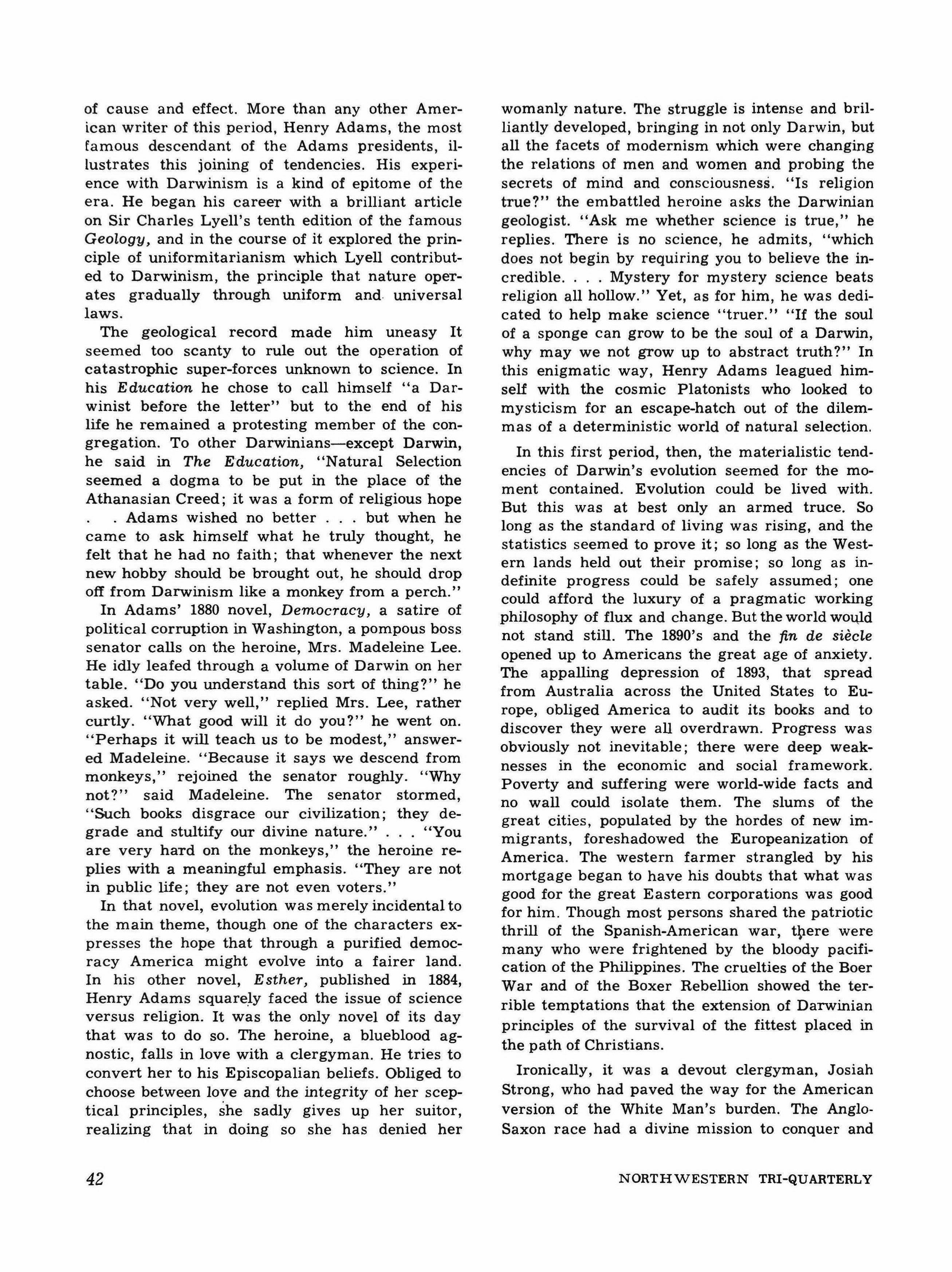
of cause and effect. More than any other American writer of this period, Henry Adams, the most famous descendant of the Adams presidents, illustrates this joining of tendencies. His experience with Darwinism is a kind of epitome of the era. He began his career with a brilliant article on Sir Charles Lyell's tenth edition of the famous Geology, and in the course of it explored the principle of uniformitarianism which Lyell contributed to Darwinism, the principle that nature operates gradually through uniform and universal laws.
The geological record made him uneasy It seemed too scanty to rule out the operation of catastrophic super-forces unknown to science. In his Education he chose to call himself "a Darwinist before the letter" but to the end of his life he remained a protesting member of the congregation. To other Darwinians-except Darwin, he said in The Kducation, "Natural Selection seemed a dogma to be put in the place of the Athanasian Creed; it was a form of religious hope Adams wished no better but when he came to ask himself what he truly thought, he felt that he had no faith; that whenever the next new hobby should be brought out, he should drop off from Darwinism like a monkey from a perch."
In Adams' 1880 novel, Democracy, a satire of political corruption in Washington, a pompous boss senator calls on the heroine, Mrs. Madeleine Lee. He idly leafed through a volume of Darwin on her table. "Do you understand this sort of thing?" he asked. "Not very well," replied Mrs. Lee, rather curtly. "What good will it do you?" he went on. "Perhaps it will teach us to be modest," answered Madeleine. "Because it says we descend from monkeys," rejoined the senator roughly. "Why not?" said Madeleine. The senator stormed, "Such books disgrace our civilization; they degrade and stultify our divine nature." "You are very hard on the monkeys," the heroine replies with a meaningful emphasis. "They are not in public life; they are not even voters."
In that novel, evolution was merely incidental to the main theme, though one of the characters expresses the hope that through a purified democracy America might evolve into a fairer land. In his other novel, Esther, published in 1884, Henry Adams squarely faced the issue of science versus religion. It was the only novel of its day that was to do so. The heroine, a blueblood agnostic, falls in love with a clergyman. He tries to convert her to his Episcopalian beliefs. Obliged to choose between love and the integrity of her sceptical principles, she sadly gives up her suitor, realizing that in doing so she has denied her
womanly nature. The struggle is intense and brilliantly developed, bringing in not only Darwin, but all the facets of modernism which were changing the relations of men and women and probing the secrets of mind and consciousness. "Is religion true?" the embattled heroine asks the Darwinian geologist. "Ask me whether science is true," he replies. There is no science, he admits, "which does not begin by requiring you to believe the incredible. Mystery for mystery science beats religion all hollow." Yet, as for him, he was dedicated to help make science "truer." "If the soul of a sponge can grow to be the soul of a Darwin, why may we not grow up to abstract truth?" In this enigmatic way, Henry Adams leagued himself with the cosmic Platonists who looked to mysticism for an escape-hatch out of the dilemmas of a deterministic world of natural selection.
In this first period, then, the materialistic tendencies of Darwin's evolution seemed for the moment contained. Evolution could be lived with. But this was at best only an armed truce. So long as the standard of living was rising, and the statistics seemed to prove it; so long as the Western lands held out their promise; so long as indefinite progress could be safely assumed; one could afford the luxury of a pragmatic working philosophy of flux and change. But the world would not stand still. The 1890's and the fin de siecte opened up to Americans the great age of anxiety. The appalling depression of 1893, that spread from Australia across the United States to Europe, obliged America to audit its books and to discover they were all overdrawn. Progress was obviously not inevitable; there were deep weaknesses in the economic and social framework. Poverty and suffering were world-wide facts and no wall could isolate them. The slums of the great cities, populated by the hordes of new immigrants, foreshadowed the Europeanization of America. The western farmer strangled by his mortgage began to have his doubts that what was good for the great Eastern corporations was good for him. Though most persons shared the patriotic thrill of the Spanish-American war, there were many who were frightened by the bloody pacification of the Philippines. The cruelties of the Boer War and of the Boxer Rebellion showed the terrible temptations that the extension of Darwinian principles of the survival of the fittest placed in the path of Christians.
Ironically, it was a devout clergyman, Josiah Strong, who had paved the way for the American version of the White Man's burden. The AngloSaxon race had a divine mission to conquer and
NORTHWESTERN TRI-QUARTERLY
42
civilize the world. The United States, having the greatest environmental and racial advantages. would become the seat of all Anglo-Saxondom. Strong cited Darwin's observation in the Descent of Man that thanks to natural selection the United States was indeed ahead of the rest of the world. So, Strong concluded, "Then will the world enter upon a new stage of history-the final competitions of races for which the Anglo-Saxon is being schooled And can anyone doubt that the result of this competition of races will be the 'survival of the fittest?'" Homer Lea took up the Darwinian conception of power politics to alert America to the Yellow Peril, a job that the Hearst papers carried on with great success. Theodore Roosevelt demanded the "strenuous life" for all Americans and advised the superior race to "speak softly and carry a big stick."
This welter of brag, and fear, and economic insecurity brought the new generation of writers to their senses. The "smiling aspects" of American life had been celebrated long enough. The novelist had a higher responsibility to the truth. The tools were at hand in the methods and outlook of the naturalistic school of Zola and his followers. The scientific detachment of Flaubert's Madame Bovary had prepared the way for Zola's "natural and social history" of the fictional RougonMarquart family. He opened up the whole neglected sub-world of poverty, disease, degeneration, and vice on which civilization complacently rested. The literary naturalists primed with the findings of biology, physiology, sociology, and abnormal psychology saw in the principles of scientific objectivity the basis for a renaissance in literature. The motto of their school might well have been taken from Darwin himself: "What a book a devil's advocate might write," he once said, "on the clumsy, wasteful, blundering, low, and horribly cruel works of nature."
There thus began at the turn of the century a drum-fire attack by American writers on the moral contradictions in our society. They now had the provocation to avail themselves of the literary instruments which had been forged for them, the means to get down to the bedrock of the human predicament. Literary naturalism decreed that the writer should set aside the conventional lies of society, the taboos about sex, marriage, religion, organized big business and to do so with the impersonality and exactitude of a surgeon or bio-chemist. If man could be made to see the real consequences of going to the jungle for his moral principles, he might turn to some co-operative effort to alleviate his tragic destiny. Even if there were no remedy, the true artist had to accept the
Winter, 1960
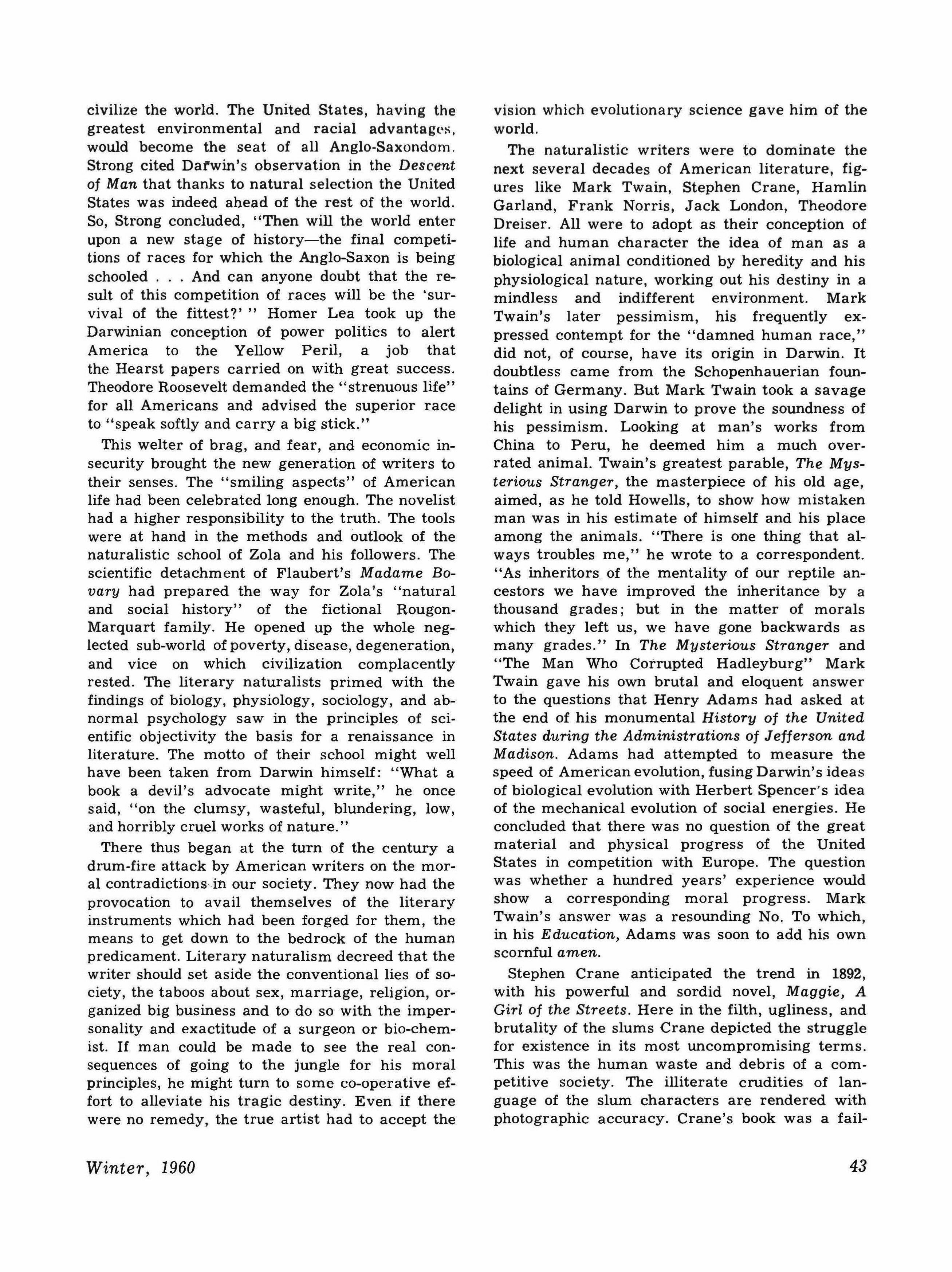
vision which evolutionary science gave him of the world.
The naturalistic writers were to dominate the next several decades of American literature, figures like Mark Twain, Stephen Crane, Hamlin Garland, Frank Norris, Jack London, Theodore Dreiser. All were to adopt as their conception of life and human character the idea of man as a biological animal conditioned by heredity and his physiological nature, working out his destiny in a mindless and indifferent environment. Mark Twain's later pessimism, his frequently expressed contempt for the "damned human race," did not, of course, have its origin in Darwin. It doubtless came from the Schopenhauerian fountains of Germany. But Mark Twain took a savage delight in using Darwin to prove the soundness of his pessimism. Looking at man's works from China to Peru, he deemed him a much overrated animal. Twain's greatest parable, The Mysterious Stranger, the masterpiece of his old age, aimed, as he told Howells, to show how mistaken man was in his estimate of himself and his place among the animals. "There is one thing that always troubles me," he wrote to a correspondent. "As inheritors, of the mentality of our reptile ancestors we have improved the inheritance by a thousand grades; but in the matter of morals which they left us, we have gone backwards as many grades." In The Mysterious Stranger and "The Man Who Corrupted Hadleyburg" Mark Twain gave his own brutal and eloquent answer to the questions that Henry Adams had asked at the end of his monumental History of the United States during the Administrations of Jefferson and MadisQn. Adams had attempted to measure the speed of American evolution, fusing Darwin's ideas of biological evolution with Herbert Spencer's idea of the mechanical evolution of social energies. He concluded that there was no question of the great material and physical progress of the United States in competition with Europe. The question was whether a hundred years' experience would show a corresponding moral progress. Mark Twain's answer was a resounding No. To which, in his Education, Adams was soon to add his own scornful amen.
Stephen Crane anticipated the trend in 1892, with his powerful and sordid novel, Maggie, A Girl of the Streets. Here in the filth, ugliness, and brutality of the slums Crane depicted the struggle for existence in its most uncompromising terms. This was the human waste and debris of a competitive society. The illiterate crudities of language of the slum characters are rendered with photographic accuracy. Crane's book was a fail-
43
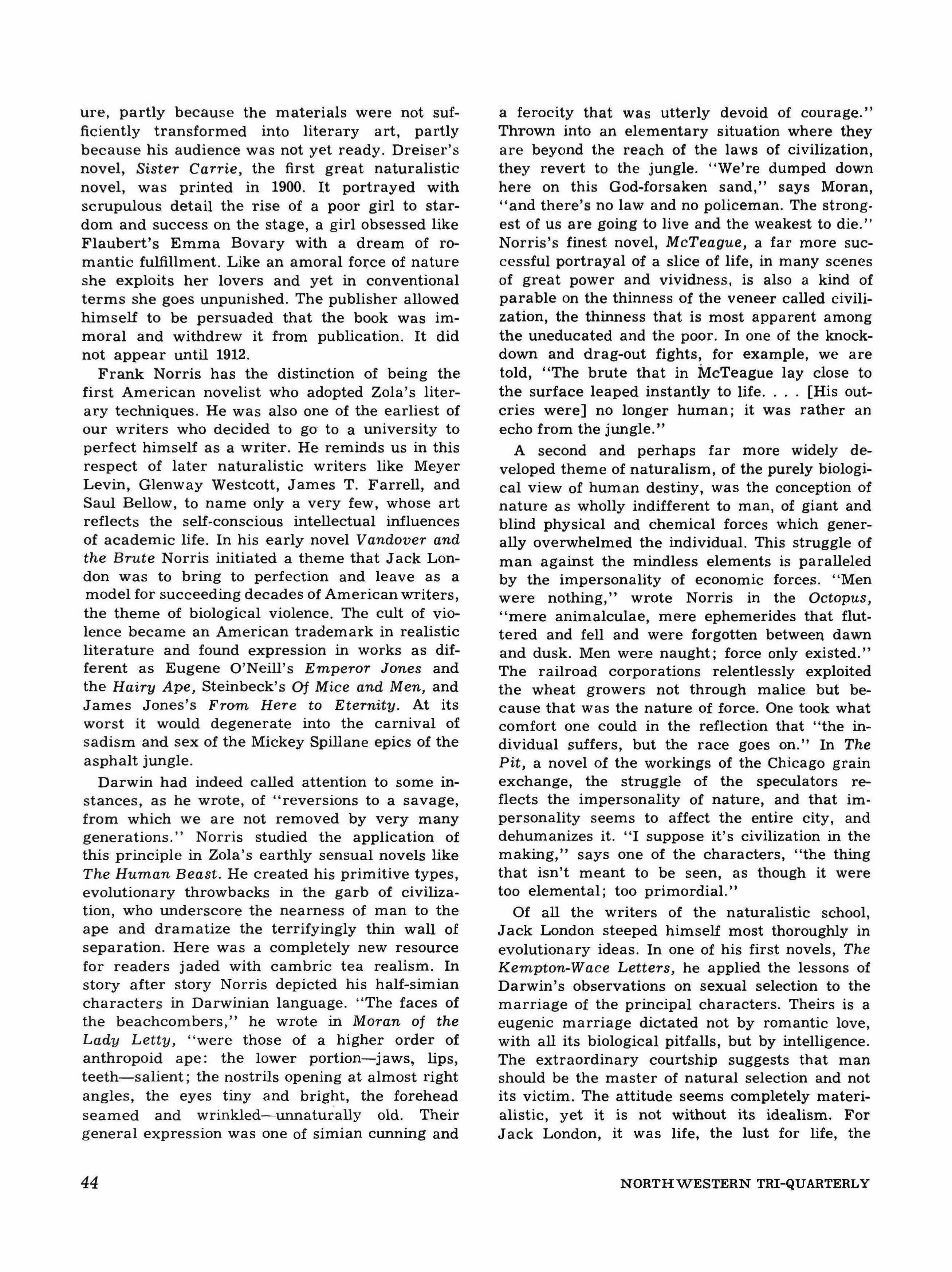
ure, partly because the materials were not sufficiently transformed into literary art, partly because his audience was not yet ready. Dreiser's novel, Sister Carrie, the first great naturalistic novel, was printed in 1900. It portrayed with scrupulous detail the rise of a poor girl to stardom and success on the stage, a girl obsessed like Flaubert's Emma Bovary with a dream of romantic fulfillment. Like an amoral force of nature she exploits her lovers and yet in conventional terms she goes unpunished. The publisher allowed himself to be persuaded that the book was immoral and withdrew it from publication. It did not appear until 1912.
Frank Norris has the distinction of being the first American novelist who adopted Zola's literary techniques. He was also one of the earliest of our writers who decided to go to a university to perfect himself as a writer. He reminds us in this respect of later naturalistic writers like Meyer Levin, Glenway Westcott, James T. Farrell, and Saul Bellow, to name only a very few, whose art reflects the self-conscious intellectual influences of academic life. In his early novel Vandover and the Brute Norris initiated a theme that Jack London was to bring to perfection and leave as a model for succeeding decades of American writers, the theme of biological violence. The cult of violence became an American trademark in realistic literature and found expression in works as different as Eugene O'Neill's Emperor Jones and the Hairy Ape, Steinbeck's Of Mice and Men, and James Jones's From Here to Eternity. At its worst it would degenerate into the carnival of sadism and sex of the Mickey Spillane epics of the asphalt jungle.
Darwin had indeed called attention to some instances, as he wrote, of "reversions to a savage, from which we are not removed by very many generations." Norris studied the application of this principle in Zola's earthly sensual novels like The Human Beast. He created his primitive types, evolutionary throwbacks in the garb of civilization, who underscore the nearness of man to the ape and dramatize the terrifyingly thin wall of separation. Here was a completely new resource for readers jaded with cambric tea realism. In story after story Norris depicted his half-simian characters in Darwinian language. "The faces of the beachcombers," he wrote in Moran of the Lady Letty, "were those of a higher order of anthropoid ape: the lower portion-jaws, lips, teeth-salient; the nostrils opening at almost right angles, the eyes tiny and bright, the forehead seamed and wrinkled-unnaturally old. Their general expression was one of simian cunning and
a ferocity that was utterly devoid of courage." Thrown into an elementary situation where they are beyond the reach of the laws of civilization, they revert to the jungle. "We're dumped down here on this God-forsaken sand," says Moran, "and there's no law and no policeman. The strongest of us are going to live and the weakest to die." Norris's finest novel, McTeague, a far more successful portrayal of a slice of life, in many scenes of great power and vividness, is also a kind of parable on the thinness of the veneer called civilization, the thinness that is most apparent among the uneducated and the poor. In one of the knockdown and drag-out fights, for example, we are told, "The brute that in McTeague lay close to the surface leaped instantly to life [His outcries were] no longer human; it was rather an echo from the jungle."
A second and perhaps far more widely developed theme of naturalism, of the purely biological view of human destiny, was the conception of nature as wholly indifferent to man, of giant and blind physical and chemical forces which generally overwhelmed the individual. This struggle of man against the mindless elements is paralleled by the impersonality of economic forces. "Men were nothing," wrote Norris in the Octopus, "mere animalculae, mere ephemerides that fluttered and fell and were forgotten between dawn and dusk. Men were naught; force only existed." The railroad corporations relentlessly exploited the wheat growers not through malice but because that was the nature of force. One took what comfort one could in the reflection that "the individual suffers, but the race goes on." In The Pit, a novel of the workings of the Chicago grain exchange, the struggle of the speculators reflects the impersonality of nature, and that impersonality seems to affect the entire city, and dehumanizes it. "I suppose it's civilization in the making," says one of the characters, "the thing that isn't meant to be seen, as though it were too elemental; too primordial."
Of all the writers of the naturalistic school, Jack London steeped himself most thoroughly in evolutionary ideas. In one of his first novels, The Kempton-Wace Letters, he applied the lessons of Darwin's observations on sexual selection to the marriage of the principal characters. Theirs is a eugenic marriage dictated not by romantic love, with all its biological pitfalls, but by intelligence. The extraordinary courtship suggests that man should be the master of natural selection and not its victim. The attitude seems completely materialistic, yet it is not without its idealism. For Jack London, it was life, the lust for life, the NORTHWESTERN
44
TRI-QUARTERLY
discovery of its limitless possibilities that ennobled the struggle for existence. He could indeed speak of a character as a "cosmic joke, a sport of chemistry, a garmented beast brother as well to the gorilla and the chimpanzee. [One] who knows monstrous, atavistic promptings composed of shreds of abysmal and forgotten instincts." Yet at the same time his narrator remarks, after watching the beasts of prey come out in the twilight to enact "the piteous tragic play of life feeding on life," "Here is no morality. Only in man is morality, and man created it-a code of living that makes toward living and that is of the lesser order of truth."
Jack London ranged the whole biological gamut, from the primitivism of The Son of the Wolf, through the Nietzschean growth of the blond superman in The Sea Wolf, to the triumph of the death wish in Martin Eden. Like Huxley, London saw the forces of evolution as something to be combatted by man and not tamely and passively endured. He passionately denounced the exploitive tendencies of modern society and turned to socialism for the controls by which the next and higher stage of evolution might be directed. Such explicit use of Darwinian themes was not again to occur in American literature. London's volcanic genius did not encourage imitation. But his writings helped fix these ideas in popular thought and accustomed his generation to shape their view of life in a Darwinian mold.
The stream of literary naturalism that descends from Theodore Dreiser reflects a less elemental conception of the life process, one more complex and more widely ramifying. Dreiser was profoundly conditioned by the climate of Darwin's ideas, but it operates far beneath the complex web of character and incident. The world of Dreiser may be a mechanistic one, deterministic and tragic, but it is not elemental. Man may be an animal, but he is primarily a human animal. It is his humanity, however pitiable, corrupt, and sordid, that concerns Dreiser as a literary artist. I think it can be argued that Dreiser, who had nourished himself on the great novels of Balzac, helped rescue the American novel from a too literal Darwinism. His tragic view of life grew out of his own painful childhood. What Darwin and Spencer confirmed for him was his latent sense of the purposelessness of existence, of the suffering and frustration caused by the conventional moral and social code. Man as a victim of society, of his environment, even of his own incomprehensible nature, aroused his deepest compassion. Consider the remarkable line of novels that stretches from Sister Carrie to An American Tragedy. Every
Winter, 1960
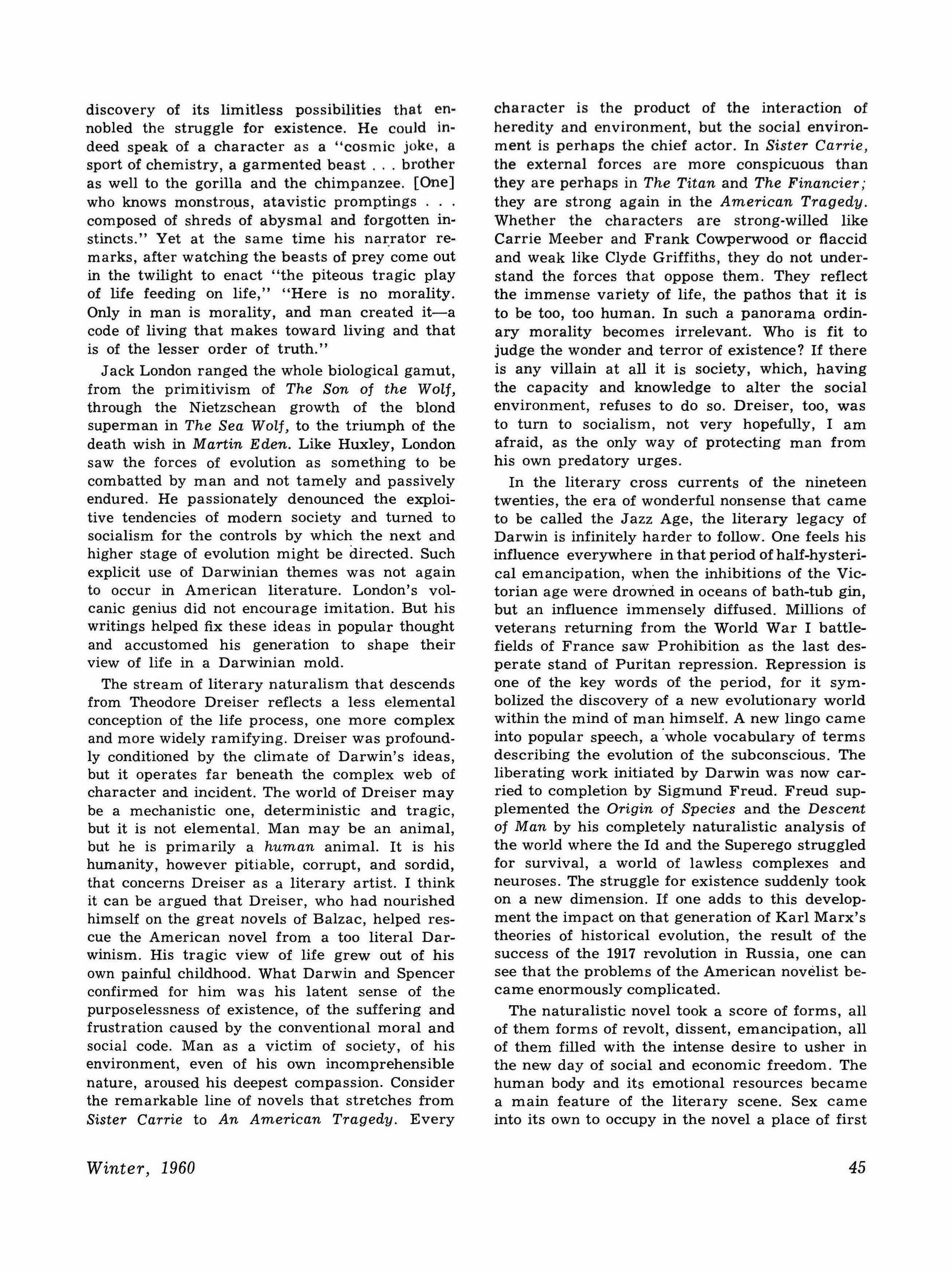
character is the product of the interaction of heredity and environment, but the social environment is perhaps the chief actor. In Sister Carrie, the external forces are more conspicuous than they are perhaps in The Titan and The Financier; they are strong again in the American Tragedy. Whether the characters are strong-willed like Carrie Meeber and Frank Cowperwood or flaccid and weak like Clyde Griffiths, they do not understand the forces that oppose them. They reflect the immense variety of life, the pathos that it is to be too, too human. In such a panorama ordinary morality becomes irrelevant. Who is fit to judge the wonder and terror of existence? If there is any villain at all it is society, which, having the capacity and knowledge to alter the social environment, refuses to do so. Dreiser, too, was to turn to socialism, not very hopefully, I am afraid, as the only way of protecting man from his own predatory urges.
In the literary cross currents of the nineteen twenties, the era of wonderful nonsense that came to be called the Jazz Age, the literary legacy of Darwin is infinitely harder to follow. One feels his influence everywhere in that period of half-hysterical emancipation, when the inhibitions of the Victorian age were drowned in oceans of bath-tub gin, but an influence immensely diffused. Millions of veterans returning from the World War I battlefields of France saw Prohibition as the last desperate stand of Puritan repression. Repression is one of the key words of the period, for it symbolized the discovery of a new evolutionary world within the mind of man himself. A new lingo came into popular speech, a ·whole vocabulary of terms describing the evolution of the subconscious. The liberating work initiated by Darwin was now carried to completion by Sigmund Freud. Freud supplemented the Origin of Species and the Descent of Man by his completely naturalistic analysis of the world where the Id and the Superego struggled for survival, a world of lawless complexes and neuroses. The struggle for existence suddenly took on a new dimension. If one adds to this development the impact on that generation of Karl Marx's theories of historical evolution, the result of the success of the 1917 revolution in Russia, one can see that the problems of the American novelist became enormously complicated.
The naturalistic novel took a score of forms, all of them forms of revolt, dissent, emancipation, all of them filled with the intense desire to usher in the new day of social and economic freedom. The human body and its emotional resources became a main feature of the literary scene. Sex came into its own to occupy in the novel a place of first
45
importance which it retains to this day. False modesty and prudery were the first casualties. Floyd Dell in his novels Moon Calf and the Briary Bush portrayed the anguish of young love in a wholly new guise. Sherwood Anderson tenderly studied the grotesques of Winesburg, Ohio in all their inarticulate strivings and frustrations. Sinclair Lewis put American life under a powerful microscope in novels like Main Street, Babbitt, Arrowsmith, Elmer Gantry. John Dos Passos employed his camera eye technique and the psychobiology of Manhattan Transfer and U.S.A. to make the most vivid and passionate protest of the period. Steinbeck's Grapes of Wrath showed a Darwinian universe of ruthless biology and economics over which the brooding maternity of Ma Joad stood as a symbol of the innate promise of human life. James T. Farrell, building on the work of Dreiser, pushed his artistic researches into the sordid depths of lower middle class life with a conscientiousness that has not been surpassed. Studs Lonigan stands at an immeasurable distance from Darwin's ape and the idea of progress. By a long circuitous route the novelist comes back to the oldest wisdom: man was born to suffer. Hemingway, working in a different direction, exploited biological man with the highest success. In a Farewell to Arms, the hero is caught in a biological trap, for love is at the mercy of nature's heedless processes. In Hemingway's latest story, man still inhabits a Darwinian universe of solitary
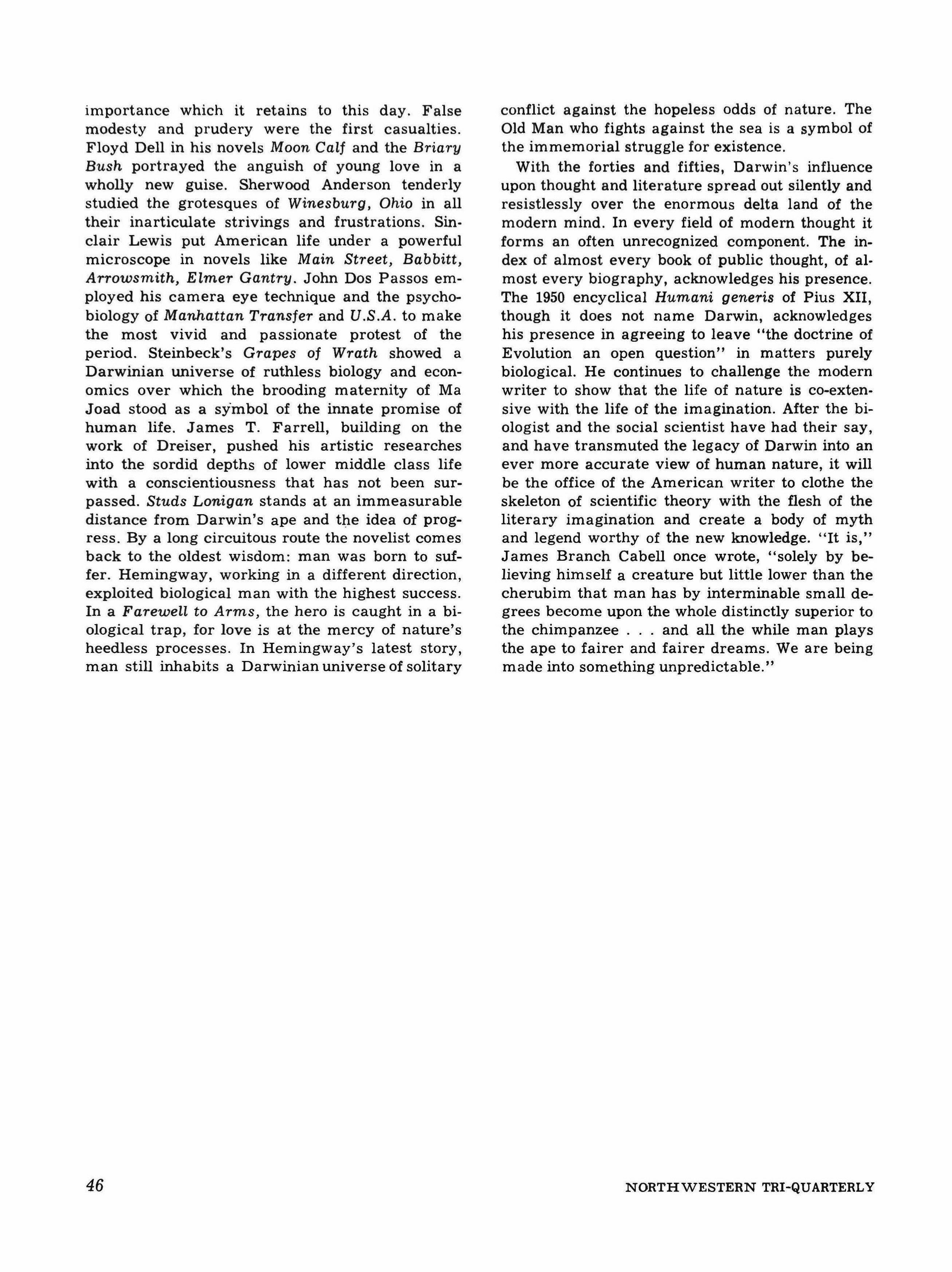
conflict against the hopeless odds of nature. The Old Man who fights against the sea is a symbol of the immemorial struggle for existence.
With the forties and fifties, Darwin's influence upon thought and literature spread out silently and resistlessly over the enormous delta land of the modern mind. In every field of modem thought it forms an often unrecognized component. The index of almost every book of public thought, of almost every biography, acknowledges his presence. The 1950 encyclical Humani generis of Pius XII, though it does not name Darwin, acknowledges his presence in agreeing to leave "the doctrine of Evolution an open question" in matters purely biological. He continues to challenge the modern writer to show that the life of nature is co-extensive with the life of the imagination. After the biologist and the social scientist have had their say, and have transmuted the legacy of Darwin into an ever more accurate view of human nature, it will be the office of the American writer to clothe the skeleton of scientific theory with the flesh of the literary imagination and create a body of myth and legend worthy of the new knowledge. "It is," James Branch Cabell once wrote, "solely by believing himself a creature but little lower than the cherubim that man has by interminable small degrees become upon the whole distinctly superior to the chimpanzee and all the while man plays the ape to fairer and fairer dreams. We are being made into something unpredictable."
46
NORTHWESTERN TRI-QUARTERLY














































